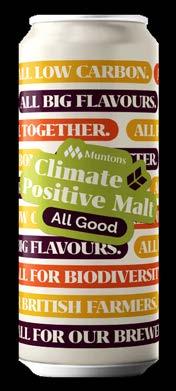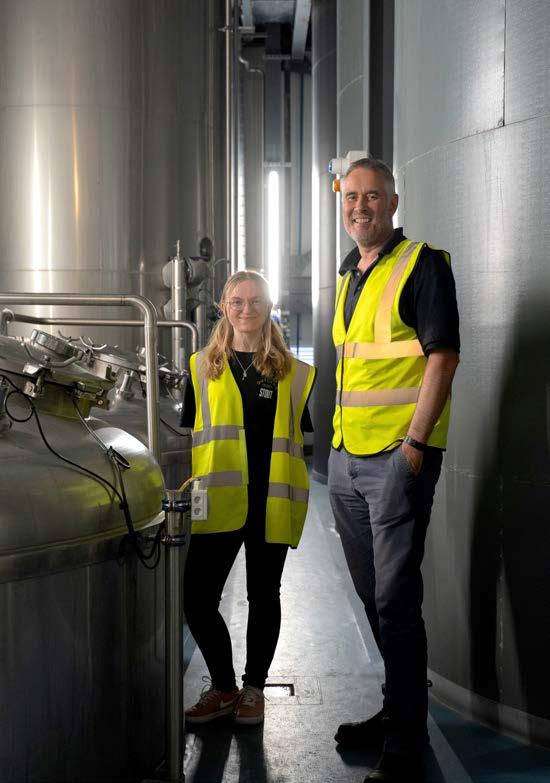


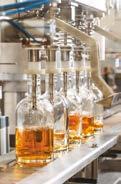
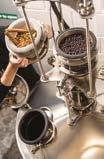
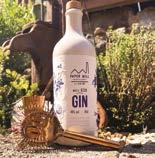
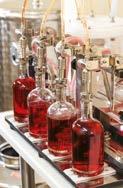


















This year marked 10 years since we started The Brewers Journal. And in the early days of this publication I was living in Tunbridge Wells, Kent. That area and its surrounding environs had a lot of great pubs - it still does. And if you had access to a car (which I didn’t) then further afield you had places like East Sussex and all that had to offer, too.
But my go-to stop, like so many others, was Fuggles Beer Cafe on Grosvenor Road. Its commitment to both cask and keg meant you were guaranteed brilliant beer from local breweries such as Pig & Porter, Gun Brewery and Burning Sky as well as leading producers from elsewhere across the UK and Europe. In short, excellent beer (and cheese) was to be had - always.
What I always enjoyed about this establishment is that its founder, Alex Greig, and his team made the beers they sold, often of the weird and wonderful variety, accessible to all. Many of the bar’s patrons weren’t beer ‘enthusiasts’ but they appreciated the fantastic beers available - even if they didn’t particularly plan on trying a Barleywine that Thursday. This required a level of communication that demonstrated why a certain brewery isn’t one they may have heard of, or why the style might sound confusing initially, but it’s a beer they would probably enjoy.
I recall one St Patrick’s Day where a duo came in expressed their muted shock that Guinness wasn’t available. A minute later they were enjoying pints of Milkshake stout from Bristol’s Wiper and True. I’d have joined them had I not already been imbibing the same brilliant beer.
In addition to the wealth of beers you could get on a daily basis, Alex would
also ensure that Fuggles would help launch and showcase limited releases from producers across the UK and Europe such as the DIPA ‘V’ series from Manchester’s Cloudwater. These were special occasions with small pack stock selling out over the weekend and casks and kegs kicking in a matter of hours.
Speaking in the run-up to the judging for this year’s Brewers Choice Awards, Alex reminisced on how the market has changed over the last decade and also asked if breweries can work more closely with the trade to ensure this part of the industry isn’t lost forever.
“It might not be a very popular thing to say but things have changed. The market has changed in the way we sell beers to the consumer,” he says. “We would previously launch a beer to a huge fanfare but now the customer can order direct from the brewery and have it a week before the bar is able to.”
Greig adds: “Pubs, bars and bottleshops across the UK have done a good job in helping build the brand reputation of many breweries. We are an extension of their sales team. So you must ask if the industry will eat itself if we continue to undermine the frontline?
“I think we need more joined-up thinking between breweries and businesses such as ours. I feel that breweries should be cherishing the smaller spots because without them you are at risk. We need to give people a reason to go out at a time when they’re going out less. This industry needs to elevate each other and we need to support each other.”
Until next time,
Tim Sheahan Editor
Dear John
2025 has been one of loss and of change for John Keeling. And it’s helped him reflect on how work, and life, changes through the years.
Comment | SEIS
Just what is SEIS/EIS and what role do they play when it comes to raising brewery funding?
Comment | LPG
How Liquified Petroleum Gas and its reneweable counterpart offer a practical solution for breweries.
Brewers Intelligence | Autumn
The latest insights and expertise from across the field of ingredients and sales.
Inclusivity in Beer
Why Rachel Auty believes in collaboration and community to help make the world a better place.
Imposter Syndrome
Why imposter syndrome exists and advise from Inclusion In on how to overcome it.
Hops
The modern hop landscape is exciting and evolving. Here are some of the latest innovations and the leading companies on hand to help.
Green Energy
Why solar power is increasingly popular in beer.
Brewhouse Technology
The role modern brewhouse technology has in the production of no and low alcohol beers.
Homebrewing
Alex (Alejandro) Troncoso shares his homebrewing journey. One that would lead him to Bristol, UK.
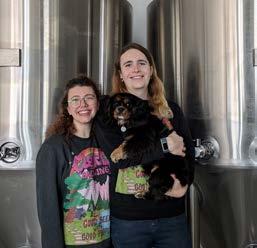

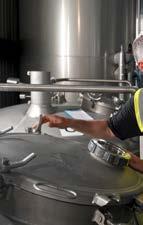
Closet Brewing of Edinburgh
How this Scottish brewery places an emphasis on quality vegan beers, queer community and a localminded, outgoing approach.
Hops | Spain
The history of hops and León in north-west Spain are intertwined. Here’s how brewers can benefit from utilising some of the diverse hop varieties grown in this of Europe.

2025 year’s event Autumn.
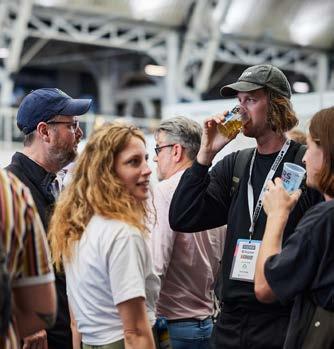
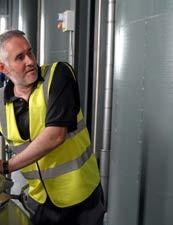
As the guardian of a brewing institution, Toby Heasman, the head brewer at Hall & Woodhouse is helping lead the Dorset brewery through its latest chapter as it approaches its 250th anniversary in 2027.
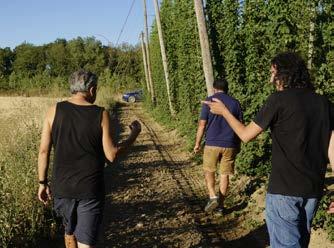
Tim Sheahan Editor tim.sheahan@reby.media
+44 (0)1442 780 592
Tim O’Rourke Technical Editor
John Keeling Contributor
Josh Henderson Head of sales josh.henderson@reby.media +44 (0)1442 780 594
Jon Young Publisher jon.young@reby.media
Reby Media 6 Grove Road, Hemel Hempstead, Herts, HP1 1NG
The Brewers Journal is a published four times a year and mailed every March, June, September & December. Subscriptions can be purchased for four issues. Prices for single issue subscriptions or back issues can be obtained by emailing: subscribe@ reby.media
UK & IRELAND £45 INTERNATIONAL £69
The content of The Brewers Journal is subject to copyright. However, if you would like to obtain copies of an article for marketing purposes high-quality reprints can be supplied to your specification. Please contact the advertising team for full details of this service. The Brewers Journal is printed at Manson Group, St Albans, UK.
All rights reserved. No part of this publication may be reproduced or transmitted in any form or by any means, electronic or mechanical, including photocopying, recording or any information storage or retrieval system, without the express prior written consent of the publisher. The Brewers Journal ISSN 2059-6650 is published bimonthly by Reby Media, 6 Grove Road, Hemel Hempstead, Hertfordshire, HP1 1NG. Subscription records are maintained at Reby Media, 6 Grove Road, Hemel Hempstead, Hertfordshire, HP1 1NG.
The Brewers Journal accepts no responsibility for the accuracy of statements or opinion given within the Journal that is not the expressly designated opinion of the Journal or its publishers. Those opinions expressed in areas other than editorial comment may not be taken as being the opinion of the Journal or its staff, and the aforementioned accept no responsibility or liability for actions that arise therefrom.
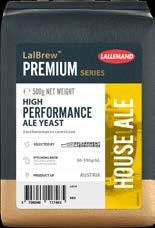
As the sun sets on another summer, the popularity of no-and-low alcohol beers at pubs, bars, beer festivals and beyond showed no sign of abating. Quite the opposite, in fact, demonstrating that it remains a huge growth area for breweries.
The equivalent of 33 million pints of no and low alcohol beers were predicted to have sold in June and July, according to the British Beer and Pub Association.
In 2024, the equivalent of 27 million pints of no and low beer were sold, up from 23 million in the same period in 2023, and 20 million in 2022. This equates to a staggering 35% rise in just two years. This summer it was predicted to be a record, with June and July sales of no and low beer expected to have increased by 20% to that equivalent of 33 million pints.
The BBPA said the boom has been made possible by the sector adapting to trends and producing more no and low options than ever before, which also helps widely-reported public health goals.
Despite this, the BBPA also said that the current UK definition of low alcoholic beer is severely limited by the UK’s restrictive definition. Currently, an ‘alcohol free’ beer must be below 0.05% ABV, which limits what British brewers can
make. This is in contrast to many other countries, who define alcohol free as a marginally higher 0.5% ABV.
They said that if the government matches the thresholds, UK brewers will be able to invest in more no and low beers, which will give consumers extra options if they wish to moderate and boost economic growth.
Emma McClarkin, CEO of the British Beer and Pub Association, explained: “No and Low popularity is booming, and brewers and pubs have responded to this by creating and serving up great new options which help people choose moderation, if they wish. Government has heard our calls and taken a progressive approach by consulting on no-alcohol alcohol descriptions. Changing the no alcohol definition to 0.5% will open the door to greater investment, means we are on par with international markets, and more options for people who choose to moderate – everyone wins.”
No and low alcohol beer is the sector’s biggest growth category across the UK, with volume growth of 750% since 2013. While in Germany, the country’s Destatis federal statistics office reported last
month non-alcoholic sales have more than doubled in recent years - up 109% since 2013.
And Diageo Ireland reported that ontrade sales of non-alcoholic Guinness 0.0 across its formats of can, draught and also micro-draught cans across Ireland had rocketed 35% earlier this year, following up from a 47% increase in sales of draught Guinness 0.0 in Ireland during 2024. The company added that such growth was set to continue into next year when Diageo Ireland’s previouslyannounced £25m investment into Guinness 0.0 production capacity comes online, too.
The popularity of brands like Guinness 0.0 were also felt by Stonegate Group, the UK’s biggest pub company. Earlier in the year they revealed an increase in demand for low and no alcohol beers and ciders with sales up by 32% in the first quarter of 2025, compared to the same period the previous year In total 271,000 low and alcohol-free beers and ciders had been sold across Stonegate’s pub and bar estate in the first few months in 2025 alone.
What we are seeing is a fundemental shift in drinking habits, which is here to stay,” David McDowall, Stonegate Group
David McDowall, CEO at Stonegate Group, said: “There has clearly been a growing demand for low and no alcohol options in recent years, but what we are seeing now is the evolution of the trend into a fundamental shift in drinking habits, which is here to stay.
“For some time, we’ve seen our guests going out earlier and demanding more from their experiences and nights out, but the depth of our data shows low and alcohol-free drinks are growing in popularity up and down the country. We recognise that our guests are increasingly looking for low and no alcohol beers that don’t compromise on taste, so its hugely important for us to have a quality range of beers available.”
Martin Dickie, the co-founder of Brewdog, has announced he is leaving the business. In a statement, he said that he was leaving the business and the wider alcohol sector for “personal reasons”.
He explained: “After over two decades in the brewing and distilling arena sadly for personal reasons it’s time for me to leave the industry that I love deeply and hopefully had a positive impact in.
“Leaving BrewDog isn’t easy but I’m ready to spend less time travelling and spend some more time at home with my young family. It has been an honour to have worked with incredible, likeminded, colleagues who live in a world of flavour and experimentation.
“Our hard work and passion is dedicated to bringing our customers a moment of beautiful escapism from the real world. In James Taylor and chief operating officer Lauren Carrol, BrewDog is in very strong hands and I will always remain a massive fan.”
Dickie leaves the company more than a year after his co-founder James Watt stepped down from his own role at BrewDog as CEO.
Watt was initially replaced by former Boots Opticians managing director James Arrow. Less than a year later, James Taylor would take on the position after being promoted from his role as CFO.
Commenting on the announcement, Taylor said: “Martin’s contributions to BrewDog have been immeasurable,” Taylor said. “His creativity, passion and relentless drive have shaped our company over the years and inspired countless others in the industry.
“We would like to thank him for his focus primarily on product quality, NPD, workplace safety and sustainable supplier relationships. Martin will always be part of the BrewDog family and we wish him every success in the future.”
Bristol Beer Factory has invested £1.2 million in a new, environmentally sustainable facility to expand its production capacity with an aim to achieve Net Zero emissions by 2040.
The company secured a seven-figure capital import finance and hire purchase funding package from Lloyds. It has operated in South Bristol for more than 20 years and owns four pubs across the city: BBF Tap Room & Studio, The Barley Mow, Arnolfini Harbourside Café-Bar and Junction.
Having outgrown its previous premises, the company has expanded into a new 12,000 sq ft facility- doubling its original footprint. This significant growth enables increased production capacity, including the launch of a new 4.1% Pilsner lager.
The new brewery features carbon capture and vapour heat recovery technology to boost its carbon efficiency. The carbon captured is recycled and reused to carbonate the beer, reducing emissions while also mitigating the cost of buying the gas in – which can be impacted by price volatilities. The technology will deliver estimated annual savings of £100,000.
With 80% of its volume sold through direct delivery to local venues, the business remains focused on serving Bristol’s hospitality sector – even as it partners with wholesalers nationwide.
Sam Burrows, managing director at Bristol Beer Factory, said: “This expansion is about more than just brewing more beer, we’ve also been able to make improvements across the board, benefitting our people, community and planet. We’re continuing towards our goal of being a leading brand in the city, that’s known for doing right by the community we operate in. This new brewery means we can better respond to a positive trend in customer demand while also increasing our ability to deliver social value-driven projects. We’re excited to see what the future holds.”
Langham Brewery is celebrating its 20th anniversary by handing the reins to the next generation of brewers.
Lesley Foulkes and James Berrow are retiring, transitioning ownership to experienced brewer Charlie Long (ex-Fuller’s and Wimbledon Brewery), who plans to build on the company’s commitment to quality, character, and community, whilst retaining the existing team and main brews.
”I have been a big fan of Langham’s brews and ethos for many years”, said Long. “Serendipity arose when my family and I were looking to relocate to the area, and raise our kids in this glorious countryside location. A chance conversation led to the opportunity to take the reins of the business, so the timing was perfect,” he explained.
“I’m excited for what the future holds for Langham Brewery and the brilliant team we have here.”
Exmoor Brewery has resumed start on the site of the former Cotleigh Brewery in Wiveliscombe
Exmoor Ales ceased brewing at its Golden Hill site in Wiveliscombe in May this year, at the same time starting a collaboration with Hogs Back Brewery which saw its award-winning ales replicated at the Surrey brewer’s site. Hogs Back will continue to brew Exmoor’s main beers for the time being including Exmoor Gold, while the New Exmoor Brewery will focus on NPD and specials.
Hogs Back chairman Rupert Thompson said: “In these very difficult times, one way to survive and, in time, prosper, is to collaborate with fellow like-minded businesses. We were pleased to be in a position to help Exmoor Ales and keep alive this popular local beer brand.”
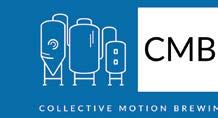



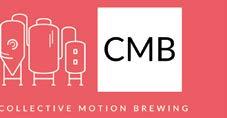

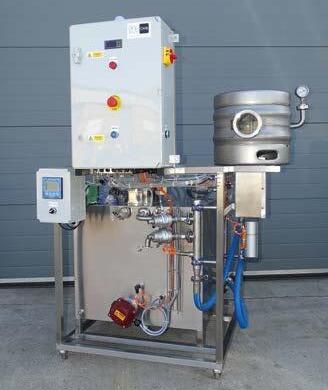






THE YEAR HAS BEEN ONE OF LOSS AND OF CHANGE FOR JOHN KEELING. AND IT HAS CALLED HIM TO REFLECT ON HOW WORK, AND LIFE, CHANGES THROUGH THE YEARS.

In my time as a member of the brewing world I have had numerous discussions with fellow brewers about the ‘Golden Age of Brewing’. It’s important to note that this is distinct from the ‘Golden Age of Drinking’.
I believe there are two drinking golden ages. The first is when when you are young and have no responsibilities and also when you are old and have no responsibilities left. I am currently in the second of these.
Each brewing generation claims to be in
a golden age, or more accurately at the end of the golden age. The number of times a brewer has said to me that we have seen the best of it are too numerous to mention.
Why do they say this? Usually, they are near the end of their career and view the past through rose-tinted glasses. They don’t like the changes that have challenged them at the end of their career. At this moment in time, I am in a reflective mood. This is because in the last few months I have lost two friends from the industry who were great influences on my life.
I first met James Fawcett when I took over malt buying from Reg Drury, my predecessor as head brewer at Fuller’s. This would have been around 1997. James was then the sales director before he would eventually go on to become the chairman of Thomas Fawcett’s & Sons.
James was the type of salesman who loved to chat to the brewer using his malt and didn’t particularly enjoy talking to purchasing managers.
Old fashioned I think is the word. He
always gave me good advice about when to buy malt and he liked a drink with me, too. I probably saved Fuller’s thousands by listening to maltsters. I don’t think he ever gave advice to those purchasing managers. I would see him about three times a year and would try to visit the maltings once a year, usually at harvest. I would also take people from Fuller’s to see him, mainly the sales team, marketeers or accountants because I felt it was important for them to understand the business and not just their part in it.
James was a great host. He delighted in showing us around the maltings. Fawcett’s are a great place to visit because they have floor malting, street malting and combined kilning and germination vessels.
Ken Don, the former head brewer, of Young’s really taught me to put back into the industry as well as take out. I followed in his footsteps on the Heriot-Watt committee then the advisory board. We both looked forward to the Heriot-Watt
former brewers’ weekend in Edinburgh. Ken famously drank 50 pints at one of these events.
These were great weekends meeting old friends and having a good time. If you have heard any of the stories about these weekends, then I can confirm they are mostly true.
I also joined the guild committee for
London and the Southeast when Ken was chair, and eventually I followed him as chairman too. One of the reasons I remain involved in brewing through the London Brewing Alliance is because of Ken’s influence. Young’s and Fuller’s brewers were great friends. We would visit each other, play darts and bowls and of course have the occasional pint. I miss Young’s and I will certainly miss Ken.
We have certainly lost a golden age, an age when people and not just brewers had time to enjoy themselves. A time when you could take colleagues to visit other breweries, maltings, hop growers and farmers.
Is life too hectic? Sometimes it feels like it. Does anyone have a long lunch anymore? Do people have a pint at lunch anymore?
Well, there you have it. That was my ‘Golden Age’ but don’t worry there will be another one just around the corner. There always has.


















IF YOU’RE SCROLLING LINKEDIN WITH A FOCUS ON THE UK FOOD AND DRINK SCENE YOU’VE LIKELY SEEN FOUNDERS STATING THEY’RE “RAISING SEIS/EIS” BUT WHAT DOES THIS MEAN? DAN FINN, WHO HEADS UP THE BEVERAGES TEAM AT BRABNERS AND ACTS FOR A NUMBER OF BREWERIES AND DRINKS BUSINESSES ON THEIR FUNDING AND OTHER LEGAL REQUIREMENTS, EXPLAINS MORE.
The Seed Enterprise Investment Scheme (SEIS) and Enterprise Investment Scheme (EIS) are government initiatives designed to attract investment in early-stage businesses by offering tax incentives.
These schemes have become popular among craft breweries — Northern Monk, Mash Gang, Signature Brew, and Vaux Brewery to name a few all raising SEIS or EIS funds through direct investor engagement, crowdfunding platforms like SEEDRS and CrowdCube or a combination of the two.
The monies will usually be earmarked for a specific purpose with a view to growth, for instance purchasing brewing equipment to increase production, opening a new site or undertaking a rebrand and it is a key requirement of both schemes that the funds raised are used for a “qualifying business activity” which largely equates to being used as growth or working capital in the business.
SEIS supports fledgling businesses with fewer than 25 employees and £350,000 in assets at the time of investment. Investors can contribute up to £200,000 per tax year, receiving 50% income tax relief — meaning a £200,000 investment would yield £100,000 in income tax relief (of course, provided the investor is paying income tax for that relief to be applied towards). Additionally, investors pay zero capital gains tax (CGT) when selling
shares after three years, a significant saving compared to the standard 24% CGT rate. EIS targets more established ventures, allowing investments of up to £1 million per tax year, with 30% income tax relief and the same CGT exemption on a future sale of the shares after three years. To qualify, businesses must have fewer than 250 employees, be under seven years old, and hold less than £15 million in assets pre-investment.
For investors, the tax breaks are substantial. For founders, these schemes boost investment potential and improve company valuations — meaning they
might ultimately be able to give away less equity.
It is also a requirement under the schemes that the investor’s capital is “at risk” so there are limits on the type of rights that investors can demand as a precursor to putting money in.
Whilst they might require rights to regular financial information or veto rights for certain operational decisions, they can’t specify that they simply get their money returned if things don’t go to plan so will generally be on a fairly even footing to the founders and any pre-existing shareholders.
Investors pay zero capital gains tax (CGT) when selling shares after three years, a significant saving compared to the standard 24% CGT rate,” Daniel Finn, Brabners
A formal process, including an advance assurance application to HMRC, is required to secure SEIS or EIS investment and care should be taken when drafting the investment documents to ensure full compliance with the legislation. Therefore, professional legal advice is strongly recommended for businesses raising capital and likewise, investors expecting to receive the corresponding tax benefits to ensure all requirements are met.
Daniel Finn is a legal director in the Brabners corporate team. He also leads their breweries and beverages team, acting on complex and high value corporate acquisitions and disposals, shareholder agreements, governance arrangements and joint ventures. He also regularly advises on third-party capital investments — concerning venture capital, private equity, SEIS/EIS, angel investment and crowdfunding.

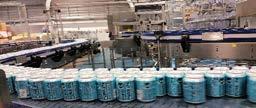
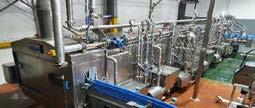
Tel : 01525 718288
E-mail : info@enterprisetondelli.co.uk
Website : www.enterprisetondelli.co.uk
• Want to take control?
• Want short production runs at your convenience?
• Want to reduce product losses at contract packers?
• Want to save transport costs and double handling?
• Want to reduce your carbon footprint?
• Want to control your own hygiene and QA procedures?
• Want improve your packaging?
• Want to save money on labour costs?
• Want to reduce your dissolved oxygen?
You can with an Enterprise Tondelli craft beer Canning, Bottling or Kegging line!
✓ 1,300 cans per hour upwards to 80,000 cph
✓ 1,200 bottles per hour upwards to 60,000 bph
✓ 16 kegs per hour upwards to 1,000 kegs per hour
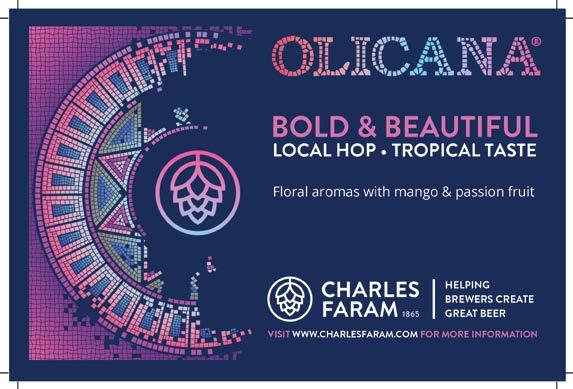
The UK brewing industry is steeped in tradition, but its future is being shaped by sustainability. As breweries seek to reduce their environmental impact, many are investing in renewable technologies and rethinking their fuel choices. This shift is part of a broader transformation across the UK’s industrial landscape. The Government’s 2025 Clean Energy Industries Sector Plan and Modern Industrial Strategy both emphasise the need for scalable, low-carbon technologies to support decarbonisation in manufacturing and food production.
From independent craft producers to global brands, UK breweries are reevaluating their operations to align with environmental goals and consumer expectations. Globally, for example, Heineken – whose UK operations include breweries in Manchester and Tadcasteraims to be carbon neutral in production by 2030, while Carlsberg, operating sites in Wolverhampton and Northampton, is investing in natural carbon capture and renewable energy.
These efforts are setting a new standard, and the rest of the industry is under pressure to keep pace. While solar, wind and biogas are gaining traction, there’s growing recognition of the role transitional and sustainable fuels can play in accelerating decarbonisation – with liquified petroleum gas (LPG) and its renewable counterpart, BioLPG, offering practical solutions that support loweremissions progress.
Brewing is an energy-intensive process. From mashing and boiling to fermentation, cooling and packaging - every stage demands substantial heat and power. Traditionally, many breweries – especially those in rural or off-grid locations – have relied on fossil fuels such as oil or coal. These systems, while once standard, are increasingly incompatible with the sector’s sustainability ambitions and the UK’s net zero targets.
The food and drink sector is among the top five industrial energy consumers in the UK. Within this, breweries contribute significantly – not only due to their energy use, but also because of the emissions associated with thermal processes. While larger breweries may have the capital to invest in solar arrays or green hydrogen pilots, smaller operations often face financial and logistical barriers to adopting such technologies.
Although renewables are gaining traction, they come with limitations including high upfront costs, infrastructure requirements and intermittency. This creates a need for transitional solutions that can deliver immediate impact without requiring a complete overhaul of existing systems. Liquified petroleum gas (LPG) is emerging as a practical solution for breweries navigating the shift toward lower-carbon operations. It offers a reliable, flexible energy source that can be deployed quickly and efficiently, without extensive infrastructure changes.
For breweries seeking to reduce their carbon footprint, while maintaining operational continuity, LPG presents a pragmatic path forward as part of a phased approach to decarbonisation. LPG is already being used in UK breweries to power steam boilers, heat exchangers and even bottling lines. Its portability and scalability make it particularly valuable for rural or off-grid operations, where access to the electricity grid or renewable infrastructure may be limited.
Unlike some renewable systems that require long lead times and planning permissions, LPG systems can be installed and operational in a shorter window.
The fuels performance in highdemand industrial environments is well established. It enables rapid heat-up times, which is particularly valuable in brewing processes that require precise temperature control. Compared to oil or solid fuels, LPG systems can reach target temperatures faster, reducing production time and increasing throughput.
LPG is also compliant with the UK’s Medium Combustion Plant Directive (MCPD), which sets strict limits on emissions of sulphur dioxide, nitrogen oxides and particulates. It not only meets current standards but also provides a margin for future tightening of environmental regulations, offering breweries a reliable way to maintain compliance while progressing towards broader decarbonisation goals.
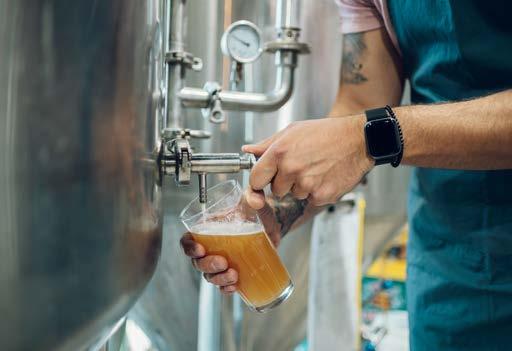
Importantly, LPG does not represent a step away from renewables – it complements them. For breweries that are not yet ready to fully electrify or adopt on-site renewables, LPG offers a practical and immediate emissions reduction strategy that can evolve over time. It supports internal sustainability goals and aligns with broader industry commitments, such as those outlined by the British Beer and Pub Association (BBPA), which has called for a sector-wide shift toward low-carbon technologies.
Hybrid systems that combine LPG with solar thermal or biomass are already being explored in the UK, offering a flexible path to full decarbonisation. This layered approach allows breweries to reduce their environmental impact today while building toward a more sustainable future. Another important consideration in this transition is BioLPG – a renewable alternative to conventional LPG. BioLPG can be used as a direct drop-in replacement, requiring no changes to
existing equipment or infrastructure. It is produced from sustainable feedstocks and can be supplied on different ‘blend’ tariffs. This allows breweries to control the pace and scale of their sustainability journey – starting with as little as 10% and increasing their use of renewable fuel in line with their evolving sustainability goals. This flexibility is particularly valuable for small and medium-sized breweries that may not have the resources to invest in largescale renewable systems but still want to make meaningful progress toward net zero.
By integrating LPG and BioLPG into their energy strategies, breweries can take measurable steps toward decarbonisation without compromising on performance or reliability. As the UK brewing industry continues its journey towards net zero, the focus must remain on solutions that are both effective and achievable. LPG offers a unique combination of environmental benefit, operational reliability and deployment speed. It enables breweries to reduce emissions, improve energy efficiency and
future-proof their operations, without compromising on performance. With the right support, transitional fuels like LPG and BioLPG can help bridge the gap between today’s infrastructure and tomorrow’s ambitions, offering substantial carbon savings without the need for system overhauls. For breweries navigating the complexities of decarbonisation, LPG is proving to be a quiet but powerful ally in the pursuit of a greener pint.
Brewing a Sustainable Future: A Holistic Approach to Eco-Friendly Beer Production - First Key Consulting
www.gov.uk/government/collections/theuks-modern-industrial-strategy-2025
www.weforum.org/stories/2021/06/ sustainable-beer-brewing-climatechange/
www.gov.uk/government/collections/theuks-modern-industrial-strategy-2025


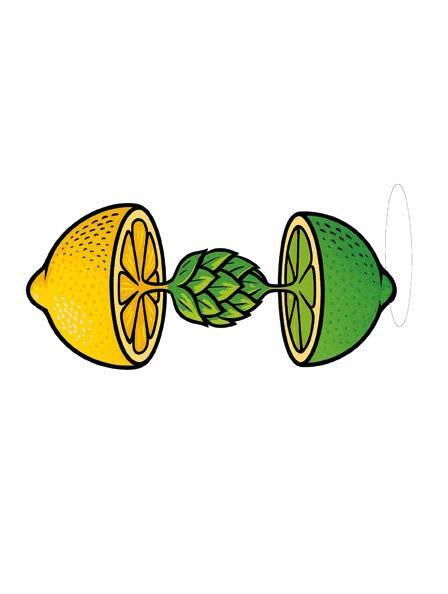

WHETHER IT’S MILK, BARREL-AGED, IMPERIAL, NITRO OR PASTRY; LET ALIX BLEASE AT LALLEMAND GUIDE YOU THROUGH THE STOUT BREWING PROCESS AS WE HEAD INTO SHORTER DAYS.
No one will disagree that we have had a fantastic summer, the weather has been warm, the beer has been flowing and the outdoor taprooms have been bustling. But as the days get shorter, and the taproom benches get brought inside, signifying the end of summer, it’s time to consider your recipe for this year’s big stout.
Stouts with a high ABV and high adjunct content will push your equipment and yeast to its limits, so there are some considerations you need to make before diving head first into the brew day.
Stressed yeast leads to off-flavours and extended fermentation times. If a large proportion of the grain bill is made up of adjuncts, or you are considering adding lactose, then this can lead to the creation of a wort with a lower fermentability as well as lower level of FAN (Free Amino Nitrogen). Loading up your mash tun with a heavy dose of roasted malts can also make your beer harsh and unbalanced. Choosing a base malt which brings a nice, toasted flavour, but with plenty of fermentable extract such as Maris, Vienna or Munich is ideal. Layering some crystal malts to add sweetness and body, will help balance out any bitterness. Including some oats, wheat or dextrin will help enhance mouthfeel. If your mash tun is already creaking under the weight of a massive grain bill, then try adding 50-60g/hl of ISYEnhance into the whirlpool or at the end of the boil to achieve a similar effect of increasing the mouthfeel and body in the final beer without any additional kg of grain.
Water chemistry is always important in brewing and stouts are no different. A ratio of 1:3 sulphate:chloride is a good target to aim for in stouts and darker beers. These increased chloride levels enhance smoothness, malt flavour, and sweetness. If you are concerned about
the acidity of the roasted grains you have added, then you could consider using bicarbonate as a buffer.
Aiming to get into that higher duty bracket with over 8.5% ABV? Then your yeast choice can make or break it. There are three fermentable sugars in wort; glucose, maltose and maltotriose. Not all yeasts ferment all sugars. Windsor for example is maltotriose-negative, and LoNa only ferments glucose. Even between the maltotriose positive yeasts there is still variation in the affinity of the strain to metabolise maltotriose.
Opting for a strain with high maltotriose utilisation such as LalBrew Nottingham or LalBrew Verdant will mean that you can achieve the higher abv’s with less bother. Make sure that you are pitching plenty of yeast (maybe even more than the pitching rate on the TDS) to handle the higher gravity, there needs to be plenty of yeast cells to create all that alcohol!
In addition to selecting the correct yeast strain for the job you need to support it as well. Oxygen and nutrients are key here. For very high gravity worts oxygenating the wort on transfer and again on day 1 helps yeast replicate, meaning plenty of cells for fermentation. If there is not enough biomass then you could end up with your fermentation stalling or the production of off-flavours.
Stalling and off-flavours can also be avoided with the correct yeast nutrition. Adjunct heavy grain bills means that there is less FAN and zinc available to the yeast. Zinc is an essential trace element that is typically taken up rapidly by yeast early in fermentation. It contributes to protein synthesis and yeast growth, protects enzymes, stabilizes the protein and membrane systems, and
accelerates maltose and maltotriose uptake, which in turn can provide faster fermentations, and better flocculation and attenuation. YeastLife Extra provides all-around nutrition, including zinc and FAN, to ensure healthy yeast cells at each generation, minimising off-flavours and speeding up fermentation. For really imperial stouts, consider adding Servomyces alongside Yeastlife Extra. You could even add a smaller dose of nutrient mid-fermentation to help out the next generation of yeast.
As the yeast make their way through the sugars there is going to be a longer fermentation and more generations of yeast produced. This will lead to a higher proportion of dead yeast accumulating in the bottom of your fermentation vessel.
Knock off a small volume of yeast from the bottom of the fermenter every day to prevent autolysis flavours and keep yeast healthy.
To avoid higher alcohol flavours in the final beer it is recommended that you
ferment at a steady rate between 18-20 degrees. If you need to reduce tank residency time, then adding ALDC cuts maturation time by avoiding diacetyl production. As the yeast will have worked very hard during fermentation to create this beautiful stout, avoid reusing yeast from this batch as it’s probably pretty worn out already.
So as the nights draw in and roasted grains make the first runnings darker, remember: if you’re going to spend the season indoors, you might as well do it with a stout worth sipping.
Alix Blease is a Technical Sales Representative for Lallemand Brewing in the UK. She has a strong background in brewing and a flair for innovation. And throughout her career, she has crafted an extensive range of exceptional beers, showcasing her versatility and dedication to pushing boundaries.
Stouts with a high ABV and high adjunct content will push your equipment and yeast to its limits, so there are some considerations you need to make before diving into the brew day,” Alix Blease, Lallemand
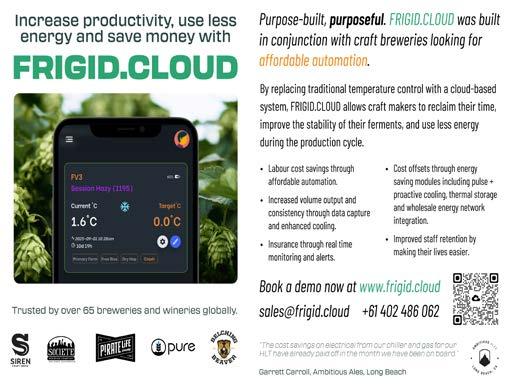
























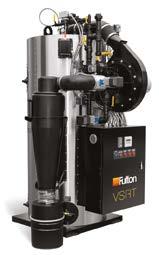



Our class-leading range of fuel-fired, electrically-powered and hybrid steam boilers and portfolio of aftercare solutions can help with your decarbonisation strategies and put your brewery on the Road to Net Zero.










As a complete solutions provider, Fulton can provide your processing facility with:

· fuel-fired, electric and hybrid steam boilers
· off-grid and point-of-use solutions
· ancillary plant / engineered systems


· steam surveys
· project management
· water treatment contracts


· accredited / certified training



· installation / commissioning / upgrades







· repair / service / maintenance programmes
For further information scan the QR code, visit www.fulton.co.uk, email sales@fulton.co.uk or call the office on +44 (0)117 972 3322.





Natural stabilisation aids for a
















WHEN IT CAME TO BREWING A NEW WEST COAST IPA, ESTONIA’S PÕHJALA UTILISED A WEALTH OF HOP PRODUCTS INSTEAD OF TRADITIONAL T90 HOP PELLETS FROM BARTHHAAS. THE RESULTS INCLUDE A BOOST IN YIELD, REDUCED BREWHOUSE WASTE AS WELL AS THE MAXIMISATION OF BOTH TANK AND PROCESS CAPACITY.
Founded in 2011 in Tallinn, Põhjala Brewery is one of the most respected craft breweries in Northern Europe. Known for bold, experimental recipes and technical precision, Põhjala’s approach combines Baltic tradition with international flair. From decadent barrel-aged porters to highly aromatic IPAs, the brewery values innovation just as much as it does consistency.
The collaborative brew, named Nova Lux, was designed as a modern West Coast IPA, a style that calls for a clean, assertive bitterness and a bright, aromatic hop profile. But rather than simply increasing dry hop loads or sticking with conventional hop formats, the objective was to enhance aroma and bitterness while improving brewhouse efficiency.
To accomplish this, the Põhjala team replaced traditional T90 hop pellets
with a suite of BarthHaas advanced hop products including Flex for kettle bittering, Incognito in the whirlpool, Spectrum for post-fermentation dry hopping and HopAid Antifoam for increased tank utilization.
Despite a higher total hop load in Nova Lux, the use of Flex and other flowables drastically improved brewhouse performance. Martin Vahtra, Põhjala’s head brewer, explains: “The bitterness that Flex provided was incredibly clean, and the beer didn’t have the green bite one might usually associate with these dry-hopping levels.”
By reducing vegetal matter, Põhjala’s centrifuge runs were faster and required less downtime. HopAid Antifoam also allowed the team to exceed tank volume by 15%, pushing 115 hl into tanks designed for 100 hl, a significant boost in production without extending brew days or labour hours.
A highlight of the recipe was the inclusion of Eclipse, a proprietary variety from Hop Products Australia (HPA), a member of the BarthHaas group. Eclipse is known for its bold sweet mandarin character, light pine, and bright citrus.
Used both as T90 and in Spectrum form, it contributed depth and complexity without haze instability or harshness.
“The hop character came off as very expressive… white grapefruit, pine, tangerine, pomelo, just an overall sweet citrus character,” adds Vahtra.
What started as a one-off experiment has now become part of Põhjala’s regular brewing practice. The results were clear enough to spark a permanent change.
“We’ve now started using Flex for all of our bittering additions across the board, for lagers, IPAs, barrel-aged beers… not just for yield gains, but also for the clean bitterness it brings,” he concludes.
For brewers facing rising raw material costs, tighter margins, and sustainability pressures, adopting liquid hop extracts and other advanced hop formats isn’t just an upgrade, it’s a necessity.
The Põhjala collaboration illustrates how brewers can use BarthHaas technology to boost yield and profitability, reduce brewhouse waste and labour, maintain clarity and quality while also maximising tank and process capacity.
Below: How traditional process compares with the recent Nova Lux collaboration
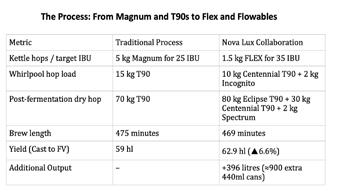




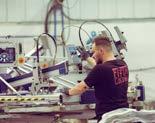

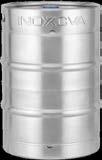









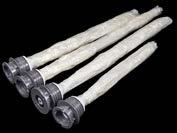

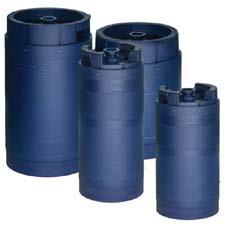

WITH THE YEAR DRAWING TO A CLOSE, HERE ARE SOME MALT VARIETIES LIKELY TO ENTER THE MARKET AS WE HEAD INTO 2026 AND BEYOND.
Earlier this summer the Malting Barley Committee completed the Spring 2025 round of meetings to evaluate the potential of new malting barley varieties. And in this guide, the MBC approved malting barley list for 2026 harvest gives brewers insight and also helps growers of malting barley identify varieties most likely to meet the needs of the market in the year ahead.
Here are some changes to the MBC approved list. Diviner stays at Provisional Approval 2 for malt distilling use. LG Aquarius and Bounty were moved to Provisional Approval 2 for brewing use. Belter and Olsen were moved to Provisional Approval 2 for Brewing and Malt Distilling use. Firecracker, Ptarmigan, KWS Enduris and SY Arrow were moved to Provisional Approval 1 for Brewing and Malt Distilling use.
Elsewhere in its update, SY Signet was removed from the Approved List for Brewing use – withdrawn by breeder while Electrum was removed from the Approved List for Brewing use. Flagon (Syngenta) continues to hold its’ market share, retaining 11% of the total UK winter malting barley market in 2024. It has high resistance to brown rust but is susceptible to net blotch. Craft (Syngenta) secured 48% of the UK winter malting barley purchased in 2024. This variety has given consistent treated
yields throughout the UK. It has high resistance to brown rust and is resistant to the common strains of barley mosaic viruses.
Buccaneer (Saaten Union) is a newly approved for 2025 crop, for brewing. Buccaneer has shown its best relative performance in the East region and on heavier soils. It shows no major weaknesses in disease resistance and has given high yields in untreated UK trials. It has high resistance to brown rust and is resistant to the common strains of barley mosaic viruses. SY Vessel (Syngenta) approved by the MBC as Special Use for malt distilling, for 2025 crop. Growers were advised to speak to their merchants about end markets.
Laureate (Syngenta) continues to dominate the UK spring barley market, with 63% market share in 2024. It has given high treated yields in the West region. It has high resistance to mildew, rhynchosporium and net blotch and has given high yields in untreated UK trials. Moderate resistance to brackling.
RGT Planet (RAGT Seeds) continues to hold its share of the spring barley market, at around 11% in 2024. Has high resistance to mildew but is susceptible to brown rust. A relatively stiffstrawed variety with moderate resistance to brackling. LG Diablo (Limagrain) continues to hold its share of the UK spring barley market at around 10% in 2024. Has given its best relative performance in the East and North regions. High resistance to mildew but is susceptible to brown rust. A late maturing and relatively stiff-strawed variety with moderate resistance to brackling.
Skyway (Agrii) is a newly-approved for brewing in 2024, Skway has given high treated yields in the West region.
Has high resistance to mildew and rhynchosporium but is susceptible to brown rust. A relatively stiff-strawed variety with moderate resistance to brackling.
SY Tennyson (Syngenta) is fully-approved by the MBC for brewing and malt distilling for 2025 crop, SY Tennyson has given high treated yields in the East region. High resistance to mildew but susceptible to brown rust. A late maturing and relatively stiff-strawed variety with moderate resistance to brackling.
Other profiles of note LG Aquarius (Limagrain) which is under test by the MBC for brewing, with completion due spring 2026. LG Aquarius has given high treated yields in the West region and has very high treated yield potential in the East region. High resistance to mildew but susceptible to brown rust. A stiffstrawed variety with moderate resistance to brackling.
Firecracker (Agrii) is under test by the MBC for brewing and malt distilling, earliest completion due spring 2026. Firecracker has given high treated yields in both the East & North regions and has very high treated yield potential in the West region. High resistance to mildew and net blotch and has given high yields in untreated UK trials. A relatively stiffstrawed variety with moderate resistance to brackling. While Ptarmigan (Agrii) is also under test by the MBC for brewing and malt distilling, earliest completion due spring 2026. Ptarmigan has a high yield potential in both the West & North regions. High resistance to mildew and net blotch.
The Maltsters’ Association of Great Britain formed in 1827. Its membership still represents more than 98% of the UK malting industry, buying around 2 million tonnes of choice UK malting barley, to make about 1.6 million tonnes of malt.


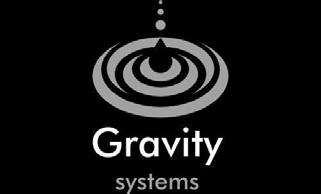

+44 (0) 1733 834264
+44 (0) 1733 834264
www.gravity-systems.co.uk
www.gravity-systems.co.uk
Trading Partners with PMG
Trading Partners with PMG
+44 (0) 1733 667052
+44 (0) 1733 667052
martin@premiummachinerygroup.co.uk
martin@premiummachinerygroup.co.uk

www.premiummachinerygroup.com/contact-pmg-uk

www.premiummachinerygroup.com/contact-pmg-uk

Over the next 10 years the beer market in the UK is expected to experience a Compound annual growth rate (CAGR) increase of 0.1% in volume to 4.1 billion litres and a 3.9% increase in value to $8bn (£5.9bn), according to a new report.
The figures, which form part of United Kingdom - Beer - Market Analysis, Forecast, Size, Trends And Insights from IndexBox, said that between 2024 and 2035, there will be an upward consumption trend in the UK over the next decade.
In 2024, approx. 4bn litres of beer were consumed in the UK; reducing by -4.7% compared with the year before. Overall, consumption showed a relatively flat trend pattern. Over the period under the report review, consumption hit record highs at 4.bn litres in 2016; however, from 2017 to 2024, consumption stood at a somewhat lower figure.
The revenue of the beer market in the UK reduced modestly to £3.9bn in 2024, falling by -4.6% against the previous year. This figure reflects the total revenues of producers and importers (excluding logistics costs, retail marketing costs, and retailers’ margins, which will be included in the final consumer price). According to the new report, over the period under review, consumption, however, showed
a relatively flat trend pattern. As a result, consumption attained the peak level of £4.9bn. From 2023 to 2024, the growth of the market remained at a lower figure.
In terms of production in 2024, approx 3.8bn litres of beer were produced in the UK; stabilizing at the previous year’s figure. Over the period under review, production saw a mild descent. The pace of growth was the most pronounced in 2021 with an increase of 19% against the previous year. Beer production peaked at 4.4bn litres in 2015; however, from 2016 to 2024, production remained at a lower figure.
In value terms, beer production fell modestly to £3.9bn in 2024 estimated in export price. The report adds that in general, production, however, showed a relatively flat trend pattern. The most prominent rate of growth was recorded in 2022 with an increase of 32% against the previous year. As a result, production reached the peak level of £4.9bn. From 2023 to 2024, production growth failed to regain momentum, they said.
On the import front, the UK recorded a decline in irs overseas purchases of beer, which decreased by -16% to 684m litres in 2024. In general, the report outlined, imports recorded a noticeable decrease. The pace of growth was the most pronounced in 2016 with an 18% increase. As a result, imports reached the peak of 1.1bn litres. From 2017 to 2024, the growth of imports failed to regain momentum. In value terms, beer imports declined slightly to £424m in 2024. Overall, imports showed a slight downturn. The most prominent rate of growth was recorded in 2016 with an increase of 18%. Over the period under review in the report, imports reached the maximum at £538m in 2018; however, from the period of 2019 to 2024, imports stood at a somewhat lower figure.
When we focus on overseas shipments of beer, in 2024 these increased by 11% to 436M litres, rising for the second year in a row after three years of decline. Over the period under review in United Kingdom - Beer - Market Analysis, Forecast, Size, Trends And Insights exports, however, recorded a noticeable contraction. The pace of growth was the most pronounced in 2023 with an increase of 28%.
The exports peaked at 658M litres in 2013; however, from 2014 to 2024, the exports stood at a somewhat lower figure. In value terms, beer exports expanded notably to £455m in 2024. In general, exports, however, recorded a pronounced setback. The most prominent rate of growth was recorded in 2021 with an increase of 7.5% against the previous year. The exports peaked at £728m in 2013; however, from 2014 to 2024, the exports stood at a somewhat lower figure.
Looking at exports by country, Ireland (124M litres), the United States (93M litres) and France (32M litres) were the main destinations of beer leaving the UK, accounting for a combined 57% share of total exports.
The Netherlands, Spain, China, Canada, Italy, South Korea, Germany and Belgium lagged somewhat behind, together comprising a further 28%, the report demonstrated. From 2013 to 2024, the most notable rate of growth in terms of shipments, amongst the main countries of destination, was attained by China with a CAGR of +11.7%, while the other leaders experienced more modest paces of growth. When we look at value terms, the largest markets for beer exported from the UK were the United States (£118m), Ireland (£92m) and France (£44m), with a combined 54% share of total exports.
EDINBURGH-BASED CLOSET BREWING PLACES AN EMPHASIS ON QUALITY VEGAN BEERS, THE QUEER COMMUNITY AND KEEPING A LOCALMINDED, OUTGOING APPROACH AT THE CENTRE OF THEIR MISSION. THE BREWERY, FOUNDED BY LUCY STEVENS AND LIZZIE STEVENS USE UNIQUE FLAVOURS AND INNOVATIVE TECHNIQUES TO CREATE BEERS THAT ARE, AT THEIR HEART, A LOT OF FUN. HERE, COFOUNDER LUCY HELPS CHART THEIR JOURNEY TO-DATE.
Seven years ago, I was brewing my very first beers in a large plastic bucket in the cupboard of my first flat in Leith.
It was this cupboard that would later provide my wife and I with the name of our brewery; Closet Brewing.
Fast-forward to 2023, through Covid, countless batches of good (and less good) home-brewed beer, and my own ‘coming out’ journey, I would finally leave my cushy nine-to-five to embark on the reckless (and occasionally misguided) journey of making “Brewer” my full time job. The last two years have been a rollercoaster to say the least. Growing the fledgling brewery has often involved late nights and long weekends, and we’re not quite out of the woods yet, but we’re finally starting to carve out our space in the beer scene.
Closet Brewing started, literally, out of our house in July 2022. After a good four years of homebrewing and a lot of googling about the requirements for starting a brewery in your home, and then several forms, and a surprisingly straight-forward visit from the council we were brewing. Those first few batches were just 30L each, canned and labelled by hand, and sold to local independent bottle shops.
The learning curve was steep, and I will be eternally grateful to the bottle shops and pubs who supported us from the beginning, despite the various challenges we went through as such a small business. Almost to my amazement, the beer was good enough to generate far more demand than we could manage on this small kit and six months later we scaled up to a ‘massive’ 70L kit, taking up most of our kitchen, conservatory and spare bedroom.
It soon became clear that increasing production again within the confines of
our house was not feasible, lest we end up sleeping on sacks of malt. After a lot of debate about contract brewing, and visiting several facilities across the country, we brewed our first 16HL batch with our friends at Otherworld just outside Edinburgh. Though I wanted to avoid sounding overly sentimental when I wrote this, it is absolutely necessary to say that Closet Brewing wouldn’t have survived without their help getting our beer made and teaching me all the brewing tips and tricks I use today.
Contract brewing allowed us to build our fanbase without the overheads of capital and rent and test the waters for our growing brand, but it’s not without its disadvantages; the margins were much slimmer, we couldn’t build a significant range with the bigger batch sizes required, and we were heavily dependent on brewing in periods of lower demand. My wife and the other half of Closet Brewing, Lizzie, will tell anyone who listens about the day the first contract brews arrived and, having not yet secured warehouse space, we stacked them in our living room, entirely blocking out the windows. However, we didn’t have the funding available to lease and fit out a brewery, much less purchase a full brewhouse and tanks, so contract
Real change in the industry needs to come from more than just us,” Lucy Stevens Closet Brewing
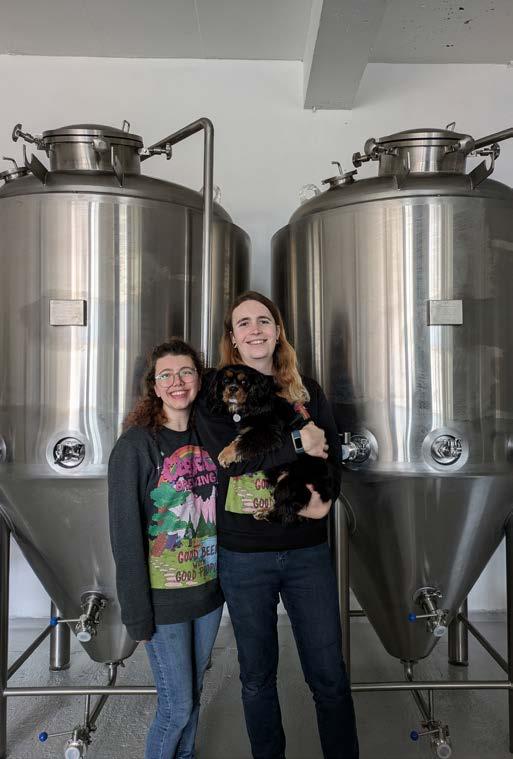

brewing allowed us to start growing our audience at a scale we just couldn’t achieve on our own. Thus begins the latest chapter in the story, and our current set up; cuckoo brewing with our own permanent tanks at Stenroth Workers Cooperative.
We’re still tiny in the scale of things, and have kept our DIY mentality at the heart of what we do (although applying this to the brewery circuitry was perhaps not the best idea). Sharing the space with two other breweries allows us to make the most of cooperation, splitting costs, sharing equipment, and helping each other out to make really good beer.
This shift away from the traditional business model of prioritising profitability has been refreshing; our brewery has never been driven by financial gain.
As queer brewery owners, in what is still quite a straight, cisgender, male dominated industry, we wanted to create a place of our own to operate outside of the bounds normally enforced by capitalist enterprise.
To be able to create things just so they exist, because we want them to exist, regardless of profitability, is a freeing approach to running a business..
Our goals are simply to make good, interesting, and varied beer; I believe there is a beer out there for everyone, and we strive to create a space where everyone can enjoy a nice pint. Outside of the beer itself, we want to use our brewery as a platform to help other
queer individuals, and small businesses; through donating beer and profits to LGBT causes, collaborating with queer artists to design labels, and lending a hand at local community events.
Creating spaces that welcome queer people and women is at the core of our mission, but without our own taproom this isn’t always as straightforward as we’d like. We’ve had to find ways to foster this inclusive environment in pre-existing spaces; organising events where we are physically present and using our visibility to show people that they belong in these spaces.
We’re always looking for ways to connect in non-traditional spaces too; last year we held a pop-up ‘tiny taproom’ out of an old police box on Leith Walk, and used our digital platform to fundraise for the Good Law Project with an impromptu webstore. Having our own taproom and community space is still very much our end goal, but until then we’ll do everything we can to create places where anyone can feel safe and welcomed.
Real change in the industry needs to come from more than just us. While there are many people doing inspiring work to push beer into a better place, (Queer Brewing and Women in Beer just to name a couple) these are still small steps in a massive industry that is often resistant to change. Being an inclusive venue is about more than just putting
up a pride flag every June and calling it a day, queer businesses continue to exist all year round and allyship involves supporting them and standing up for members of the community even when it’s inconvenient to do so.
This includes being deliberate about who you do business with, and making sure that those breweries or bars are also safe for women and queer people. Our approach certainly isn’t all sunshine and rainbows though. It definitely comes with a healthy chunk of sacrifice.
Days off don’t exist - even when we aren’t physically brewing we are planning events, running social media, dropping off deliveries, fulfilling orders, discussing brews, troubleshooting issues together and realising we still haven’t ordered those damn business cards. Holidays are planned with military-like precision around the brewery calendar, and every room in our house has, at one point or another, housed equipment, cans, kegs, ingredients and labels.
But, in spite of this, our approach has allowed us to create an entity entirely our own, that reflects mine and Lizzie’s ideals, personalities and passions in every facet. By rejecting the idea that rapid growth and huge injections of capital are the only way to build a brewery, we’ve managed to carve out a little spot in this busy, fluctuating industry just for us.
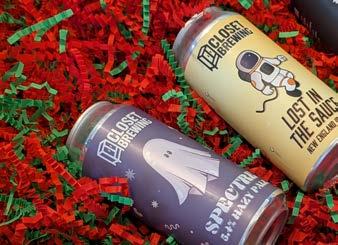

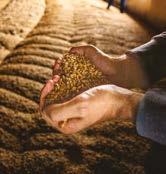
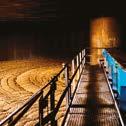


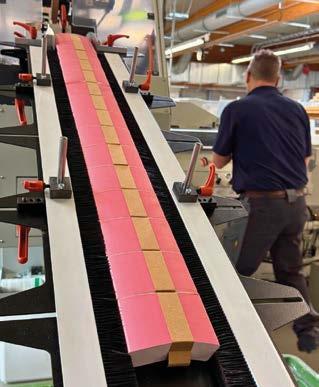
Rembrandt Labels, part of the Belgian Graphius Group (also active in the UK with Park Communications and Geoff Neal), is now bringing its wet-glue label expertise to the UK market. With their graphic know-how and recent investments in label printing and die-cutting capacity, Rembrandt Labels is ready to meet all your label needs. Alu paper, uncoated, matt-coated, extended colour gamut, gloss and matt effects… Just ask Rembrandt Labels!

Hemelstraat 2, 1651 Beersel - +32 (0)2 300 76 44 - labels@rembrandt.be www.rembrandt.be
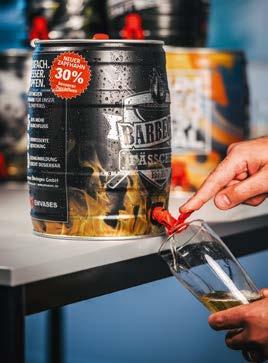
In his book Tribes, Seth Godin lays out his belief that everyone has the potential to start a movement - to bring together like-minded people and achieve something meaningful.
Of course, what that ‘something’ is will vary from tribe to tribe.
In this piece, I want to focus on building a better beer industry: specifically, by shaking off its historical misogynistic baggage and exclusionary male dominance, and moving toward a more inclusive future.
This is something I set out to drive back in 2017, when Women On Tap was born. After testing a few fun events that spotlighted and celebrated women in beer, we realised there was an opportunity - and a need - to do more. The concept quickly took on a life of its own, and people began turning to us for help, and with hope.
In 2018, I formally incorporated the business as a CIC - a Community Interest Company - and a Certified Social Enterprise. This move was a clear signal of our commitment to our socially driven mission to transform the brewing industry by dismantling gender barriers, offering education, and increasing meaningful opportunities for women. Since then, we’ve become known as pioneers of initiatives that spotlight brilliant women in the beer industry, through a programme of activism including events, campaigns, and arts commissions.
To date, we’ve delivered more than 100 events and seven festivals, alongside a range of campaigns and collaborations that celebrate women in beer, boost beer education, and push for progress in both the beer world and wider society. In other words, we’ve been busy building what you might call ‘our tribe’. In 2024, we formed an Advisory Board, bringing
together a team of experts from both within and beyond the beer industry.
Together, we explored how to build on our foundations, create meaningful impact, and drive real change.
From that process, we developed a strategic plan and a new Theory of Change model. We also took the lead on the iconic International Women’s Collaboration Brew Day (IWCBD) - the global campaign that brings together beer and International Women’s Day.
IWCBD, originally founded in 2014 by Sophie de Ronde, Burnt Mill Head Brewer, encourages women in the beer industry, homebrewers, and local communities to collaborate and create new beers in celebration of International Women’s Day (IWD). From its inception through 2023, the campaign provided a central platform to connect IWD brewing projects across the globe.
While many International Women’s Day brewing events took place in 2024, there was no unified IWCBD campaign.
Following a few conversations between myself and Sophie, Women On Tap CIC stepped in to coordinate and publicise the initiative for 2025, introducing a few small changes. I’d observed and participated in the campaign over the years, but stepping into a coordinator role gave me a whole new perspective. What struck me immediately was this: There was still a need for this campaign - its absence in 2024 was felt. And with an established profile and an engaged community, there was real potential to formalise the fundraising side and create meaningful, lasting impact.
We kept the campaign’s familiar icon but introduced a refreshed look. We commissioned a new design using Women On Tap’s signature purple and orange colour palette - a visual marker of our takeover.
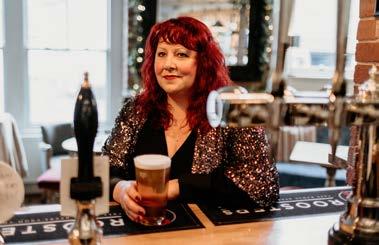
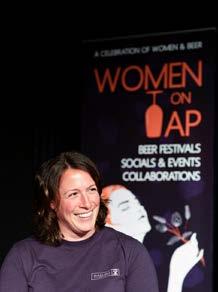
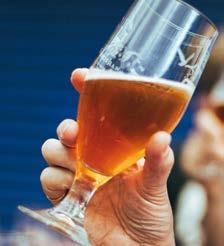
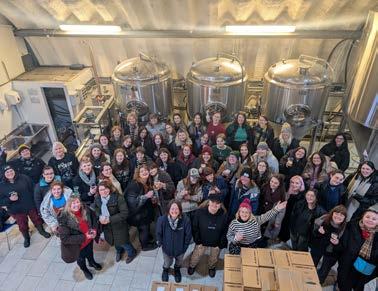


Recognising the campaign’s potential to scale, we secured sponsorship that allowed us to invest in the project and bring in paid expertise in the form of freelance support from Kimberley Spivey. Huge thanks to the Society of Independent Brewers and Associates (SIBA) - our headline sponsors - as well as to Simpsons Malt. We also welcomed the Wine & Spirit Education Trust (WSET) as our Education Partner. Their supportincluding 18 free places on the globally recognised Level 1 Award in Beer for campaign participants - added a valuable formal education strand to our efforts.
I invited original founder Sophie to choose this year’s theme. She chose Unite Society, and with women’s rights being rolled back in real time across the world, this theme couldn’t feel more timely. Fast-forward to today, and what an incredible, humbling experience it’s been. This year, the campaign showcased 61 brew day projects across the EMEA and Americas regions, and more than 800 women and non binary people came together, brewed 66 beers and raised almost £27,000 for 44 women’s causes.
But beyond the numbers, the creativity and connection really stood out. Some of the beer artwork is outstanding, and the photographs from the brew days have been deeply moving - powerful images of communities coming together, sharing an experience, and boldly saying: “Here we are!”. The beer names themselves have been a masterclass in activism and storytelling, including Even If Your Voice Shakes, Wrong Sized Space Suits, Women Of A Certain Age, Shame Must Change Sides, That’s What She Said, Pirate Queen, and Here All Year.
This campaign sparks a level of innovation that’s a true credit to the brewing industry, and it’s been an honour to be part of it. The women driving this work are skilled, passionate, and relentless in their pursuit of change. I urge the wider industry to take a good look at what this rather special tribe has achieved over the last few weeks, and to ask what they can learn, take away, and action, so these efforts don’t go to waste. Naturally, we’re not done yet. We’re eager
to keep building: growing national and international engagement, raising more funds, expanding the tribe, and laying the foundations for a lasting legacy. We’re exploring exciting ideas like the introduction of IWCBD awards and a dedicated IWCBD Festival, where we can get as many of the beers brewed as part of the campaign as possible pouring on bars at a central celebration.
This could easily evolve into a yearround project. One thing is certain: the fusion of Women On Tap’s ambition with the energy of the IWCBD community is a force to be reckoned with. This goes beyond representation. Beyond networking. Beyond education. Beyond allyship. Beyond activism. We have a real chance to join forces and change the face of beer for good. I invite you to be part of that. Women On Tap CIC has launched Changemaker — a new supporter community helping to fund its continued operations and new projects.
: Claire McClean, Nicci Peet, Ryan Walsh, Turning Point Brew Co, Fern Dalton.
Thomas Fawcett & Sons Ltd is an independent, 8th generation family malting business, founded in 1809. The Company supplies high quality malt products to the brewing, distilling and food industries. It is looking to recruit a new Maltings Manager for its site in Castleford, West Yorkshire. The key responsibilities of the role are to manage and schedule all barley and raw material intake, process operations and maintain raw materials in optimum quality conditions for malting.
This is a diverse role with great opportunity for progression in a family-run, independent company. In addition to core responsibilities above, the Maltings Manager will be responsible for hiring personnel across key departments, SHEQ and engineering maintenance.
Applicants should have relevant industry experience, and apply by providing a CV/cover letter via post or email to Production Director, Brian Hickman: bhickman@fawcett-maltsters.co.uk
Thomas Fawcett & Sons Ltd, Eastfield Lane, Castleford, West Yorkshire, WF10 4LE.
The Company offers a competitive salary, options for a company car, and access to a defined contribution pension scheme.

LIKE AN IMPOSTER AND START TO DOUBT YOUR CAPABILITIES, IT CAN BE EASY TO THINK ABOUT GIVING UP ON SOMETHING BEFORE EVEN TRYING. THE ONLY TRUE FAILURE IN LIFE IS GIVING UP; AS LONG AS YOU KEEP PUSHING FORWARD, NO MATTER HOW SMALL THE STEPS
MAY BE, YOU WILL EVENTUALLY FIND
Imposter Syndrome is defined as an internal belief system of not being good enough – despite evidence to the contrary – which leads the sufferer to feel like an intellectual fraud.
Such is the influence that these selfdefined inadequacies hold over people’s confidence levels, that the result can have an adverse effect on a person’s career and overall feeling of wellbeing. An internal monologue determined to ignore intrinsic capability and proven achievement will repeatedly ask, “Who do you think you are?” or “When will they notice that I’m a fake?”
This invisible affliction manifests from a number of causes, the most common of which is self-doubt. Compared to others who appear to be higher achievers, having to ask for help from colleagues and receiving criticism are also contributing factors which, left unchecked, can lead to anxiety,
depression, and a negative impact on work life in terms of job performance and job satisfaction.
Identified by two American psychologists who were studying a group of highly successful women in the 1970s, the cognitive dissonance between indisputable achievement and perceived inadequacy has been labelled Imposter Syndrome. More recent studies have uncovered the scale of this form of anxiety within the workplace and, such is its prevalence, it can now almost be classified as ‘the norm’.
Reaching across a wide demographic, imposter syndrome affects a higher number of women than men.
Millennials appear to have greater susceptibility than other age groups due to societal pressures (including social media), and ethnic minority groups are also disproportionately more affected. This phenomenon also throws up the paradox of high achievers being some of the worst sufferers.
Particularly relevant in today’s work environment, remote workers lacking physical interaction with colleagues and therefore less likely to receive positive feedback and feel part of a team are among a growing section of society who are struggling to hold back the waves of isolation and professional insecurity. Thankfully, there are ways to fight back. The most important one being to talk about it honestly.
Diffidence can encourage the desire to learn, to prepare better and to practise harder. Which, while it may not feel as such at the time, can only be a good thing. By acknowledging fear within the framework of a positive mindset, negative feelings can be transformed into motivation in order to stretch towards new goals and competencies. “When I feel self-doubt and lack of confidence creeping in, I pause and try to identify the root cause of that. 10 times out 10, I realise that I need to spend time
researching a topic, talking to somebody who is more experienced than me on the subject, and reading as much as I can about it. Inevitably, I feel better prepared and that in turn makes me feel more confident. It’s the internal change of perspective that matters,” says Tea Colaianni, founder of Inclusion in.
To counterbalance the unhelpful but hardwired human trait known as negativity bias (a tendency to focus on the bad stuff), reflecting on successes can help push back Imposter Syndrome by reframing thoughts into positive (rather than negative) achievements. This could be in the form of a list of accomplishments, remembering job progression or favourable testimonials about past work. A mental technique used by professional athletes is projecting future success. For example, visualising a positive response to a presentation prior to making it conditions the brain for a successful outcome and instils more confidence.
Focusing on achieving rather than failing and celebrating small wins at each step towards a goal prevent our motivation levels slipping. pace their understanding of inclusive leadership and their role as leaders in making an impact. One line of thought to tackle self-doubt is to conceal it in a layer of artificial bravado and pretend to be the confident person we want everyone to think we are. However, defining self-worth by our status within an organisation put being real into the “I’m going to get found out” danger zone.
Rita Clifton CBE, author of Love Your Imposter, discourages this approach preferring to advocate honesty and authenticity. Despite her own formidable career path, she assures that insecurities affect everyone and describes Imposter Syndrome as a normal part of the human condition. “Take on your imposter self and use it as a driver to come out stronger,” she explains.
Faking it for a short period might be manageable, but keeping up the pretence day in, day out uses up a great deal of energy, much in the same way that keeping up a lie needs a very good memory! The reality is that many, many people present themselves in this way. But does that make it right? appropriately and admit to sometimes not knowing or understanding. It is also important for male colleagues to cultivate self-awareness in relation to male privilege and unconscious biases while maintaining a growth mindset. To be more influential, male allies should make their stance clear and public from the start in order for others to follow, and finally, encourage male/ female colleague interaction within the workplace including gender equality initiatives. Positive professional encounters enable greater understanding and inclusion.
Adopting a growth mindset can be hugely beneficial. This is defined as the belief that intellect and natural talent are just a starting point in personal and professional development.
In order to grow, a love of learning and having a natural curiosity to advance authentic purpose, can encourage selfdoubters to add small, incremental steps to their climb up the corporate mountain. “I still have a little impostor syndrome… It doesn’t go away, that feeling that you shouldn’t take me that seriously. I share that with you because we all have doubts in our abilities, about our power and what that power is.” Michelle Obama – former First Lady.
Inner confidence can be developed through having clarity around personal strengths and talents and from there, fully defining goals – short, medium, and long term. Self-awareness is key. Applying brand thinking to our own personal brand – about us, ourselves and identifying our authentic purpose, understanding what drives us and what we are good at provokes mental solidity aka self-confidence. This added to a relevant skill set simplifies the process of creating a coherent (and desired) direction along a career path and speaking from such a place of authenticity will come across to others.
Evolving job needs are empowering women and levelling the playing field. The new service economy doesn’t rely on physical strength but skills that come easily to women, such as determination, attention to detail and measured thinking. The female brain is naturally wired for long-term strategic vision and community building. Strong leadership involves using the power of nurture, thereby creating space for employees to grow and shine.
To build long-term, sustainable relationships, CEOs need to lead by example. And women are naturally good at this through a willingness to share their vulnerabilities and to talk openly.
“Shame always shrivels when you share it out loud,” adds Marie Forleo – American entrepreneur.
When you feel like an imposter and start to doubt your capabilities, it can be easy to think about giving up on something before even trying. The only true failure in life is giving up; as long as you keep pushing forward, no matter how small the steps may be, you will eventually find success.




T



WELCOME TO THE 2025 BREWERS CONGRESS AND BREWERS CHOICE AWARDS. HERE YOU’LL GET THE FULL LOWDOWN ON THE WEALTH OF TALENT AND BEST-IN-CLASS BUSINESSES TAKING PART IN THIS YEAR’S EVENT AS WELL AS THE BRILLIANT BEERS, BREWERS AND BREWERIES SHORTLISTED FOR THE 2025 AWARDS.
LAST MONTH, JUDGES FROM ACROSS THE BREWING SPECTRUM CONVERGED LONDON, TO DEBATE AND DISCUSS THE WEALTH OF EXCELLENT ENTRIES SUBMITTED FOR THE 2025 ITERATION OF THE BREWERS CHOICE AWARDS. HERE’S HOW THEY GOT ON.
There was a real wealth of quality and talent demonstrated across each and every category in the 2025 Brewers Choice Awards, and judges from across the beer, brewing and the hospitality spectrum recently converged on the Mikkeller Brewpub in London, to debate and discuss the wealth of excellent entries submitted and nominated. The winners of which, will be crowned in London on the evening of 30th September.
The categories up for discussion were Young Brewer of The Year, Brewer of The Year, Packaging Powerhouse, New Brewery of The Year, Brewery of The Year, New Beer of The Year, Beer of The Year, Branding of The Year, Sustainability Champion, Diversity and Inclusivity Champion and the Roger Ryman Lifetime Achievement Award.
This year’s submissions were judged by a wealth of talent that included Lotte Peplow, the craft beer ambassador in Europe for the Brewers Association, Brew Resourceful founder Chris Lewington, Stuart Anderson the founder of London’s Ghost Whale and Alex Greig, the owner of Fuggles Beer Cafe in Tunbridge Wells and Tonbridge.
Also on the panel were Mikkeller location manager Jake Milne, Liquid Sky Drinks founder Stu McKinlay, freelance beverage and hospitality consultant Sean Robertson, the regarded pub landlord and champion of the on-trade Roger Molyneux and Paul Davies, founder of the award-winning AleHunters Brewery Tours. Tim Sheahan, editor of The Brewers Journal, chaired the judging session.
Tim Sheahan, global editor of The Brewers Journal, said: “It’s the sixth year of hosting our Brewers Choice Awards and I always consider it a genuine privilege that our publication can play
its own part in helping showcase and celebrate the brilliant beers, breweries and brewers that form the fabric of this fantastic industry. As expected, the calibre of the submissions was incredibly high and it was great to see the number of entries increase year-on-year.
“I would like to thank everyone that entered and a huge well done to everyone that has made the shortlist this year. We look forward to announcing the winners, alongside the recipients of the Roger Ryman Lifetime Achievement at our 2025 Brewers Choice Awards dinner in London this September.
“Special thanks to our sponsors, judges and also to Jake Milne and the team at the Mikkeller Brewpub in London for being the perfect hosts!”
There are some incredibly talented young brewers working in the UK brewing industry. Some young brewers are running their own operations, others are cutting their teeth working at established outfits. Regardless, these brewers are making their mark on the industry and are certain to have a long, successful career in the field.
Jake Astbury | Neighbourhood Brew Co
Sean Forde | Sureshot
Tilly Gonzalez | Turk’s Head, Exeter
Harry Gwilliam | Attic Brew Co
Reece Hugill | Donzoko
Ben Lucas | Mondo Brewing Company
Sam Martyn | Fable Brewery
Fiona Mullender | Northern Monk
Andy Potter | Queer Brewing
One of the finest qualities many brewers boast is humility. So this category it was always likely to need some convincing/ persuading/forcing when it comes to ensuring these excellent brewers are
considered. We wanted to acknowledge a brewer that is truly an industry tour de force. What sets them apart from the rest? Is it the beers they create, expansion they’ve overseen or a team they’ve built. Maybe it’s all of those….
Matt Dutton | Track Brewing Co
Daniel Gambino | Anspach and Hobday
Dan Gooderham | Adnams
Dan Hocking | Bundobust
Simon Perrett | King Street Brew House
Al Wall | Burton Bridge Brewing Company
New in 2025, this accolade is designed to recognise the brilliant talents and personalities that keep everything ticking. They might not always get the spotlight but their skillsets ensure the beers brewed across the UK leave the brewery in the condition the team intended and important, reach the consumer in that optimal condition, too.
Lee Branchett | Duration Brewing
Emily Mappin | Northern Monk
Matt Wickham | Lost and Grounded
This award aims to recognise, and celebrate, an individial or business that strives and works tirelessly to promote diversity and inclusivity throughout the beer and brewing industry.
Miranda Hudson | Duration Brewing
Queer Brewing
Lucy Simons | Let’s Beer
Amélie Tassin | Women in Beer
The UK and Ireland boasts brilliant breweries. Brilliant businesses employing brilliant people producing brilliant beer. But which brewery has really stood out head and shoulders over the rest during the last 12 months? If you’re part of a team at one of this breweries, or want to suggest one that is really standing out, this was the place to do it. We wanted to hear about key moments for the business such as new investments that have been
made, new distribution deals, its work in the community, or ways the brewery has grown and improved its team.
Abbeydale
Anspach and Hobday
Bundobust
Pillars
Thornbridge
Wiper and True
While the last few years have proven to be a challenging period for brewing and hospitality, there has also been a raft of excellent new breweries opening, too. And they are all forging their own path, producing different styles of beers in different part of the UK and Ireland. So like our Brewery of The Year category, if you were part of a team at one of this breweries, or had wanted to suggest one that is really jumping out, this was the place to do it.
Colbier
Kerroo Brewing Company
Lost Cause Brewing Co
We can think of countless fantastic beers that have been produced in recent months. In the entries, we wanted to hear how this beer is shaping a trend or exploring new techniques and flavours.
Texas Whistle – Mondo Brewing
Company IPA 0.5% – Nolia
Beyond – Northern Monk
Rainbow Juice – Queer Brewing
Strong Dark Mild – Thornbridge and Garrett Oliver
Supported by Barth Haas X
We want to celebrate the very best beer the UK has to offer. We’re not looking at dozens of categories, instead recognising one beer - The Brewers Choice ‘Beer of the year’.
Black Mass – Abbeydale
London Black – Anspach and Hobday
Faith – Northern Monk
Roadie – Signature Brew
Jaipur – Thornbridge
Great branding helps sell beer. Now we have that revelation out of the way, we want this category to showcase the stunning array of design that breweries leverage to brand their beers. From the striking to the subtle, modern beer is blessed with some truly impressive branding; from the work that graces bottles and cans to keg founts, cask badges and beyond.
Bundobust
Fell Brewery
Moonwake
Rooster’s Brewing Co
Track Brewing Co
Wiper and True
Supported by CleanEarth Energy
Sustainability in brewing can longer be a simple buzzword or a b oxticking exercise. We are seeing a growing number of breweries embrace innovation and implementing measures to affect positive change. And the 2025 Sustainability Champion celebrates that So if you’re a breweryor business that has changed your way of working for the better this was your chance to platform just that.
Fell Brewery
Muntons
Northern Monk
Supported by eKeg
The Roger Ryman Lifetime Achievement award helps recognise and toast a figure in the brewing industry that has made an indelible mark on countless breweries, beers and people along the way. This year’s winner will be announced alongside all other categories in London at Big Penny Social on the evening of the 30th September. Join us!
The shortlisted beers in the ‘New Beer of the Year’ category
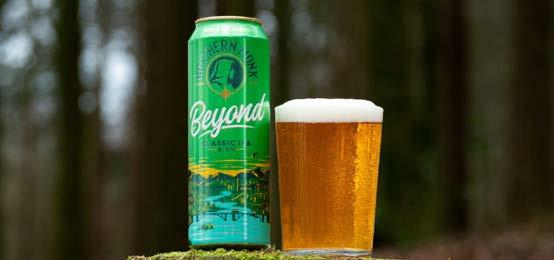
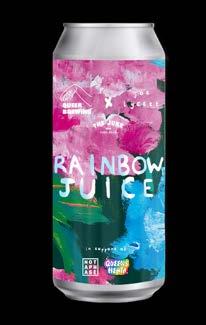
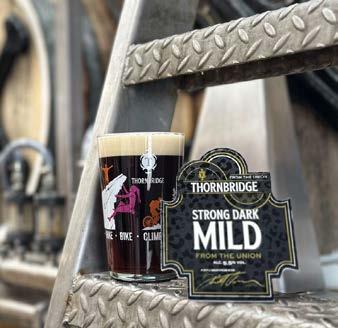
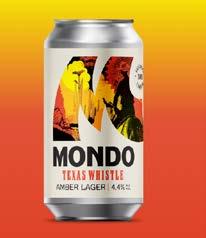
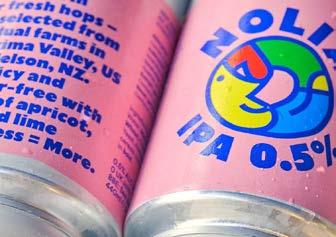
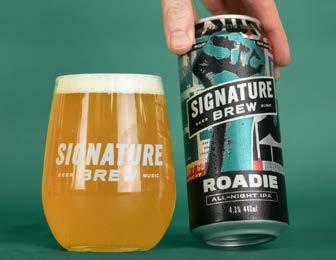
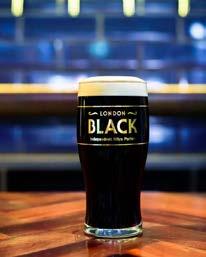
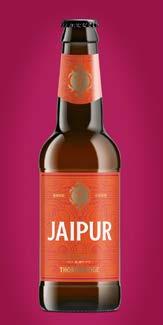
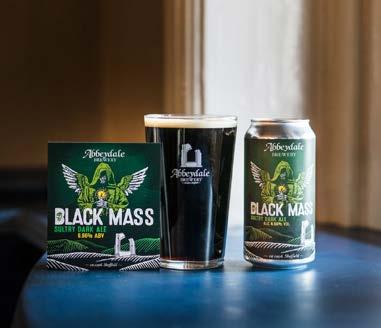

The beers battling it out to be the Brewers Choice ‘Beer of the Year’ in 2025
THE IDEAL LAGER YEAST TO ENHANCE HOP THIOL RELEASE

Shaping the future together
It’s important to look beyond the short term, which is why Krones is working on “Solutions beyond tomorrow”. Be it beverage and food production lines, digital services or plastics recycling: Krones’ innovative solutions combine superior performance with sustainability.
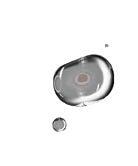
This carefully selected active dry yeast is ideal for expressing aromatic compounds from the raw materials in beer, more specifically the hops. This strain possesses the capability to release and esterify thiols. As a result, beers crafted with SafLagerTM SH-45 may present enhanced levels of fruitiness and intensified citrus and tropical notes (passionfruit, grapefruit…).



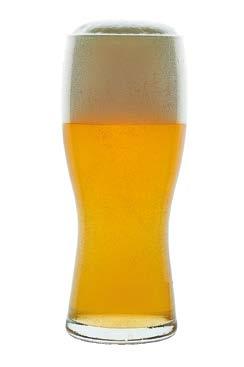
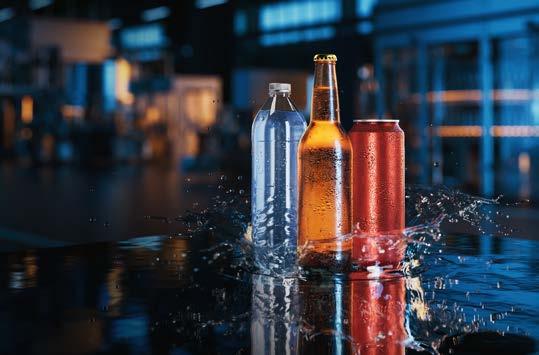



Manufacturers and suppliers from the world of ingredients, packaging, capital equipment. software, measurement, analysis, branding and more are all taking part in the biggest Brewers Congress to date. So here is a glimpse of the ariety of innovation you can expect at this year’s event.
Bevcraft Group (Stand 805) is a leader in the ‘craft can’ packaging sector in Europe and providing can decoration, filling, distribution and related solutions to craft beverage producers. They believe cans are key to a sustainable beverage sector as they are light, robust, economic and infinitely recyclable. They employ more than 40 people across 8 locations in Europe and North America to serve the needs of over 500+ craft beverage clients in 20+ countries. At Bevcraft Group, they package potential.
At BrewWizz (Stand 705) they create innovative tools that help brewers boost efficiency and maximize profits. Beer and beverage geeks like them crave consistency and control over our final products. That’s where the their FizzWiss by BrewWizz—Bubbles Anywhere Edition—comes in. This fully automated carbonation system delivers perfect, stable carbonation every time, solving the all-too-common issues of inconsistency and instability. Whether you’re brewing beer, cider, kombucha, seltzer, or something else entirely, FizzWizz has you covered.
Certuss Steam Generators (Stand 117) was founded in 1957 in Krefeld, Germany, when company founder Hans-Joachim Schroder and a team of enthusiastic and focused engineers set to designing a reliable, low noise, rapid steam raising,
vertical steam generator. Today, with their UK service centre, the main German manufacturing base, and USA Group members along with 34 other Certuss agencies worldwide they offer the latest steam technology and exemplary service.
Earthly Labs (Stand 501) technology is uniquely designed to capture carbon dioxide waste from smaller sources such as businesses, homes, and transportation that make up more than half of all carbon dioxide emissions. With them, you reduce emissions and have a valuable product to show for it. They tackle climate change with small change—and we’ve been doing it for years.
With a close relationship to the brewing industry, CleanEarth (Stand 604) have worked with 15 breweries up and down the UK, including: Wiper and True, Ludlow Brewing Co, and most recently Healey’s Cyder Farm with a 1,224-panel
rooftop installation. As leading providers of renewable energy to UK businesses, CleanEarth’s in-house team have been in operation for over 15 years from their offices in Cornwall. With 800 wind turbine and solar PV installations across the UK, their projects represent a generating capacity of 155 Gigawatts - equivalent to powering 47,000 homes and saving the UK over 50,000 tonnes of carbon emissions every year.
Corosys Beverage Technology (Stand 902) offers businesses the right solution for your application. Detailed engineering, individual design and complete automation from the malt intake to the pressure tank cellar are their strengths. Their clientele ranges from globally active mechanical engineering groups to medium-sized German breweries. They supply innovative complete solution packages based on leading control systems and software for the visualization and documentation of your processes
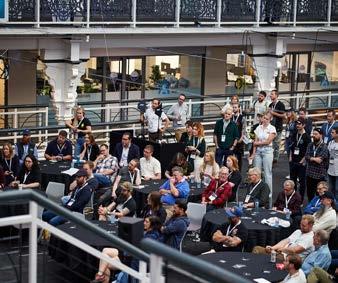
in the brewery, beverage and chemicalpharmaceutical and biotechnology industries. For instance, they can automate the entire brewing process from malt intake to bright beer tank area.
Crisp Malt (Stand 806) has lived and breathed malting since 1870. With their passion and expertise, they produce and supply the finest UK malt to the brewing and distilling industry across the globe. They combine traditional and modern malting techniques at their sites in England and Scotland to create an impressive range of malted and non-malted products, including several unique and exclusive barley malts; such as Chevallier Heritage Malt. They are brewing malt suppliers to a diverse range of partners.
Direct Air (Stand 111) is committed to providing the most energy efficient and cost-effective solutions to our customers by communicating our expertise and technical guidance. Their friendly, expert team tailor the best package for your requirements; from air compressor servicing and maintenance to full pipework projects and custom turnkey installations; we have the experience and knowledge to deliver an efficient, safe and complete solution.
ekeg (Stands 304/305/404/405) is the UKI’s leading keg management solution. They’re now known simply as ekeg, formerly known as Close Brothers Brewery Rentals. They provide keg and cask pooling, leasing, servicing and tracking solutions to over 600 brewing and cider customers across the UK and Ireland daily. They own +1m kegs and casks, service +3.5m every year and track millions of keg and cask trips from brewery to bar and back again with our award-winning technology. They’ve geared up with some familiar faces, an elevated service and a bold new future. We’re building for an even better world of more draft beer and cider with less carbon. To find out how they can help make your kegs simple contact them on +44 (0)1452 485421 or help@ekeg.co.uk. Enterprise Tondelli (Stand 114) has been working with breweries for many years, and consider them as part of the core
business. The breweries have ranged in size from International groups to craft or microbreweries. We have worked with breweries in various parts of the world, and have extensive experience in meeting the needs of the industry, particularly with reference to such issues as cleaning and product integrity. Since 1977 Enterprise Tondelli has been supplying bottling and canning solutions to the brewing and spirits industries. Whether you need a complete line or a single machine Enterprise Tondelli have the answer. From 1,500 bottles/cans per hour to 80,000 bottles/cans per hour.
At Euroby, (Stand 902) their services have enabled many companies and utilities to improve efficiency, reduce costs and increase the effectiveness of their waste management programmes and food and beverage production. Their mechanical separation technology used in the manufacture of beverages, optimises yield while guaranteeing consistent quality. Their decanters, separators, 3-phase machines and belt presses are used for various applications in beverage manufacture.
The Fermentis (Stand 112) beer yeast strain line-up is designed to answer the requirements of all brewers, regardless of their size and location. They are always looking to improve their range, with new products added every year based on the needs of the market. Their active dry yeasts and yeast derivatives cover almost all professional requirements: from safeguarding production to expressing sensory characteristics in beer, wine, spirits and more.
At Figura Analytics (Stand 802) we count particles, of all shapes and sizes, to give you a ‘fingerprint’ of what your beer should look like at different stages of the production process. Using the Figura Analyser you can check that you beer is in spec and compare from batch to batch or brand to brand, as well as rapidly identifying abnormalities and potential contaminants, from bacteria to wild yeast. Seeing and understanding your brands like never before will help you do what you do best, brewing great beer.
Good Energy (Stand 901), based in Chippenham, Wiltshire, is driving the shift to a cleaner future, looking to power over 1 million homes and businesses with 100% renewable energy. Supported by over 2,500 UK generators and 180,000 microgenerators, it champions local, sustainable power through helping customers generate, store and sell renewable power with solar installs, batteries and export tariffs.
Grundfos Water Treatment UK Ltd (Stand 119) delivers cutting-edge solutions trusted by many leading industries such as the food and beverage sector, including breweries. With a legacy of innovation and a commitment to sustainability, we provide fully integrated systems that ensure water quality, process efficiency and compliance. From filtration technologies including reverse osmosis, water softening and conditioning, to precision chemical dosing and advanced disinfection, our solutions help customers meet everevolving environmental standards while reducing operational costs. Our expertise and global reach make us the partner of choice for reliable, efficient and futureready water treatment.
HEB (Stand 807) is leading manufacturer in Turkey for parasol, beach umbrella, gazebo, flag, beach flag and banners. They supply high-quality products to a diverse range of industries, including alcoholic & non-alcoholic beverage sectors, ice cream companies, soft drink companies, hotels, restaurants and solution partner for global brands. With a state-of-the-art 10,000 m² in-house facility for printing and assembling, they are able to ensure full control over quality and production efficiency.
HIT Training (Stand 606) is the leading specialist training and apprenticeship provider for the UK’s hospitality & catering industry and the only training company offering the celebrated ‘Level 4 Brewer Apprenticeship’, collaborating with the University of Nottingham. The programme’s success is measured, not only through individual achievements, but also the measurable business performance impact.
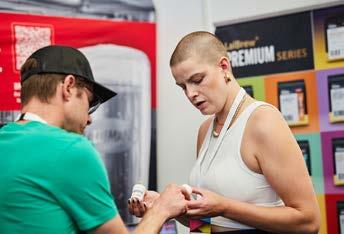
and customers to lead the industry with sustainable malting methods, reducing carbon and conserving their natural resources from grain to glass.
Pattesons Glass (Stand 603) is a leading global distributor of glass packaging, providing a range of innovative solutions for the food, drink, and cosmetics industries. They have successfully helped many companies to complete their product development whether it be jams, chutneys, sauces, beers, whiskies, vodkas, olive oils, bath oils and more..
Keg Logistics (Stand 113) specializes in keg rental and keg leasing that benefits the brewer. Whether you have looked at rent to own kegs, lease to own kegs, or pay per fill kegs, Keg Logistics has you covered with its proprietary rent-to-own keg model.
Continual investment in technical innovation, biotechnology, digitalisation, sustainability, and support services ensures Kersia UK (Stand 703), part of the Kersia Global Group, leads the field in brewery & beverage, food processing, dairy, and foodservice & facilities. Kersia continues to deliver CIP and hygiene solutions through revolutionary technology and an unparalleled commitment to service levels.
Muntons (Stand 704) is a UK based manufacturer and global supplier of world-class malts and malted ingredients. It provides a full portfolio of sustainable brewing malts, from crushed malt in sacks to the whole malt in bulk. Muntons’ brewing technology experts help breweries wanting support with areas including recipe development. Regarded as the world’s greenest maltster, Muntons puts sustainability at the heart of everything we do. They work hand in hand with our suppliers
You want to turn water into great beer? Niche Solutions (Stand 903/904) are here to help. Niche supplies all the essentials to the brewing industry, from KeyKegs and hygiene products to processing aids. At Niche, they share your passion for brewing. Whether you’re a long-established brewery or an ambitious start-up, they understand what you need to craft perfect beers. Their equipment, ingredients and cleaning detergents are all subject to the highest quality control and are extremely costeffective. Their expertise is yours to share as they take a special pride in their reputation for service. Niche doesn’t just offer fast and free delivery of first-class brewery supplies – their team are always happy to discuss your needs, to help with any brewing enquiry, and give you the benefit of our unrivalled expertise.
NOMOQ (Stand 505/506) stands for NO Minimum Order Quantity. They make ‘1’ the new minimum order to help you, whether you are a big or small brand, to pack your drink in state-of-the-art cans. They are no ordinary digital printing company. They love turning aluminum cans into works of art, so your great drink gets the packaging it deserves. You deserve more than average-looking cans.
Rembrandt Labels (Brussels) (Stand 502) is part of the Belgian Graphius Group, which also operates in the UK through Park Communications and Geoff Neal Printworks, both based in London. As a highly industrialised paper label printer (wet-glue and non wet-glue), Rembrandt Labels operates with three AI-controlled Heidelberg presses. They offer offsetquality printing with an exceptionally wide colour gamut (Multicolor), as well as gloss/matt finishes, metallic inks, and hot foil on a broad variety of papers. Labels can be square or custom die-cut in any shape, and are packed per 1,000 units or tailored to the specific magazine needs of your bottling line.
Sellar (Stand 801) is the leading B2B ordering platform for the craft drinks industry And Sellar Credit is the ultimate credit account for trade ordering. Sellar Credit is a Buy Now Pay Later solution that consolidates your orders into one simple monthly invoice, due at the end of the month + 30 days. Think of it as a monthly tab across all of your suppliers.
Signature Resin Floors (Stand 116) is a trusted specialist in industrial and commercial resin flooring across the UK. They provide comprehensive, turnkey solutions tailored to meet all your flooring requirements, delivered by their fully qualified and highly skilled team.
Founded in 1862, Simpsons Malt (Stand 601/602) is one of the largest independent, family-owned malting companies in the world with the capacity to produce around 300,000 tonnes of malt per year at its two malting sites. The company’s passion is a focus on making malts with taste, flavour and consistently high quality with the world’s best brewers and distillers in mind, helping them to craft the finest beers and whiskies. In
November 2021, Simpsons Malt became a Certified B Corporation with a score of 89.6 points.
Sky Malt (Stand 115) is an international malt supplier focused on base malts. Designed by Czech engineers, their malting plant in Western Ukraine produces over 170,000 tonnes of malt annually. Strategically positioned near Europe’s top barley fields, it upholds the highest international standards through meticulous quality control. Their in-house laboratory ensures every batch meets strict specifications. Each order comes with a full certificate of analysis, detailing the barley variety and origin—so you always know exactly what goes into your brew, with complete confidence in quality and traceability.
Tradyglass (Stand 205) is a familyowned glass and bottle development and decoration company founded in 2009. They are mainly active in Europe in the beverage industry: beers, wines, waters and spirits. Thei production site is one of the most modern in Europe. They are also is proud to be committed to sustainable development with their new decorating techniques having enabled us to significantly cut energy consumption.
Trafalgar Scientific (Stand 804) are a laboratory supplies company, that specialises in microbiology and analytical consumables, aimed at the brewing industry. From HAACP verification using ATP swabbing, to setting up a full microbiology and QC lab. Trafalgar Scientific, can offer the full range of products. They have over 30 years of supplying hygiene and laboratory capital and consumables into breweries – they can offer the full range of both equipment and consumables.
UBC Group (Stand 503) is a manufacturer of beverage cooling and dispense equipment. They have a full range of cooling equipment – mini, midi, full size air- and water-cooled, PTCs, shelf coolers – and specialised event and home dispense equipment. Dispense fonts and towers also available direct from manufacturer. UK-warehoused stock of c. 1,000 pieces with next-day
delivery for your convenience. At UBC their main goal is to fully and effectively meet the needs of our customers, offering their services and products in the most convenient format.
UK Flowtechnik (Stand 803) is a joint venture company between UK Flow Ltd (the UK distribution arm of E-Holdings based in Germany) and Flowtechnik (formerly the process flow metering division of Hydrotechnik UK Ltd) UK Flowtechnik Ltd has been formed to build on the success of both companies in the manufacture and supply of flow meters, instrumentation, process sensors, specialist pumps, magnetic couplings and high quality hydraulic components. UK Flowtechnik Ltd offers products from quality brands such as: VSE, Beinlich, DST, HBE, Flomec, GPI, Lake Monitors, Seametrics, Elis Plzen, Bopp & Reuther and Comeco as well as many other quality brands. We also offer a competitive calibration & repair service.
Each Vetroelite (Stand 605) bottle is born with an ever-evolving narrative force. It is the passion for our work that guides us in the creation of our designs. Their goal? To design bottles with a strong identity that challenge us to go beyond production limits to give shape to experimentation, always new. The result is an unexpected frame capable of immortalising thoughts and emotions, high-end packaging that will leave its mark.
White Labs (Stand 701/702) began as home brewers searching for higher quality yeast, quickly grew into a team of dedicated biochemists exploring new ways to advance brewing altogether. Today, White Labs stands at the intersection of science, education and craft. Constantly striving for perfection, and in the process continually raising the bar in the art of fermentation. Their mission is to stretch the limits of science in order to set new standards in purity and freshness. From the industry’s first pitchable liquid yeast to a revolution in the way it’s propagated and packaged, their innovative spirit is tireless.
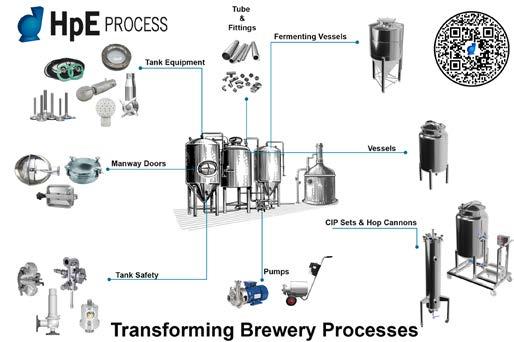
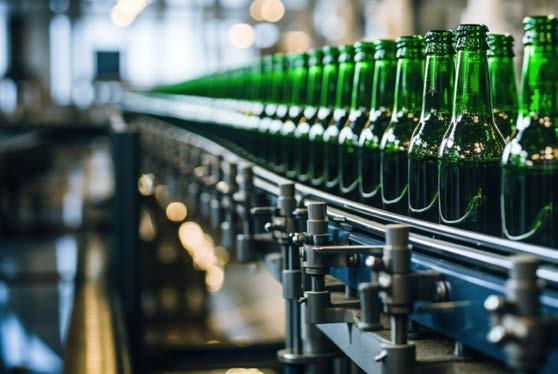
As sustainability, efficiency and quality control become critical to long-term success, breweries of all sizes are rethinking how they use, treat, and reuse water. At Grundfos Water Treatment, we work closely with brewers to unlock the full potential of advanced water technologies – helping reduce waste, ensure product consistency and future-proof breweries around the world.
Contact us today to find out more: sales.uk@grundfoswt.com T: +44 (0)1494 441286 www.grundfos.uk/wt
Grundfos Water Treatment UK Ltd. Unit 2, Halifax House Coronation Road HIgh Wycombe, HP12 3SE, UK
THE BREWERS CONGRESS IS DESIGNED PRIDE TO PLATFORM BEST-INCLASS TALENT FROM THE ACROSS THE WORLD OF BEER AND BREWING. IN 2025 THIS YEAR, THAT’S NO DIFFERENT. HERE’S SOME OF THE SPEAKERS, PANELISTS AND WORKSHOP HOSTS TAKING PART.
The Brewers Congress is returining this Autumn and we are once again platforming some of the finest expertise hailing from the beer, brewing and hospitality sectors to deliver lectures, panels and workshops.
At this year’s event we are proud to welcome David Jesudason, an awardwinning journalist and author. Among his accolades are Beer Writer of the Year – 2023 and Be Inclusive Hospitality’s Writer of The Year – 2022. He’s the author of ‘Desi Pubs – A Guide to British-Indian Pubs, Food & Culture’ published in May 2023 while Roger Protz said was “Deeply researched and beautifully written” and Phil Mellows called “The most important volume about pubs for half a century”.
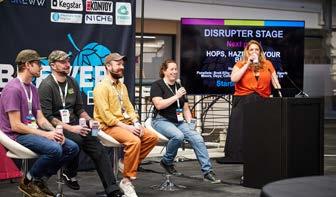
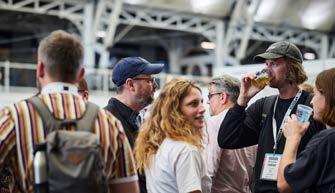
Tamar Banner is a veteran of the craft beer industry, having started brewing professionally in the US in 2001. In 24 years of brewing, she has worked in the brewhouse, cellar, packaging, quality, and management. She is currently the brewmaster at To Øl Brewery in Svinninge, Denmark where she manages brewing, packaging, quality and recipe development. Prior to To Øl, she worked for Harpoon Brewery in both Boston and Vermont, New Belgium Brewery in Fort Collins, Colorado, and BrewDog Brewery in Canal Winchester, Ohio.
Yvan De Baets is the co-founder of Brussels-based Brasserie de la Senne. The seminal brewery has made its name with beers such as Taras Boulba, Zenne Pils and Zinnebir. Complex, bitter beers underpinned by balance, subtlety and nuance. These organic, artisanal beers, unfiltered, free of any additives, and refermented in both the bottle and the barrel. These are truly distinctive beers, 100% made in Brussels.
Georgina Young is the brewing director at St Austell. Respected across the industry, she continues an impressive career glittered with achievements. The winner or our 2023 ‘Lifetime Achievement’ award at the Brewers Choice Awards, she began her brewing career at Smiles Brewery, Bristol after graduating from Heriot-Watt University with an MSc in Brewing & Distilling. She went on to run the pilot brewery at Camden BRI for six years before joining Fuller’s as production brewer in 1999, where she served in roles across all aspects of production. Now, as brewing director at St Austell Brewery, she is an integral part in the company’s growth and success.
Angus Morison is the head of production at Vault City. Joining as a senior brewer before moving into the role of production manager, he has helped grow Vault City to be Scotland’s largest sour beer producer. They make heavily fruited, modern sour beers and other styles, too.
Amelie Tassin is the founder and director of Tipple Marketing, a marketing and strategy agency based in Edinburgh, Scotland. In 2018 she founded Women In Beer, a ‘women who beer’ group in Edinburgh, in 2019 the successful Women In Beer Festival (WIB Fest), a celebration of women in the industry with an impressive roster of events including tap takeovers, talks, and tastings.
Chris Pilkington is the co-founder of Tuletorn brewing (“Lighthouse” in Estonian). The brewery, owned and operated by Kristina Pilkington and Chris, brew an ever changing selection of small batches in Kopli, Tallinn. They first opened their brewery and taproom in April 2024, and have since been hard at work bringing a unique brand of playfulness to the Estonian craft beer scene. Before starting Tuletorn, Chris was the head of production and a founding member of Tallinn’s revered Põhjala.
Lotte Peplow is the Brewers Association’s American Craft Beer Ambassador for Europe. Her role is to identify opportunities for international expansion of American craft beer and to raise awareness about the quality, diversity and innovation from America’s small and independent craft brewers. Based in London, UK she’s a Certified Cicerone, Beer Sommelier, beer writer, author, international beer judge and keen beer and food pairing advocate.
Matthew Curtis is a writer and photographer obsessed with beer, pubs and their culture. Based in Manchester, he’s the co-founder of Pellicle Magazine and the author of three books on beer and pub culture within the UK, including the award-winning Manchester’s Best Beer Pubs and Bars.
Emma Cole is the brewery manager at Burton Bridge Brewery, Heritage Brewing Company and the Burton Bridge Inn. Alongside head brewer Al Wall, Emma helps run the brewery which produces celebrated cask and bottled beers that are enjoyed across the UK. Prior to Burton Bridge, Emma was part of the team at Manchester-based Cloudwater.
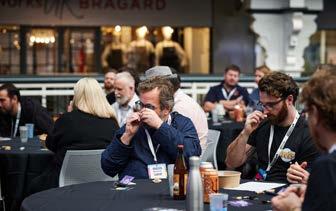
Jordan Childs is the CPO, head brewer and one of the founders of Mash Gang, In the last four years he has designed and released over more than hundred beers at 0.5% or below. And in September last year, Mash Gang announced it being acquired by DioniLife. A pivotal moment in Mash Gang’s journey, fuelling its aggressive growth strategy and reinforcing its commitment to producing best-in-class beer.
Celina Dugulin is the technical projects manager at Murphy & Son. She found her love for the brewing industry in 2013 in Canada, where she worked for Lallemand at their R&D department in Montreal, amongst others, focusing on the development of new recipes for the production of dried brewing yeast, different fermentation and propagation techniques. She has worked as a quality technician, reviewed current fermentation practices, and gained knowledge about a wide range of fruit and malt ferments and also categories such as Hard Seltzers.
Paul Anspach is the head of production and co-founder of Anspach & Hobday. He’s involved in all aspects of the business with a particular focus on production, working closely with head brewer, Daniel Gambino, and the brewing team. Paul started home-brewing at university with childhood friend Jack Hobday and the duo went on to start their own brewery. An overnight success nearly 12 years in the making, Anspach & Hobday have long since cemented their place in London’s rich brewing fabric.
Rachel Auty is the founder of Women On Tap CIC, pioneers of initiatives that put brilliant women from the heavily maledominated beer industry in the spotlight through a programme of activism including events, campaigns, and arts commissions. She is also a marketing and brand consultant specialising in beer and the arts. In addition she is a proud Women in Beer mentor.
Julian Bourne and Matt Pritchard are the founders of Sellar, a tech startup launched in 2020 to transform the way independent drinks producers sell to trade. United by a shared vision to support the craft drinks industry, they’ve led Sellar’s growth from the ground up — building a platform that helps breweries increase their margins, reach more buyers, and streamline operations. Under their leadership, Sellar has become a trusted partner for hundreds of producers and trade buyers, creating a more connected, sustainable, and profitable ecosystem for independent drinks.
Marian Reed is the general manager and head of business development at Sudden Death Brewing in Lübeck, Germany. Throughout her career, she has been able to connect vision to actions, identify root causes and best outcomes, and manage team members in a way that best suits their own personal development arcs.
With over 25 years of senior commercial leadership at companies such as Diageo, Marston’s, and Budweiser Budvar Nick
Payne now helps run SA Brain & Co, an iconic Welsh brewery with a deep-rooted legacy. His focus is on preserving and evolving this historic brand, ensuring it thrives for future generations while making a meaningful impact on the community.
Laura Rangeley is the marketing manager, design liaison and sensory lead for Sheffield’s Abbeydale Brewery, and this year celebrates a decade of service there. She is also a co-owner of the business, which became an Employee Ownership Trust in 2024. Well known for their vast range of quality beers, from flagship pale ale Moonshine to smallbatch mixed fermentation project the Funk Dungeon, communicating about Abbeydale’s beers is an incredibly varied role where no two days are the same.
Krishan Rajput is the owner of Stirchley Wines & Spirits, a family-run off licence based in Birmingham that’s been serving the local community since 1979. Krishan has played an active role in helping to shape the UK’s beer scene, both locally and nationally. Over the years the shop has become a respected name in the world of beer. In 2024, Stirchley Wines & Spirits was recognised with the SIBA Business Award for “UK’s Best Independent Craft Beer Retailer”, and was also nominated for “Independent Beer Retailer of the Year”.
Edd Simpson is the managing director of Ossett Brewery and SALT Beer Factory. As well as leading the Yorkshire-based breweries since early 2023, Edd is also the founder of Barrique Fine Wines, a wine wholesaler, importer and retailer. A musician and songwriter, Edd was the head of department in different secondary schools prior to his move into the world of food and drinks.
Natalya Watson is an award-winning beer educator passionate about sharing her knowledge of beer with others because she believes that beer is simply too delicious to remain undiscovered. Natalya is qualified as an IBD Beer Sommelier, Advanced Cicerone® and WSET beer educator and holds her WSET Level 2 Award in Beer.

Tim Weaver is the founder of The Brand Weaver, an agency on a mission to even the playing field in brewery branding and marketing. Right now, a handful of breweries dominate with slick branding and sharp messaging—while the rest are left behind. Tim is here to change that. His work has helped breweries double their revenue, land two new trade accounts a week, and even win Brewery Rebrand of the Year. Because when branding is done right, the beer is left to do the talking.
Ideal Day Brewery is a small, family-run brewery based in their hometown of Lostwithiel on the banks of the River Fowey, Cornwall. Founded by Nia and James Rylance, they brew ingredientfocused, unique beers inspired by British and European traditions. Their beers are made with regenerative wheat, heritage
barley and whole flower British hops from a single farm in the UK.
Richard Bradbury is the managing director at Theakston, a brewery renowned as brewing innovators. They produce a wide range of small batch cask conditioned, premium keg draught ales, as well as bottled and canned beers for the UK domestic and many overseas markets. A strong commercial leader who is effective in building winning teams, strategy development and change management, Richard joined the business in 2020. Prior to this he was part of the team at Heineken UK for more than 20 years, departing the business as commercial director.
Shane Butterly is the production manager at Lervig. Since joining the Stavanger, Norway-based brewery in February 2023,
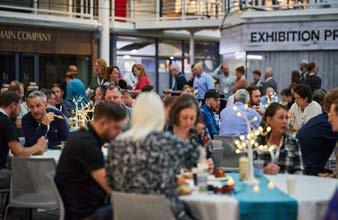
Shane has played an instrumental role in development of many Lervig beers including their Rackhouse series. These releases are another perspective in their brewing journey where the focus is on the influence of wood on their beers. Prior to joining Lervig Shane was the head brewer at Nottingham’s Neon Raptor and from 2014-2018, Rascals in the Republic of Ireland.
Linda Birch is the founder of Brewery Market, Twickenham’s multi-awardwinning bottleshop. Linda loves everything there is about beer, with an insatiable thirst for sour beers. Her devotion to craft beer is only matched by her love for the local community in Twickenham, championing diversity
the team at Hackney Brewery and prior to this, he learned his apprenticeship in brewing at Trumans where he was later promoted to assistant brewer.
Fergus Fitzgerald is the production director at Adnams. Here he is in charge of the teams managing brewing, distilling, logistics, supply chain, purchasing, H&S, and sustainability. Through his career he has travelled the path of the Institute of brewing and distilling exams, from certificate to diploma and Master Brewer. He has commissioned a new energy efficient brewhouse, transitioning from a Victorian brewhouse and flavour matching the recipes, some of which were over 100 years old.
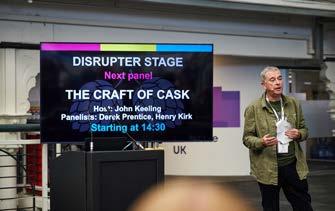
and equality in the workplace, and her affections for her dog, Pepper.
Josh Clarricoats the co-founder of Insiders, a creative studio dedicated to helping challenger brands find their fast lane. Insiders has created ground breaking advertising work for the likes of Geeta’s, Holy Moly, Yoto and more. He’s also the co-founder of Oat Cult, an overnight oats brand that is ripping up the rule book.
Bobby Dennis is the R&D brewer at London’s Signature Brew. Joining the company in 2018, Bobby has been responsible for quality control at the brewery ensuring their products were sent out to trade in optimal condition. Before Signature Brew he was part of
Angelique Green is the founder of The Mighty Shed, an independent cultural foresights, strategy and innovation partner to ambitious companies looking to maximise their growth potential. They help clients achieve the short-term wins that drive long-term growth by using ImaginAction to spark their next strategic growth opportunities & deliver brand innovation. She named the company The Mighty Shed inspired by this fundamental idea: Next big things always start small. All you need is a big, bold dream, the grit to act on it, and a mighty shed.
Alex Greig is the founder of Fuggles Beer Cafe. Created in 2013 in Tunbridge Wells with the aim of specialising in the best British & European beers the team can find coupled with great wine & spirits
In the last 12 years Alex has helped showcase, platform and celebrate some of the best breweries across the globe and is a strong supporter and advocate for new breweries starting their journeys in the industry.
Jenn Merrick is the managing director of Big Smoke Brew Co. As the Managing Director of Big Smoke Brew Co, she leads and oversees all aspects of brewery operations, business development, project management, and commercial strategy. She has a Diploma in Technical Brewing Science from the Institute of Brewing and Distilling, and over 15 years of experience in the brewing industry, working with various clients and companies across the country.
Neil Walker is head of communications & marketing at SIBA, the Society of Independent Brewers & Associates, and the man behind the much-heralded Indie Beer campaign – seeking to make it easier for customers to discover beer from genuine independent breweries. He is also a beer writer, beer sommelier and trained broadcast journalist.
Ali Ross is the general manager at The Coach and Horses in Soho, London. A revered and highly-regarded part of the capital’s hospitality scene, Ali took over running the Greek Street establishment in 2019. Under her guidance, Ali has turned The Coach and Horses into one of the UK’s most celebrated and popular pubs with The Evening Standard placing it as Number One in its run-down of London’s best pubs.
Paul Davies is the founder of AleHunters Brewery Tours. He has amassed a huge amount of knowledge of the UK and Belgium’s bars and breweries, and built up a network of contacts with the key people involved in the vibrant beer scene across Europe. In a previous life, he was a member of the Quality team at Fuller’s. He also delivered tours at its Griffin Brewery in Chiswick, welcoming visitors from the UK and overseas. He has hosted tutored beer tastings and has a thorough knowledge of beer – from grain to glass.
John Willetts is the director for
BarthHaasX, the world’s largest supplier of hop products and services. They have a full range of products from a portfolio that offers access to great flavours and aromas often not available from any other supplier. They offer the highest quality through world-leading processing techniques, peace of mind through the BarthHaas guarantee, increased profits and efficiency through their innovative hop products, and world-leading technical and brewing support from their Brewing Solutions team.
Amy Haselden is the in-house graphic designer at Track Brewing Company. With a wealth of graphic design prowess, Amy has helped elevate the brewery’s branding to ensure the Manchester business remain at the forefront of the UK brewing scene.
Since October 2021, Bart Wellens has served as commercial director at Trappist Brewery Westmalle. Leading a dedicated team across Sales, Marketing, and Logistics, his focus is on keeping this exceptional, authentic brand relevant in a fast-changing world—without ever compromising its soul. They don’t do traditional marketing; instead, they work with care and creativity, always respecting the unique DNA of Westmalle. Recent initiatives include the launch of the Westmalle Extra Glass (June 2024), our very first Open Brewery Days in 230 years (September 2024), and the introduction of Westmalle Duo, their first blonde Trappist beer on tap (March 2025).
Patrick Tuck is the co-founder of Madrid’s Oso Brew Co. The business he founded with business partner David Ross, started as a contract brewing operation in 2018 before the duo went on to open their own brewing facility several years later. Fans of hop-forward pales and IPAs, Oso Brew Co believe that simplicity is beautiful when it comes to beer, so they strive to make flavourful, clean, and refined beers. In short, they make the beers they’d like to drink themselves.
Since ditching a career in advertising, Dan Sandy has gained a wealth of firsthand hospitality front-line experience, having been GM of popular London outfit
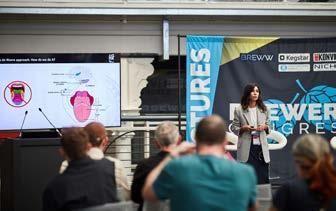
Kill The Cat for seven years and now running Missing Link’s taproom in West Sussex. When he’s not behind the bar, he runs tastings, sensory training and beer tours from his adopted home town of Lewes, East Sussex, with his company That’s The Beer Talking. Dan is also an Advanced Cicerone which has allowed him to judge beer internationally at some of the biggest and most prestigious competitions.
Author of five books on beer, journalist and broadcaster Melissa Cole’s passion is life is getting people to learn as much, or as little, as they want about what she considers the finest social lubricant known to humankind – beer. Respected the world over for her fine palate, Melissa is invited to judge at competitions in New Zealand, the US and Brazil, as well as closer to home
in the UK and across Europe. Melissa is also a regular contributor to several different broadsheets, food and drink magazines, BBC and independent radio and television – as well as international appearances all over the world.
Mark Cotterell is the head of production at Beak Brewery in Lewes, East Sussex. Joining the business from Manchesterbased Cloudwater, Mark has helped oversee a period of growth and success at Beak. Though best known for its hopforward IPAs, the brewery also makes a wide range of beers from crisp and clear pilsners to decadent imperial stouts.
Jourdan Gabbini is the buyer for beer and cider at Waitrose & Partners. Joining Waitrose in 2013, Jourdan has been involved in a number of buying roles at the business before moving into the
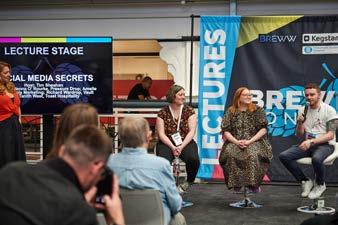
beer and cider space in March 2023. Working with a raft of drinks producers, he is responsible for helping Waitrose and Partners showcase and sell some of the best beer and ciders from across the UK, Europe and beyond. A passionate advocate for the industry, Jourdan is a popular member of the beer and drinks sector.
Richard Fuell is the head of business development for commercial solar at Good Energy. Richard has been in the solar industry for nearly 15 years. His knowledge and passion for the solar industry is unprecedented. Starting out as an installer in both residential and commercial systems, to then working for global leading solar panel and inverter
of Bristol-based Left Handed Giant. Known and cherished for their excellent beers, and equally brilliant spaces to enjoy them in, Left Handed Giant are one of the UK’s most regarded breweries. Not bad going for an outfit the founders consider something of an “accidental” brewery.
Francesca Nikita Corradin is the production manager at Botivo drinks. Botivo is an intensely refreshing aperitivo (non-alcoholic) with a bittersweet backbone, herbal notes and a tang of citrus. Francesca has brewed across Europe and joined Botivo as a production supervisor in December 2023 before being promoted to production manager. Toby Heasman is the head brewer at
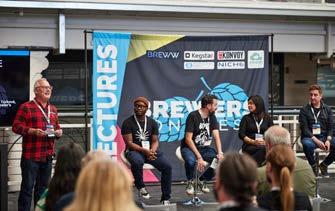
manufacturers. He says: “Understanding the combination of generation, usage, storage and transport is key as we transition to a decarbonized future”.
Vik Kastenbauer Stronge is the cofounfer of Lost Cause Brewing Co, a modern beer company rooted in community, creativity, and world-class brewing. Started with husband and business partner, the previous winner of our ‘Brewer of the Year’ accolade Colin Stronge, the duo set up shop in Castleford in 2024 with one goal: to brew exciting, approachable beer and create a space that brings people together. They believe great beer shouldn’t feel exclusive — it should feel like home.
Jack Granger is one of the co-founders
Hall and Woodhouse. Early in his career he was then recruited by Bass brewers – later completing his Master Brewer. He moved to Dorset and joined Hall & Woodhouse (Badger HQ) becoming Head Brewer three years later. In that time, they have built the new brewery (in 2012), won countless different beer awards, with Toby awarded Parliamentary Brewer of the Year.
Stefan Melbourne is the creative & events manager at Track Brewing Co. One of the UK’s most regarded breweries, the business continues to impress with its core range and raft of collabs with breweries in the UK and across the globe.
Peter Kennelly has been working in craft beer in the UK for over 14 years. This
involved working at EebriaTrade, then East and North London account manager for Siren Craft Brew and now he’s the head of sales for lager specialists Pillars Brewery. Obsessed with good pubs and restaurants, Peter aims to champion independent British lager with Pillars, one venue at a time.
Chris Lewington has spent his career working with breweries of all sizes, helping them reduce costs, improve efficiency, and lower carbon emissions. Over the past two years, his company, Brew Resourceful, has worked with leading names in the industry such as Northern Monk, Full Circle, Murphy & Sons, and Vault City to deliver practical, process-based solutions that enhance profitability and sustainability. Chris is also a regular speaker at global brewing industry events, sharing his expertise on decarbonising operations and creating more resource-efficient breweries
Francesco Lo Bue is an agronomist with a degree in food technology, specialised in Hops Aromatic Compounds. He’s and a brewer with 10 years of experience in the most technological craft breweries in Europe and the UK such as Beavertown in London.
Charlotte Cook is a brewer with a decade of experience in the craft brewing world, working at breweries as diverse and Pohala, Truman’s, BrewDog and Cloudwater. Today she is head brewer at Coalition Brewing in South London, and very happy to be back in the nitty gritty of brewing. In addition to this Charlotte has also been studying for a MSc. in Brewing Science at The University of Nottingham, with a dissertation specialising in the sustainability of modern hopping regimes and usage.
With more than 20 years industry experience, Ben Lockwood has worked for craft beer giants BrewDog, from 2019 through to 2024. And prior to that he was at Mitchells and Butlers working across the fields of operations, marketing and procurement for more than 12 years, returning recently to work in the beer category team. Ben has been responsible for launching industry-leading NPD,
as well as events and activations, that are proven to drive significant interest, growth and innovation in the beer category with breweries of all sizes.
Petteri Sikanen is the co-founder of Revenant Brewing Project, a contract brewery from Finland. Their aim is to brew exclusive small scale releases targeted to thrill people who are as enthusiastic about beer as they are.
Rod White has more than 20 years of experience in the multinational brewing industry; principally based out of Burtonon-Trent with the Bass/Molson Coors brewing company. In 2017 Rod joined the University of Nottingham as an Assistant Professor, helping to deliver Masters level
Moyra Williams spent 15 years at Gales in Horndean in various roles in and out of the brewery before moving to Australia where she spent 10 years working in the wine industry for Chandon in the Yarra Valley. Back in the UK, Moyra has worked for Kersia, the company formerly known as Holchem, for the past 8 years where she works with breweries large and small to enhance and optimise cleaning regimes to drive improved quality and efficiencies.
Alan Fulcher has been part of the team at Greene King for 25 years. During this time, he has gained a wealth of experience in both brewing and management, and have overseen much change in the business. In 2021 he became technical brewer and along with the company’s
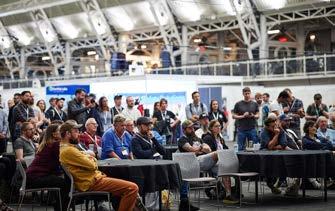
Brewing education. A naturally engaging educator, Rod is passionate about the development of young professionals for the industry and helps students with employability skills and finding the right job following graduation.
To many, John Keeling surely needs no introduction. But for those unaware, John is the former brewing director of Chiswick, London-based Fuller’s. Regarded and respected the world over for his ability to create and brew beers defined by balance and flavour, John is using his retirement to collaborate, consult and create with breweries across the globe.
After graduating from Heriot-Watt with a BSc in Brewing and Microbiology,
head brewer he deals with all aspects of their brewing – operations management, quality control and assurance, process improvements and NPD amongst others.
Aditya Parupudi is an award-winning research & development oriented brewer and distiller. He is currently the Master Brewer for craft at Royal Swinkels. Here he leads the development of innovative and high-quality beer recipes for Uiltje Brewing & Brouwerij De Molen, conducting sensory evaluations to ensure product consistency and excellence.
Dr. Tuur Mertens is a Belgian brewing scientist and industrial food engineer who specialises in beer flavour stability and shelf life. He earned his PhD through
the European Joint Doctorate in Food Science programme at TU Berlin and KU Leuven, where he researched the role of transition metals in beer oxidation and how natural polyphenols can improve flavour stability. He has published extensively on beer staling, flavour retention and innovative stabilisation methods and is the co-inventor of a patent for using pomegranate extract as a natural beverage stabiliser.
Alex Troncoso is the co-founder of the award-winning Lost and Grounded Brewers. Established in 2016, the business he started with partner Annie Clements has grown to be regarded as one of the finest in Europe. They are team fascinated by the precision of German brewing and the idiosyncratic nature of Belgian beers,
Nick Riley is a client director at CGA by NIQ. CGA works with food & drink suppliers, hospitality operators, trade bodies & financial institutions, providing market measurement & unique expertise across all parts of the On Premise route to market.
Giles Mountford is the head of beer brands at Hall and Woodhouse. With a wealth of advertising experience Giles joined Hall and Woodhouse in 2021. Here he is the head of brand marketing for Badger Beers, Outland Craft beer and tertiary brands, and was responsible for the successful revamp of Badger’s Premium Bottled Ales and the launch of the company’s Outland range of beers.
Henry Farr is a valuation director at Brand Finance. Here he specialises in the valuation of intangible assets. Henry is also an expert in brand and business valuation, business strategy, portfolio strategy, and M&A prospectus valuation, leading the alcoholic beverages, and hospitality sectors at Brand Finance.
Adam Keenan is part of the produce team at Chart Industries. They offer turnkey craft and Iidependent brewery CO2 recovery systems for capture, purification, storage, and use. Suitable from 2,000 HL a year upwards. They have solutions for cider mills, soft drinks, RTDs,
distilleries, wineries in their product range with water treatment and nitrogen dosing equipment also available.
Nick Whitehurst is the CEO at Figura Analytics. Figura is a spinout business from Loughborough University. Its academic founders have spent years developing the technology behind Figura. They have been using this technology to characterise nanomaterials, proteins, heavy metal ions, colloids, bacteria, and algae in a range of solutions from sea water, to blood and beverages. Nick has over 20 years commercial experience in multiple industries, and a passion for building businesses from the ground up.
Margaux Huismann is the quality control manager at Diageo-owned Cameronbridge Distillery. Prior to this she got her start in the industry by doing a masters in brewing and distilling and completing her PhD on Understanding the Physical-Chemical stability of DryHopped Beer
A brewery born in the Republic of Ireland but very much of international standing, Whiplash has become a byword for quality in the world of modern beer. Founded by Alex Lawes and Alan Wolfe, and backed by a team from across the globe, Whiplash has made its name thanks to its meticulous pursuit of quality
Mike Sayer is part of the team at HIT Training. HIT Training is the marketleading specialist apprenticeship and training provider for the UK’s hospitality, catering and retail industries. Working in partnership with sector employers, we improve employees’ skills, increasing their efficiency and productivity, enabling innovation whilst boosting your bottom line.
Since coming in to brewing in 2010 Jim Wilson has developed a real love for creating flavour and memories through fermentation. Having studied sensory analysis over time, he loves to work with producers to help them achieve the beverage that they want to share with their customers. From different ingredients to changing processes to
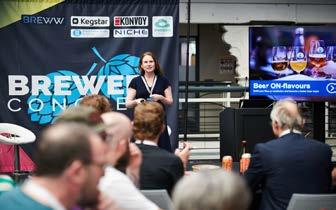
get more from their products, taste and pleasure is at the core of what I do. At Fermentis, he gets the chance to work with passionate colleagues around the world who enjoy the same challenges as Jim
As a commercial manager at CleanEarth, Ed Lennon leads the Solar team in identifying and developing new business opportunities for on-site renewable energy solutions. With nearly 10 years of experience in the UK renewables industry, he has a strong track record of delivering successful projects for a wide range of clients, from SMEs to large corporations.
Darren Fenton is the COO and cofounder Bevcraft Group, which is a leader in the ‘craft can’ packaging sector in Europe & the USA. The group provides
can decoration, filling, distribution and related solutions to craft beverage producers. Bevcraft Group which operates in the UK, Ireland, Europe, the Nordics,the USA and Canada is an integrated craft beverage packaging specialist focused on supporting the requirements of beverage producers and brand owners throughout their journey.
Alexander Hinds is the area sales manager for process technology at Krones UK. In his role he engages with the company’s customer base within the UK & Ireland and subsequently deliver technical processing solutions. This is primarily through their market leading process subsidiaries located in Germany, that deliver a wide ranging portfolio, from factory energy auditing to the engineering, fabrication and installation
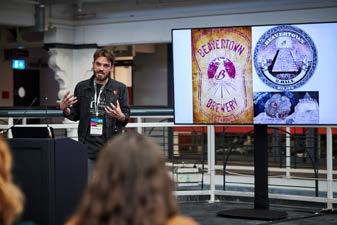
COMING TO WORK EACH DAY HAS ITS COMMITMENTS, ITS RESPONSIBILITIES. BUT WHAT’S IT LIKE BEING THE GUARDIAN OF A BREWING INSTITUTION NEARLY 250 YEARS OLD? TOBY HEASMAN, HEAD BREWER AT HALL & WOODHOUSE, KNOWS THAT PRESSURE BUT IT’S ALSO SOMETHING HE AND HIS TEAM TAKE IN THEIR STRIDE.
When you start out working as a brewer, nobody really tells you that your beers and your brewery will only be as good as the team you have around you. There’s only so much you can do on your own.”
If you’ve not had a beer from Hall and Woodhouse, you’re sure to know someone that has.
Blandford Fly Golden Ale, Fursty Ferret Amber Ale and Tangle Foot are longestablished household names while the newer Outland brand that launched in 2023, with beers such as its Tropical Pale Ale, West Coast IPA and Helles, are making a mark on their own terms. And heading up the production of these celebrated beers is Toby Heasman. Heasman is an award-winning, revered, brewer that joined the Dorset-based business back in 2006.
Approaching his 20th anniversary at the company, much has changed in the time Heasman has been part of the brewery. And much has also changed in the industry, and across the globe, since Hall and Woodhouse started out.
Because Hall and Woodhouse, the British regional brewery, was founded by Charles Hall in Blandford Forum in Dorset nearly 250 years ago and the story goes something like this…
In 1777 Charles Hall, an entrepreneurial gentleman farmer, built his Brewery in the Dorset village of Ansty. Fortunately for him, Dorset farmers are hard-working — and thirsty — and business was good. By 1793 the Napoleonic wars had begun and the British government gave their troops a daily allowance of five pints of beer. Charles saw an opportunity and won the license to supply Wellington’s troops quartered in Weymouth. 60 years later, his son Robert (who inherited the brewery) brought Edward Woodhouse into the business as his commercial partner, a move he knew would propel the business forward.
What he did not foresee was Edward falling in love with Charles Hall’s granddaughter, Hannah Dodge. Thus, when Edward and Hannah married Hall & Woodhouse was born. Over time, rather than spend on fine living, the entrepreneurial Robert and Edward drove the family business forward by investing the majority of profits back into the company — buying pubs in which to sell their ‘Badger beers’.
Today, their family of pubs are considered one of the finest in the country, with more than 150 public houses and inns, both traditional and contemporary, at the heart of their communities based across the South of England.
And ensuring those pubs, as well as countless other customers, have access
to great beer is Toby Heasman. Working with a team across Hall & Woodhouse that includes Giles Mountford, head of beer brands, Heasman has helped the brewery thrive and flourish by producing a wealth of beers that span the style gamut and method of dispense.
“I was probably about 15 when I started making cider. We had an orchard at home and I was drawn to it,” recalls Heasman. “My attention soon moved on to beer and the beers I made were generally well received. It came to the point where I was taking my A-Levels and the choice was between Arts and Sciences. With my interest in brewing, the latter was the logical decision.”
Now 16, this journey in drinks production would lead Heasman to Ridlington Village Cricket field. The opening bowler at the time was David Batten, a former employee of Ruddles. He recommended the aspiring brewer met another former member of the Ruddles team Jim Prior as well as its then head brewer Tony Davis. They met, chatted about the world of beer and he left Heasman with the closing comment that if ever needed work experience, he should let him know. As his stint at school drew to a close, it was time to discuss possible careers. Heasman knew what he wanted but, at least initially, it would be a case of “computer says no”.
“I got thrown out of the careers office at school for saying I wanted to go and do a Brewing and Distilling degree at Heriot-Watt,” he smiles. “This was at the time where they were computerizing the UCAS (undergraduate application service) system and the school computer system didn’t pick up the degree I wanted. Our careers master thought that I was taking the ‘Mickey’ making it up.” Technical gremlins would soon be banished and Heasman would make it to Scotland and the university of his dreams.

When you design a new beer it’s got to have enough character to bring somebody in,”
Toby Heasman, Hall & Woodhouse
Like his peers he was required to find a placement as part of the course and his Ruddles connections would take him to North America.
“They put me in touch with Brian Webster, who had been a brewer at Ruddles. He had just setup some microbreweries for an American family. The Williamsville Brewing Company had sites in Richmond, Virginia, Fernandina Beach in Florida and Saint Martin. They had a place available in Florida so off I would go.”
He would finish top of the class, be recognised as student of the year and before long recruited by Bass in the milkround interviews. Joining the graduate scheme he would initially start in their maltings before working at their breweries in Alton, Birmingham and Burton-upon-Trent. “They put me through my Master Brewer exams and also through Nottingham Business School. It was rewarding to work in a number of different roles at a number of different sites,” Heasman recalls.
But it would soon be time where Dorset came calling. Hall & Woodhouse needed a second brewer and upon interviewing, it became evident that if Heasman was to join the brewery he would have the chance to climb the ranks sooner rather than later. He went on to get the job and joined the business in 2006, getting married that same summer. Three years after joining the business Heasman’s predecessor Tim Morris would retire, opening the door for him to become head brewer. “They asked me if I’d like to design and project manage building a new brewery, which we did. It was a fouryear project and one I was glad to have been involved in.”
A decade on Hall & Woodhouse produce their beers on a brewhouse made in the UK by Musk Engineering and uses the Siemens Braumat control system. It is a nominal 100 UK Barrel brewlength with a turndown ration to 50 barrels and they mash in every three hours.
Heasman explains: “The brewery volume doesn’t fill a 24/5 pattern but we brew 24/3 which then gives us the energy benefit of minimising hot water being put to drain and we have a vapour heat
recovery system of the copper stack which pre heats the lauter tun run off into copper on subsequent brews. “40% of the total packaged volume we put through the brewery is contract work undertaken on behalf of other breweries, we have a small selective group of contract clients where we give their beers the same care and attention we would give our own beers. We pitch our yeast directly in line and have an Aber Instruments auto pitch machine which helps ensure continuity of yeast pitching.
“The brewery is setup to ferment and mature in the same vessels, we have a tank farm of 25 unitanks/DPVs for this purpose. All of which are fitted with full cooling down to -1 deg C and rousers which helps twofold, when cooling through the inversion temperature it enables the beers to be turned over and on the smaller FVs it enables us rack directly from FV.
“All in we have over 30 different mother brew streams so flexibility is key to our operation. The bottling line is a Krones line and runs at 24,000 bottles per hour and year to date is achieving an efficiency of 83%. The cask line is an old Gimson line which we relocated ourselves from the old brewery and nominally runs at 120 x 9 gallon firkins per hour.
“We still fill a few 18 gallon kilderkilns for our more liquid led houses, conversely we have also started to fill 4.5 gallon pins for our smaller volume public houses.
The Lambrechts kegline runs at 80 x 50L kegs per hour. In addition to standard CO2 counter pressure it is also setup with an inline nitrogen dosing system which has enabled us to brew and fill our Outland Stout which is a nitro stout that has taken over 60% of the stout volume in our houses.
“The 2025 project on the go in the brewery is to install a CIMEC 3000 can per hour rotary can line and we look forward to having that on line by the start of 2026. The brewery has a takehome and pub warehouse on site, where the pub warehouse includes the distribution of factored wines, spirits and minerals to the H&W estate, where we have 6 full drays on the road plus 2 vans and a smaller 7.5T lorry.”
Since embarking on the brewery build project, Hall & Woodhouse has gone on to win more than 30 medals at awards across the globe while Heasman himself was named ‘Brewer of the Year’ by the All-Party Parliamentary Beer Group. But for the head brewer, continuous improvement is just that and something he strives for each and every day.
“Wanting to better yourself is probably easier when you’ve got something that you enjoy and feel you can relate to. And the common thread throughout all of that is the beer,” he explains. “The joy of coming here to help build a new brewery, work with your team, work with suppliers and create new beers. What’s not to like?
The beers are what tie this together. And while I have commercial elements to my role, linking with the sales and marketing teams, that never takes me too far away from the brewing because that is ultimately what drives me.”
That drive in 2025 is fuelled by Heasman’s ability and capacity to produce beers that fall into the brewery’s traditional Badger Ales range as well as the newer Outland brand. Beers in the Badger Ales range include Fursty Ferret, an Amber Ale that is 3.4% on cask and 4.4% in small pack, Tangle Foot Golden Ale, which ranges from 4.7% to 5%, the 5.7% Cranborne Poacher Ruby Ale and the 5.2% Golden Ale Blandford Fly. These beers on cask are served solely in the Hall & Woodhouse pub estate.
The newer Outland range was launched in 2023. Available in keg and can, this series encompasses beers such as the 5.0% West Coast IPA, 5.0% Black IPA, 4.3% Tropical Pale Ale, 4.2% Helles Lager and 6.0% NEIPA. “If you’d asked me in 1997 when I left university, and I was just starting my career, that in the future I’d be brewing a range of cask ales, as well as a Helles Lager, NEIPA, West Coast IPA and Irish-style stout for keg then I don’t think I would have been able to visualise that,” Heasman muses. “It helps keep things fresh. I keeps me fresh.”
The launch of the Outland range was helped driven by Giles Mountford, the head of beer brands at Hall & Woodhouse. For Mountford, Outland
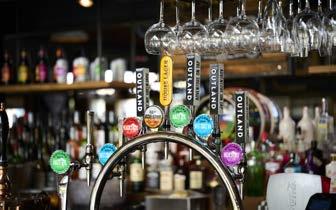
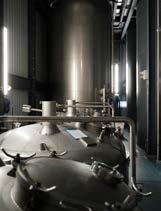
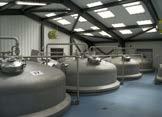
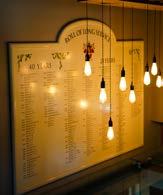
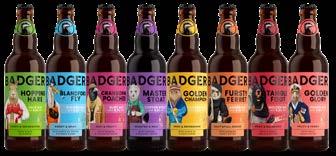

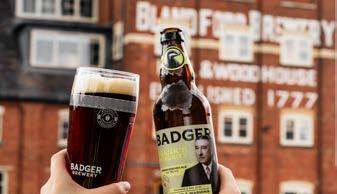
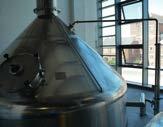
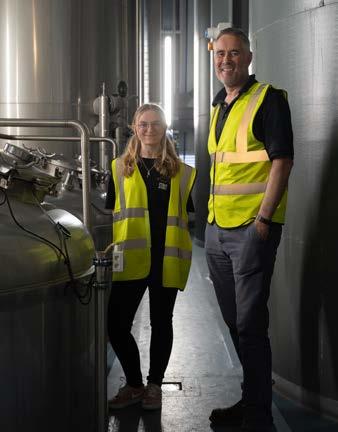
was a way to “democratise craft beer and ultimately bring more drinkers, both from premium bottled ales (PBA) and lager, into the craft sector”.
Mountford joined Hall & Woodhouse in 2021 armed with a wealth of experience working for companies such as Jägermeister UK and also customer data firm dunnhumby. He relished the opportunity to launch the Outland range as well as refresh the Badger range of premium bottled ales and cask branding in late 2023. A core focus on both of these projects were increasing the accessibility and visibility of the beers on offer.
“I always think back to the wine revolution that the new world drove some 30 years ago. Prior to this the bottles might mention a little about the terroir or the grape. Often this really didn’t mean anything to most people,” he explains.
“But new world producers came along
and featured ‘sliders’ on their labels that showed flavour profiles that went from sweet to dry, or they included suggested food pairings. These descriptors meant consumers thought ‘oh wow, I can see myself with this wine’ and that’s the approach we adopted to our work on the Badger and Outland branding.”
Mountford adds: “We’ve got the ABV, style and tasting notes, with three or four words, on the front. So when you’re in the white hot crucible of a supermarket beer aisle with a toddler hanging off your legs, and parking running out, you know which beer is for you.
“And if the shopper who’s not the beer drinker goes into a store to buy a box of something like Peroni and that beer is out of stock then as a general rule, they feel comfortable substituting that for another premium European Lager.
“There’s clear category cues, the
brands are big enough and it’s all fairly understandable. Within craft and within bottled ales, if there’s no St Austell Tribute left, or there’s no Fursty Ferret left, the consumer is often not as reassured in choosing a substitute. So that’s why I wanted our branding to be vibrant but also really, really clear. Because that works for the shopper and also for the consumer.”
And reports published earlier this year showed that the company’s rebrand of its premium bottled ales had paid dividends. In the 12 weeks to 29 September 2024, volume sales of Badger PBAs grew by 51.6% compared to the same period in 2023 (Kantar), and against a 10% decline for the overall PBA category.
Over the 12-week period the number of shopping trips where Badger ales were purchased increased by 12%, and consumers bought on average 37% more beer on those trips. The brand also expanded its reach, with 231,000 consumers buying Badger ales - an increase of 10%.
Speaking at the time Mountford said: “Making root and branch changes to a much-loved brand like Badger wasn’t done lightly, but with the PBA category in long-term decline, we felt bold action was needed. The relaunch was anchored in consumer research. They told us the PBA sector was a ‘sea’ of similarlooking, old-fashioned labels without clear taste guidance, so we tackled that head on in the redesign. They also told us authenticity was important, so the characters on the bottles weren’t fabricated for the relaunch, they’ve always been part of the Badger story.
“By giving the beers we make a more contemporary feel, we’ve been able to capture some of the many consumers who drink across both the craft and PBA categories, but we’ve also retained our loyal Badger drinkers, many of whom are now purchasing more of their favourites.
“Although the PBA category overall is still in decline, the growth of Badger within it shows that a new approach can buck the trend. While we’ve seen some commoditisation with the category, we believe there is still value in it, hence our significant investment. If other brewers
now start to evolve their own brands, we could see a renewal of the PBA category.”
Regardless of the beers being marketed, for head brewer Toby Heasman and his team, there are a number of nonnegotiable factors that come into play.
He says: “When you design a new beer it’s got to have enough character to bring somebody in and that character can come through in different ways. It could be a stout that has amazing complexity and balance between the roasted malts. Or it could be a West Coast IPA with a vibrant hop profile. Either way there’s no point in creating a beer that nobody wants to drink.
“And then I think the next part is ensuring that you can reproduce that beer to the highest quality all of the time. People only remember the last beer that they had. So if the quality is not there, then eventually that consistency is not there and as a result you will soon get found out. The best breweries produce quality beers on a consistent basis.
“Finally, when it comes to developing new beers you need to have fun as well. When you’re having fun you often create the best beers. If new beers aren’t achieving anything then I think you’ll find
I wanted our branding to be vibrant but also really, really clear,” Giles Mountford, Hall & Woodhouse
that the consumer will let you know, and that’ll happen sooner rather than later.”
And as Hall & Woodhouse approaches its 250th anniversary, taking place in 2027, Heasman will soon celebrate his own landmark with 20 years at the business. But as the brewing guardian of such a well-known institution, it’s something he continues to take in his stride.
“You always try and put it to the back of your mind. But at the same time it is hard really, isn’t it? Because sometimes you feel that pressure but equally, that’s
also when you can produce great beers. You’ve just got to try and be the best that you can be,” he explains.
“Being part of Hall & Woohdhouse brings with it some expectation. Building the new brewery bought with it some expectation. And then as the markets change, you have to adapt and make decisions to ensure you get things right. Thankfully I think we do that well here.”
Heasman adds: “I still get a buzz when I walk into to one of our public houses and the beers are on. And I still get that buzz if someone working at one of the public houses wants to talk to me about one of the beers or perhaps they want to discuss something related to training.
“And only recently we have just developed a new Session IPA for our Outland range. I still got that buzz after working with the team throughout the process and you get to that point where there’s a consensus and you all know that you’re nearly there in creating the beer that you all have in mind.
“So yes, I still have that passion for being a brewer and the enthusiasm that comes when helping produce beers that people thankfully enjoy. That desire hasn’t gone anywhere and it isn’t going anywhere anytime soon, either”
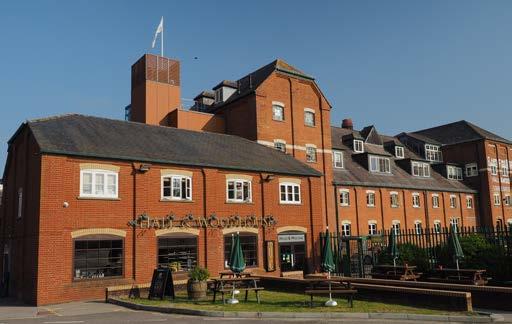




AGAINST A BACKDROP OF AN EVOLVING AND MATURING BEER INDUSTRY, THE HOP SECTOR THAT PLAYS AN ESSENTIAL ROLE IN THIS ECOSYSTEM IS ALSO ADAPTING. IN THIS PART OF THE BREWERS JOURNAL WE SHARE INDUSTRY INSIGHT AND EXPERTISE FROM THE FIELD, AND ALSO OUTLINE WHY IT MATTERS TO YOU.
With a changing and maturing brewing industry across the globe, there was also confirmation of structural change in the hop industry earlier this summer, too. Falling acreage, which was also accompanied by market oversupply, revelead that world hop acreage dipped for the third year in succession. This equated to a drop of 7.7 percent from 2023 to 2024 alone to stand at 55,715 hectares. These figures formed part of a report from the leading hop supplier BarthHaas.
The report revealed that Germany returned to top place among the hopgrowing countries as a result of acreage adjustments being delayed due to existing forward contracts. Last year, in 2024, German acreage was reduced by only 1.6 percent, while the reduction continued in 2025 by a further seven percent to a total of 18.962 hectares.
According to the BarthHaas Report 2024/2025, the USA witnessed a largescale “idling of acreage” that amounted to almost 18 percent. This brought the total there down to 18,513 hectares in 2024 while the Czech Republic remained in distant 3rd, with 4,845 hectares.
In the U.S., the 2024 harvest reflected something of a reset. Hop Growers of America reports U.S. acreage has fallen roughly 29% since its 2021 peak, with 2024 yields described as “good,” yet alpha remaining more than ample for the ninth consecutive year. That dynamic,
steady output against reduced acres, keeps pressure on aroma varieties that drove the last decade’s IPA boom. Back in Europe there is a related story with somethng of a regional nuance. As the BarthHaas report revealed, Germany entered 2025 with acreage down and expectations tempered after recent weather variability.
While in-season updates were cautiously optimistic on aroma yields and average alpha in 2024, medium-term research warns that a warming climate is likely to reduce both yields and alpha content in European hops without adaptation.
According to the recent report, there was also a decline in global crop volume in 2024, albeit to a lesser extent, by 3.9 percent to 113,538 mt. However, they explained,the alpha acid content in the hops increased slightly, by 1.0 percent to 11,912 mt.
“Last year’s global average was 10.5 percent, compared with the previous year’s 10.0 percent. As was the case in 2023, the ratio of aroma hops to bitter hops shifted in favor of bitter hops again in 2024 in terms of both crop and alpha yield,” they said in a statement.
These market changes also impacted the number of hop growers and in Germany alone, a further 31 hop growers discontinued production. According to BarthHaas, the average planted acreage of the remaining 1,009 farms rose by 0.3 hectares to 20.1 hectares in crop year 2024. However, they added, that does not
mark the end of the change process. “The market remains structurally oversupplied and the hop industry is struggling to cope with surpluses that have largely been forward-contracted, but have not been used,” explains Heinrich Meier, author of the BarthHaas Report. “Further acreage reduction is therefore essential if the market is to return to equilibrium.”
The changing demand for hops however can be traced to changes in the beer market worldwide. “The trend toward mainstream beers and alcohol-free and low-alcohol variants continued in 2024 and in fact gained further momentum,” added Thomas Raiser, managing director of BarthHaas. “These beers are generally more lightly hopped.”
The company added that his decline in hop dosage is also evidenced in the craft beer sector. One reason for this is the increased prevelance of hop products as well as a move towards “traditional bottom-fermented beer styles” that require more moderate hop addition. “Aside from the changing trends, other factors are contributing to the fall in hop demand particularly in the traditional beer nations among the western industrialized countries. These include aging populations, competition from a considerably greater variety of beverages, and not least a decline in purchasing power in economically difficult times,” they added.
FROM WHOLE LEAF HOPS TO PELLETS AND FROM HOP BLENDS TO LIQUID HOP PRODUCTS, HERE ARE SOME OF THE LEADING COMPANIES THAT CAN PROVIDE THIS ALL-IMPORTANT INGREDIENT FOR YOUR NEXT BREW.
Charles Farm have been hop suppliers for more than 160 years, so they’ve got a lot of hop history.
Charles Faram Hop Merchants and Factors has one of the largest range of hop varieties available from stock in their temperature-controlled hop storage warehouses in nitrogen-flushed leaf hops, Type 90 (T90) pellets and Type 45 (T45) pellets.
Varieties come from the UK, Belgium, Czech Republic, France, Germany, Poland, Slovenia, New Zealand and the USA. Faram’s provides an artist’s palette of flavours to create every type and style of beer from the traditional varieties to exciting new developmental varieties from Faram’s own breeding and development programme.
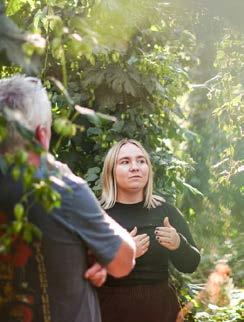
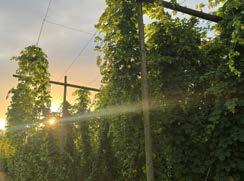
BarthHaas X is a fully integrated part of BarthHaas, the largest supplier of hops and hop products in the world. Because of this, they have the full range of products from a portfolio that offers access to great flavors and aromas often not available from any other supplier. They offer the highest quality through world-leading processing techniques, peace of mind through the BarthHaas guarantee, increased profits and efficiency through our innovative hop products, and world-leading technical and brewing support from their Brewing Solutions team.
When you work with BarthHaas X there are a few key differences in how they operate. These differences are essential to how they support craft and smaller breweries to help your business run smoothly.
Beyond offering you the best hops and hop products, we also offer support and advice. Their team is made up of well-known and respected brewers who do more than sell you hops. They do their best to act as an additional part of your team, with friendly advice and guidance that can help you stay ahead of the curve and manage your hop supply in the best way possible.
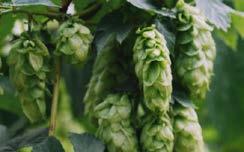
Hukins Hop farm is a 5th generation farm, with family at its heart. For over 100 years we have been growing British hop garlands on the unique ‘terroir’ in the Weald of Kent. Their focus on quality and care for their environment allows their hops to reflect the rich heritage of the Kent countryside. Their varieties include intense apricot from Ernest, oranges from Bullion and the classic English flavours of Fuggle, Golding’s and Challenger amongst others. They also supply ‘green’ fresh hop cones for seasonal green beers during harvest time. They are involved with the innovative farmers scheme trialling sustainable systems in hops, come and see to find out more. They have invested in a modern picking and processing systems to help continually raise their quality. They also work with the British Hop Industry trialling new varieties and working on experimental growing techniques including winter cover cropping and a new growing system.

In 2022, Brewers Select became part of the Loughran family, bringing together a wealth of experience with a common goal to deliver brewers the finest quality ingredients from the world’s best suppliers all under one roof. They’re committed to bringing you not only the very best brewing ingredients but also celebrate the story of your beer from farm to glass. Along the way they want to build the best relationship possible with you, provide the highest level of service, and understand the needs of you and your brewery. And chat beer, because they live for that stuff.
Hop farms they work with include Oregon’s Crosby Hops, who balances profit with purpose, rooted in their core values of quality, innovation, sustainability, and community. And founded by Jim Solberg & Roger Worthington in 2008, Indie Hops embodies the heart and soul of craft beer, intrinsically linked to a cultural movement built around being independent and creative and the need to grow and supply hops to craft beer brewers.
The Spanish Yard work closely with hop growers from León (Spain) and brewers from anywhere, bringing the farm and the brewery closer together. They offering a top quality, certified and traceable natural product that includes Cascade, Nugget, Chinook, Willamette, Alpharoma, Pacific Gem and Magnum.
During the first half of the 20th century the Spanish Civil War and the II World War made it difficult for the Spanish breweries to import German hops. An investigation into medicinal plants found wild hops in abundance on the banks of several rivers in León (northwest Spain). Thus began the history of Hops as the Green Gold of León.The Spanish Yard focus on managing without structures and superfluous expenses to reduce the price while also building long relationships based on trust.
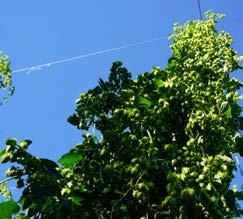
Geterbrewed is the largest homebrew store in the UK & Ireland, offering a vast portfolio of products for those looking to brew at home. Geterbrewed also wholesales ingredients to commercial breweries, distilleries, and cider makers, acting as a true onestop shop and providing high-quality technical support and consultancy for the drinks industry in Ireland. The busines is independently-owned and aims to be a force for good in the industry, resonating with and creating a sense of connection among their team and the end consumer. They pride themselves on their work ethic and family values, acknowledging that each team member plays an integral part in driving business outcomes.
At Geterbrewed you’ll find the best selection of craftbrewery-approved hops for all your homebrewing and microbrewery needs on the Get Er Brewed site. They offer a vast range of hop varieties in various forms, and work directly with suppliers to ensure they have the hops that you need. They source the freshest hops directly from farmers, then store them cold and package them in nitrogen-flushed, resealable bags to lock in maximum freshness, with a range of pack sizes to suit your needs.
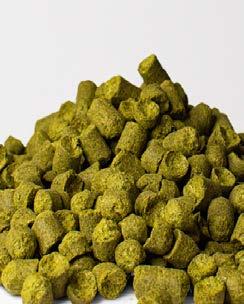
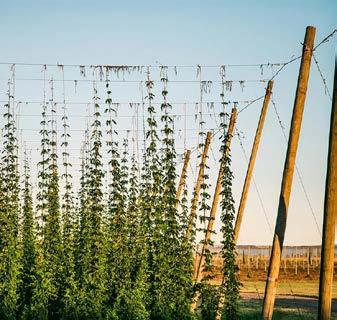
Yakima Chief Hops (YCH), a grower-owned network of family farms and leader in the hop industry committed to sustainability and innovation. Their mission to connect family hop farms with the world’s finest brewers and provide the highest quality hop products. As a 100% grower-owned network of family hop farms, Yakima Chief Hops is uniquely positioned to establish strong relationships between the growers who supply our quality hops and the brewing customers who utilize our products in their beers.
Operating for more than 30 years, they have become more than a hop supplier. They are a resource for brewers, providing solutions-based products and industry leading research. They are advocates of sustainability and meaningful social causes, working to support the environment and communities around us. Through their commitment to continuous improvement, we aim to be leaders of innovation, quality and customer service. Their mission is to connect family hop farms with the world’s finest brewers, providing the highest quality hop products and uncompromising service for the ultimate benefit of our customers, employees and growers. Their vision is to be the global hop supplier of choice.
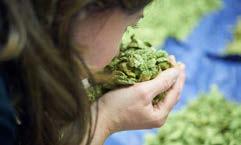
Hopsteiner is a vertically integrated hop grower offering not only their local sustainable hop varieties but also other options from around the world. Their hops are proven to meet or exceed industry standards for exceptional agricultural practices and sustainability. They only source hops that meet their stringent standards for quality. At Hopsteiner, they operate worldwide. Their contracted growers set industry standards for sustainable agricultural practices and hop cultivation. They maintain constant communication with their hop farmers around the globe to ensure the quality and sustainability of their products. They only cultivate and purchase hops that meet Hopsteiner’s stringent quality criteria. Their goal is to maintain & improve their highest standards, to provide brewers with the finest products

At Totally Natural Solutions their ultimate vision is to revolutionise the brewing industry and rid the world of uninspiring beer by empowering master brewers to push the boundaries of what’s possible with their high-quality, natural, and sustainable ingredients. They aim to inspire a new era of brewing excellence that embraces efficiency, consistency, and sustainability as core values while delivering unforgettable stand-out brews that enhance the beer-drinking experience.
When they set up a new liquid hop business, making high-value natural extracts for craft brewers, people thought they were crazy. At that time, they saw that craft brewing would need high-quality hops in liquid form to improve its consistency, its flexibility and ultimately become a serious competitive force in brewing. Their HopInspiration range has since become a go-to for brewers globally looking for quality, technical support and fun in creating the very best craft beer.
The Malt Miller was established in 2010 by Rob Neale, driven by his discovery of the joy of homebrewing beer. Rob’s passion for brewing the best beer at home and sourcing the finest ingredients directly from suppliers led to the founding of the business. This passion for freshness and high-quality ingredients, along with a commitment to serving the creative and enthusiastic homebrewing community, are the cornerstones of the business today.
They continuously seek out the best items to stock, provide insightful and educational content, and ensure timely delivery of orders. As a business that prioritises people—both customers and team members—they want to give you a little insight into the awesome people behind each and every order you place.
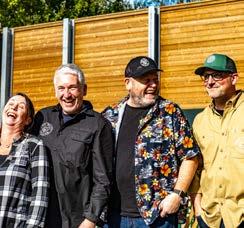



Liquid hop aroma products are far from a new development. Back in 2016, when Elusive started, the perpetually in demand modern hop varieties such as Citra and Mosaic were not available on the spot market, so we turned to Barth Haas’ PHA products to help add those top notes to some of our early brews.
This helped stretch the small quantity of those desirable varieties we could get our hands on a little bit further and also set us down a path of experimenting with less in demand varieties, soon discovering that blending hops could produce an aroma greater than the sum of its parts.
Over the past 3-5 years, liquid hop products have been a key area of innovation within the industry, driven by a demand for ever more intense aroma and flavour with a keen eye on hot and cold side yield. In a modern craft brewing landscape where consumers demand high levels of hop impact, packaged yields are going down and per-litre production costs are going up.
At Elusive, the style of beers we brew are hop forward but not often intensely so by modern standards. Our best seller Oregon Trail is hopped at around the equivalent of 13g/L (grams per litre), split evenly across hot and cold side additions. Over the past 18 months, we have experimented with just about every liquid hop product on the market, with
two aims: 1) explore how much hot side intensity we could impart into our West Coast-style IPAs and Pale Ales without access to anything other than a very rudimentary whirlpool and 2) increase the packaged yield to deliver as high a sales margin as possible from each gyle. Whilst we are able to liquor back and fill fermentors to the brim with the aid of a hop-derived antifoam, reducing solid matter in the form of dry hop additions without compromising on aroma or depth of flavour was key to help us package more beer from the same tanks. Focusing first on the hot side, there are several hop varietal specific products
designed for use in the kettle or whirlpool, fully or partially replacing the use of whole cone or pellet hops in this application.
These include Barth Haas (Haas) Incognito, Totally Natural Solutions (TNS) HopGain Floe and Yakima Chief Hops (YCH) Dynaboost. Their specific production methods are proprietary but involve CO2 extraction of volatile aroma oils into a substance that has varying degrees of flowability across each product. The liquids are supplied in 1-2Kg tubs and the suppliers claim each kilogram is the equivalent to using 6Kg (Haas) and 10Kg (YCH) of T90 pellets. TNS suggests an initial dosing of 1/10th the weight of T90 but doesn’t state an equivalent weight as the oil content has been standardised, so this will vary depending on the hop variety.
In the last threefive years liquid hop products have been a key area of innovation driven by demand for ever more intense aroma and flavour,” Andy Parker,
All three suppliers advise that the product is best dissolved into hot wort and whirpooling is recommended to ensure a good mix. We found the TNS product was flowable enough to pour directly into the copper from the fridge but the YCH and especially the Haas products became more flowable having been warmed slightly. If increasing hot side yield is your aim, these products can be helpful –especially if you’re using whole cone hot side, as losses caused by doing so can be significant. Whole cone hops can hang onto as much as 5 litres of wort per
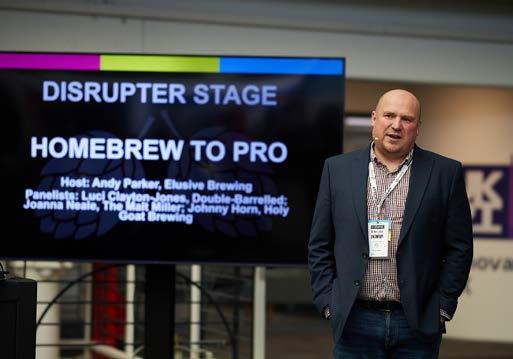
kilogram added, five times the volume that pellet slurry will absorb.
To get the most out of these products, it’s recommended to whirlpool for a sufficient amount of time and with sufficient velocity to fully dissolve them. We found in practical use that all left a degree of oily residue in the kettle –nothing that couldn’t be shifted through CIP or a bit of elbow grease.
As well as aroma oils, Incognito and Dynaboost contain a high concentration of alpha acids, so wort temperature is also a consideration if the aim is to minimise isomerisation and bitterness. TNS have stripped the alpha acids from HopGain Floe, so this can be added directly post boil.
We’ve had good success with these whirlpool products but perhaps the best results, given our lack of vigorous whirlpool, have been from using them via a ‘hop dipping’ method whereby they are dissolved in a jug with hot wort and a small amount of pellets, then dosed
We’ve had the best results from a sensory perspective when replacing between 25% and 50% of the equivalent T90 addition with liquid products,” Andy Parker, Elusive Brewing
straight into the fermentor at the start of transfer, with the initial wort being cast in hot before the temperature is reduced as transfer progresses until pitching temperature is reached.
This method ensures good even mixing and prolonged contact time during active fermentation. For us, cleaning was also more efficient as our Unitanks are much easier to clean via CIP than our kettle.
Our own trials suggested that, using this method, we ended up with more flavour and aroma being present post fermentation (before dry hopping) when using all liquid – or a mix of liquid and whole cone – than we did from just using whole cone at equivalent weights.
Moving onto products aimed at cold side additions, Haas (Spectrum), TNS (HopBurst) and YCH (Hyperboost) all have varietal specific offerings and these are joined by products from FreeStyle Hops (SubZero Hop Kief) and Abstrax (Quantum Series – available from Charles Faram), to create quite the choice for the
brewer. The intensity of these products by volume varies across the board, so it’s recommended to refer to their datasheets for dosing advice.
Haas recommends that Spectrum, which is more viscous than other products in this class, is added a few points off final gravity so that the active fermentation naturally mixes it into the near finished beer. Other products can easily be dosed post-fermentation.
The key is getting them dispersed well to maximise the aroma gained and ensuring that dosing is optimised to achieve the required intensity. We’ve found that adding them along with the auxiliary finings works well followed by rousing, with the tank temperature reduced and yeast and dry hop matter already dropped out.
We’ve had the best results from a sensory perspective when replacing between 25% and 50% of the equivalent T90 addition with liquid products.
However, we did try brewing a beer that used 100% liquid hop products, in collaboration with TNS, and both our own sensory and consumer feedback was positive. There’s likely a trade-off between true-to-type sensory results and yield here, however. It’s clear that the continued innovation in this space has delivered brewers more tools to play with when it comes to designing and optimising beers from a sensory and yield perspective.
In our case, we’ve been able to achieve very positive results in terms of finished beer quality whilst increasing packaged yield, significantly so when using these liquid products in combination with super-concentrated hop pellet products such as Crosby Hops CGX, Haas LupoMAX or YCH Cryo Hops in a blend with T90 pellets.
On completion of our project to optimise yield, we’re now packaging an extra three 30L kegs of Oregon Trail per 17HL batch, with no negative sensory impact.
The associated extra revenue per batch more than offsets the increased cost of ingredients too, so it’s actually costing us less per litre to produce in real terms.
Andy Parker is owner and head brewer at award-winning Berkshire-based Elusive Brewing and was named the British Guild of Beer Writers Brewer of the Year in 2022. He co-authored CAMRA’s Essential Home Brewing book and champions the vibrant British homebrewing scene from where his love of beer and brewing developed.
Last September, his latest book The Modern Homebrewer was published. Co-authored with Jamil Zainasheff, it’s a hands-on, practical guide to the most modern and up-to-date home brewing ingredients, equipment, and processes. The book equips both novices and the most experienced brewers with the skills they need to produce professional quality beer at home.

No matter the complexity of your project, NIRAS is here to provide you with resilient solutions and, robust project management processes.
From master planning to design, construction, and compliance, our multi disciplined team of experts delivers tailored, end-to-end solutions for the brewing and beverage industry.
Choose NIRAS as your trusted partner to keep your business competitive and build a sustainable future.
Proud to sponsor the CIBD Sustainabilty event in July See you there!
Offices in Burton, Ascot, Edinburgh, Manchester, Leeds & Holbeach. If you would like to chat to our team email: contactuk@niras.com
Scan to read our latest brewing report
UP TO 80% OF YOUR HOP OILS, PARTICULARLY ΒBETA-MYRCENE, MAY BE LOST DURING DRY HOPPING DUE TO POOR SOLUBILITY AND RE-ABSORPTION. HOWEVER, WITH SMARTER PRACTICES, YOU CAN RETAIN FAR MORE OF THAT AROMA EXPLAINS FRANCESCO LO BUE, AN AGRONOMIST SPECIALISED IN HOPS AROMATIC COMPOUNDS AND A BREWER
eta-myrcene is a monoterpene hydrocarbon, chemically related to compounds found in mango, basil, and cannabis, which share its earthy, dank, or fruity tones. However, because it’s volatile, water-insoluble and has a relatively high flavour threshold (~350 µg/L), its impact depends on how much makes it into the finished beer. The brewers’ goal is to optimise dryhopping to capture as much of this hop oil as possible, balancing process factors like hop variety, temperature, contact time, alcohol content and hop type. Hop essential oils are complex (≈1000 compounds) but are often divided into hydrocarbon fraction such as monoterpenes like β-myrcene, sesquiterpenes and oxygenated aromatics like terpene alcohols and esters.
Hydrocarbons dominate by volume, but their hydrophobicity means they transfer poorly into beer. For example, after 24 h dry hopping, only 33–51% of the hops’ total oil had left the hops, and nearly all of that was oxygenated oil (i.e. linalool), whereas βBeta-myrcene and other hydrocarbons were largely retained in the spent hops Salamon et al. (2022). In practical terms, this means polar aromatics dissolve readily, but βBetamyrcene often stays on the plant material or escapes to the air.
Even with optimised dry-hopping, studies show only a small fraction of the hops’ β-myrcene dissolves. Salamon et al. (2022) directly measured βBeta-myrcene in beer during dry hopping. Using grinded pellet hops blended into fermenting beer, they found β-myrcene peaked at 301 μg/L after ~34 h, then slowly settled to ~215 μg/L by ~44 h.
Critically, this represented only 8% dissolution efficiency (fraction of hop oil recovered) at its maximum. What’s very interesting and concerning is that the spent hops still contained the majority of their volatiles after dry hopping – up to 50–80% of hop acids and 70–80% of hydrocarbons remained unused. Measured concentrations peaked after ~34 h, indicating that longer contact can even decrease βBeta-myrcene, suggesting hydrophobic compounds can re-bind to spent hops over time.
Hydrocarbon terpenes (including myrcene) peak at 3–6 h and then decline over 24 h when agitating the beer in a pressurised tank. High dry-hopping rates in dynamic tests show myrcene hits its maximum by 3–6 h at 20 °C and then falls off. Thus, contrary to practices of multiple-day dry-hops, current evidence suggests 24–36 h is usually enough to saturate β-myrcene extraction.
Temperature and agitation: Higher fermentation or conditioning temperatures (≥15–20 °C) dramatically speed Betaβ-myrcene release, as higher diffusion and solubility occur.| However, warmer temperatures also increase losses, showing significantly more βBetaβ-myrcene evaporates with CO₂ at 22 °C than at 8 °C.
Contact time is important here: As noted, hydrocarbon terpenes extract rapidly and then level off or decline. I would recommend relatively short dry-hops for volatile aroma not exceeding 48 hours, and in case of a dry-hopping system that allows higher contact surface than the most common methods, then 24 hours is enough for this.
Alcohol content: Ethanol greatly enhances hop oil solubility and in practice, the typical 5–8% range of beer ABV is more than enough to dissolve all extractable myrcene from dry hops.
Hop form and variety: Hop variety and pellet processing set the potential; a high-myrcene hop (like Citra, with ~40–70% of its oil as myrcene) will release more myrcene than a low-myrcene variety but even pellet grade matters, a Hallertau Tradition T45 pellet contains ~60% more Betaβ-myrcene than the traditional T90 pellet. Hop dose: More hops mean more aroma up to a point, but with diminishing returns. Dry-hop
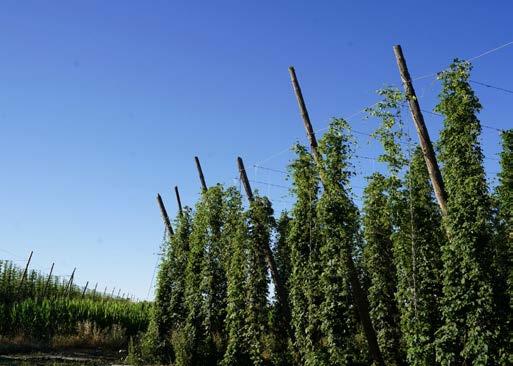
extractions are nonlinear: doubling the hop dose will not double the beer’s aroma. Each incremental amount of hops yields less new flavour because the beer can only absorb a finite amount of oil and more hops can also re-adsorb volatiles.
Based on the information provided, brewers can adopt these guidelines to maximise βBeta-myrcene aroma: You should use high-oil pellets when brewing: Select hop varieties known for high βBeta-myrcene (i.e. Citra, Mosaic and Simcoe) and consider enriched pellet types to maximise oil content.
You should also maximise the contact surface: Consider bubbling CO2, recirculation or mixing in an external vessel hops and part of your beer before reintroducing it in the origin tank.
Another guideline is to optimise contact time: Plan for 24-48 hours of contact. Many key terpenes are extracted in the first 12–24 h; beyond ~36-48 h, gains
are minimal You should also control temperature: Dry hop at cool-tomoderate temperatures (i.e. 12–18 °C) to balance extraction rate against losses. If speed is needed, one can increase the temperature briefly, but then reduce contact time before extensive evaporation.
Up to 80% of your hop oils, particularly βBeta-myrcene, may be lost during dry hopping due to poor solubility and re-adsorption. However, with smarter practices, you can retain far more of that aroma.
Francesco Lo Bue is an agronomist with a degree in food technology, specialised in Hops Aromatic Compounds. He is also a brewer with 10 years of experience working in craft breweries in Europe and the UK such as Beavertown where he held the roles of senior and production brewer.
The brewers’ goal is to optimise dry-hopping to capture as much of this hop oil as possible, balancing process factors like hop variety, temperature, contact time, alcohol content and hop type,” Francesco Lo Bue
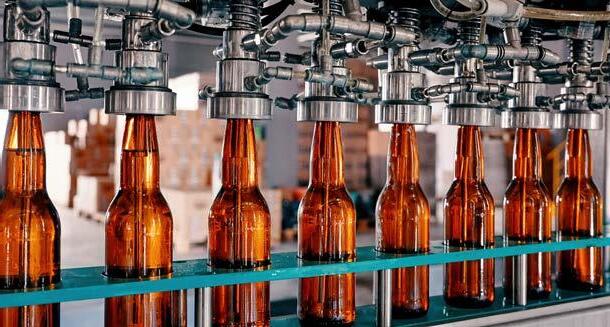
Wastewater and trade effluent requirements can be complex. Our dedicated, expert trade effluent team has the experience and technology required to understand it like no one else - and we make the process simple.
Our job is to let you get on with yours. One simple bill for all your water, wastewater and trade effluent means you can spend more time where you’re needed most.
Water services to help your business flow
• Smooth switching process
• Expert trade effluent support
• Wastewater treatment services tailored for breweries
• Award-winning customer service
• One simple bill
• Easy ways to manage your account online
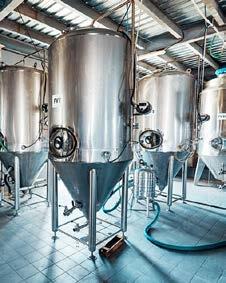
Visit castlewater.co.uk/switch to get an instant


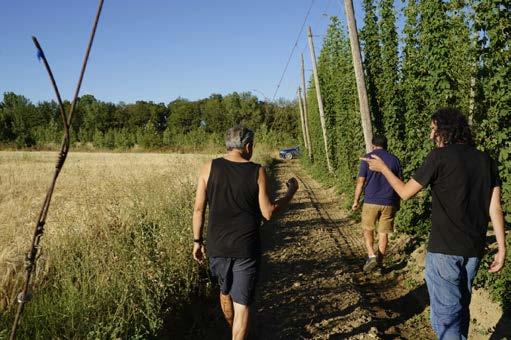
THE HISTORY OF HOPS AND LEÓN IN NORTH-WEST SPAIN ARE INTERTWINED. HERE ÓSCAR GRANDE CRISTÓBAL CO-FOUNDER OF THE SPANISH YARD, EXPLAINS HOW BREWERS CAN BENEFIT FROM UTILISING SOME OF THE DIVERSE HOP VARIETIES GROWN IN THIS PART OF EUROPE.
During the first half of the 20th century, Spain imported hops from Germany. But the outbreak of the Spanish Civil War and the Second World War made it impossible to continue importing hops. As a result, hop cultivation in Spain was promoted through the creation of several Hop Development Societies. At that time, during research on medicinal plants, wild hops were found in abundance along the banks of two rivers
in León, the Órbigo and the Tuerto. In 1945, the León Hop Development Society was established, initiating systematic hop cultivation in the region. Today, León produces ~1,000,000 kg annually, representing 95% of Spain’s total hop harvest, making Spain the fifth-largest producer in the EU.
Most León hop farms are small, family-operated holdings (often 3rd–4th generation). There are several advantages for brewers as a result such
as precision disease monitoring with reduced pesticide residues, minimising chlorophenol and sulfur off-flavour risks.
With precision harvest timing there is the ability to target oil and acid peaks within 48–72 hour optimal windows. While identity and traceability is important as products can be developed with controlled origin, even labelled by individual farms or growers. Additionally there is flexibility for trial plots allowing for a rapid adaptation to market trends.
The valleys of the Órbigo and Tuerto rivers in León are particularly suitable for hop cultivation thanks to a combination of climatic, soil and water-related factors.
Hops require many hours of daylight for growth, particularly between April and August. This region enjoys ~15.25 h at summer solstice, sufficient for peak photosynthetic activity and terpene biosynthesis. Situated at a moderate altitude of around 800 metres, the region experiences a wide temperature range (28–30 °C during the day and 10–12 °C at night), which favours the retention of monoterpenes such as linalool and geraniol, essential for aroma stability during both storage and brewing. High sunlight intensity further stimulates lupulin gland development, directly impacting alpha-acid levels.
Hops require deep, well-aerated soils with good drainage and high organic matter content. The fluvial soils in these valleys (formed by river sediments, light yet rich) support deep rooting and uniform moisture distribution. pH is neutral to slightly alkaline, optimum for humulone biosynthesis.
Spain has one of the highest numbers of reservoirs per land area in the world (over 1,200 reservoirs), with a total storage capacity of around 56,000 cubic hectometres of water. Irrigation Communities (farmer associations that collectively and efficiently manage water use) are key players in agricultural water management. Reservoir water and collective irrigation communities ensure stable cone development, reducing seasonal oil and alpha-acid variability.
But before we go on, let’s compare how León’s climate compares with other regions using Cascade as an example. In the Pacific North West (USA) it has 16 hours of daylight and a warm summer dominant climate. Its soil type is River loam and the aroma from Cascade that is grapefruit and floral.
In England there is 16.5 hours of daylight, a mild summer climate and a soil type
that is limestone rich. The aromas are tea-like, citrus and pine. In Germany, there is 16 hours of daylight, a mild summer climate while soil type is clay/ sand neutral. When it comes to aromas there are noble and neutral.
And in Spain, there are 15.25 hours of daylight, a dominant hot summer climate. The soil type is sandy loam while the aromas are of bitter orange and also of tangerine.
Aroma Retention: Spanish Cascade’s high limonene + Betaβ-myrcene ratio yields bold citrus peel character but is prone to oxidation; best used in late hop or DH to minimise volatilisation loss.
Thiols & Climate: Warm Mediterranean maturation favours precursor accumulation over free thiols, pairing with thiol-active yeast (or mash hopping) unlocks tropical passionfruit notes.
Harvest Timing Impact: Studies show lateharvest hops in León have +28% -acids and +30% oil content, correlating with more intense late-hop aroma.
Hop Creep Consideration: High-oil Spanish-grown hops may also exhibit greater enzymatic potential; brewers should monitor VDK and gravity post-DH.
While Nugget dominates due to industrial brewery demand, León also cultivates US-origin hops like Cascade, Chinook, Centennial, Columbus, Summit, Cashmere, Willamette. They offer NZ-origin Pacific Gem, Rakau, Wakatu, European origin Admiral, Magnum, Perle as well ass specialty hop varieties that include Sorachi Ace and Vista.
Laboratory analyses and sensory studies show that León-grown hops often exhibit higher total oil content compared
Right: In León, which is located in NorthWest Spain, you will find a diverse range of hops being grown. In the 2024 harvest these range from Cascade, Nugget and Chinook to other varietals that include Willamette, Alpharoma, Pacific Gem and Magnum.
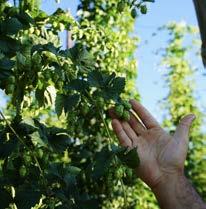
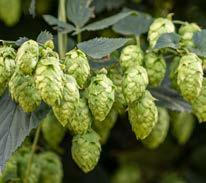

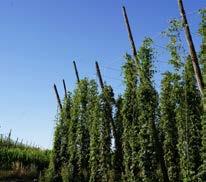
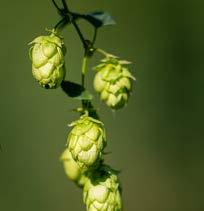
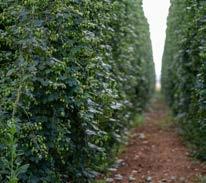
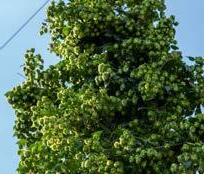
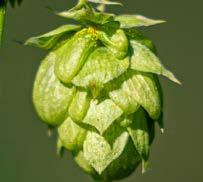
to the same cultivars from cooler climates, particularly in βbeta-myrcene and limonene, but also with notable thiol precursor retention due to the Mediterranean ripening period.
With Cascade (SP) it has key oils (mg/100g) of Myrcene 50–60 and Limonene 10–15. The dominant sensory here is bitter orange, tangerine and floral. There is a moderate (3MH) Thiol potential while it’s important to note that later-harvested lots excel in NEIPA dry-hopping for citrus top notes. For Chinook there are key oils (mg/100g) of Myrcene 45–55 and Beta-Pinene 5–8. The dominant sensory is pine, spicy, grapefruit while Thiol potential is low. Its ideal for kettle/whirlpool in West Coast IPAs for resinous backbone.
Centennial has key oils (mg/100g) of Myrcene 40–50 and Linalool 8–10 with sensory of Lemon zest and floral. Thiol potential is moderate and it’s a suitable strong late-hop/flavour addition with good survivable compound retention. With Nugget there are key oils (mg/100g) of Humulene 20–25 and Caryophyllene 8–10. Dominant sensory is herbal and woody, there is low thiol potential while the hop is a bittering workhorse; as later harvest raises cohumulone, intensifying perceived bitterness.
Finally we come to Pacific Gem that has key oils (mg/100g) of Myrcene 35–40 and Selinene 12–14. The dominant sensory is blackberry, oak, spice. Thiol potential is high (4MMP) so it’s good for tropical thiol–driven IPAs with thiol-active yeast.
The main challenge for Spanish hops is low international recognition despite a EU top-5 production ranking. León has to integrate local supply chains into a globalised brewing ingredients market and to consolidate its position
as a benchmark in innovation and as a generator of cross-industry collaborations.
The revival of the craft beer movement in Europe has created a chance to enhance the value of León hops by aligning them with the needs of the expanding craft brewing sector.
So some of the clearest opportunities that lie ahead are sensory trials and CO2 extract development for export markets. Also a point that is important to consider is linking hop chemistry data such as oil fractions, thiol potential, and survivable compounds with sensory case studies for each variety. And finally, we see a real benefit in the increased collaboration with craft brewers to produce terroirfocused single-hop releases.
The valleys of the Órbigo and Tuerto rivers in León are particularly suitable for hop cultivation,” Óscar Grande Cristóbal, The Spanish

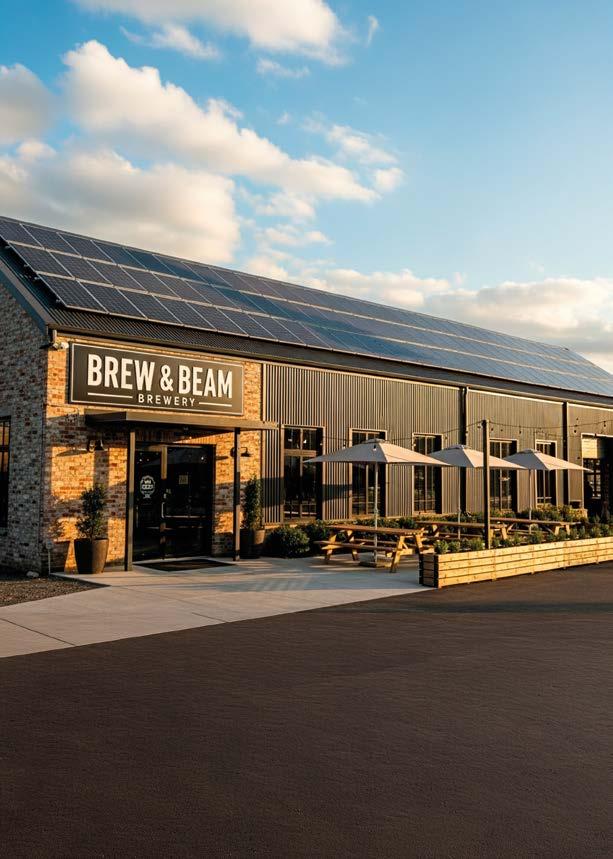
Tel: 0800 0141 868
Email: andy@greencapenergy.co.uk
Turn your brewery roof into your most powerful asset
The cost of energy is volatile, but your running costs don’t have to be. Brewing is an energy-intensive craft, and usually with acres of usable roof space, your brewery is perfectly placed to harness the power of the sun.
A complete solar system from Greencap Energy doesn’t just reduce your carbon footprint—it directly impacts your bottom line.
Your brewery normally has the space. We have the expertise. Let’s future-proof your business.
Ready to see how much you could save?
Contact Greencap Energy for a FREE, no-obligation survey and energy proposal.
SLASH YOUR BILLS: Generate your own free, clean electricity to power your brewhouse, fermentation, and packaging lines. The solar energy you produce is used instantly, cutting your reliance on the grid when you need it most.
FIX YOUR COSTS FOR 25 YEARS: Our solar panels are guaranteed for 25 years. Lock in a portion of your electricity costs for the next quarter-century and insulate your business from unpredictable price hikes.
EARN WHILE YOU BREW: Store excess energy in batteries for use overnight, or sell your surplus power back to the grid to create a new revenue stream. Our hybrid systems even allow you to import cheap offpeak electricity to maximise savings.
S“NICE-TO-HAVE” TO “MUST-CONSIDER” FOR UK BREWERIES.
olar power is nothing new. And in the brewing industry a raft of businesses have invested in and adopted this renewable energy source. The are obvious environmental benefits, but on-site solar delivers tangible commercial value: lower and more predictable operating costs, greater operational resilience, and a brand story that resonates with trade buyers and drinkers alike.
Earlier this summer Oakham Ales celebrated the installation of a rooftop solar PV system by brewing ‘Sun City’, a beer it described as the brewery’s first to be made using solar power. The 3.7% blonde ale featured Nelson Sauvin and Nectaron hops from New Zealand, offering vibrant tropical fruit, gooseberry, and citrus notes with a refreshing herbal finish.
In May, the independent Yorkshire brewery T&R Theakston said it had received funding from North Yorkshire Council for the installation of solar panels to provide energy to the near 200-yearold Masham business.
South facing buildings within the Theakston brewery site in Masham, underwent a transformation, with the addition of 205 solar panels, which will produce circa 25% of the brewery’s annual energy requirement. Theakston’s received funding from the UK Government’s Shared Prosperity Fund (UKSPF), which was administered by North Yorkshire Council.
And last year Hare Brewery, which is owned by St Austell Brewery, outlined how the installation of more than 600
new solar panels meant it was able to generate an additional 230,511kWh electricity per year. As part of an ongoing sustainability programme, these added to the energy the existing solar panels at the site generate, which is the equivalent of powering around 150 homes. Those additions would take up the entire roof space of the brewery’s distribution centre in Warmley, joining an exisiting array of nearly 900 panels and complementing installs at St Austell Brewery’s head office and Cornwall Distribution Centre which is based in St Columb.
But why are so many beer and brewing businesses taking the plunge? Breweries tend to draw power during daylight hours, with brewhouse runs, canning/ bottling, keg cleaning, CIP cycles, and warehouse movements typically peak between 8am and 6pm. Solar output peaks across that same window. This alignment means a high proportion of generated electricity can be consumed on site, maximising savings versus importing from the grid.
Cold stores and fermentation temperature control run continuously, so any daytime solar can meaningfully reduce compressor loads. Even where shift patterns vary, smart controls and minor operational tweaks can lift selfconsumption further.It’s also no surprise that wholesale electricity prices are inherently volatile, and non-commodity costs have trended upwards over time. By generating a portion of demand behind the meter, breweries reduce exposure to both. The economics are straightforward: every kilowatt-hour you don’t buy avoids the energy charge, supplier margin, distribution and transmission charges
And looking from the outside in, retail and hospitality buyers increasingly assess supplier emissions, and many pub groups and supermarkets now ask for credible pathways to reduce Scope 2.
On-site solar is among the most defensible measures you can take: metered, auditable, and physically tied to production. It pairs well with broader decarbonisation steps—high-efficiency refrigeration, heat recovery from wort cooling or refrigeration racks, variable speed drives, LED upgrades, and electrification of process heat where this is feasible.
Every pint brewed with more on-site renewables strengthens your ESG credentials and can influence listings, tenders and export opportunities.
As a result, the benefits extend beyond the balance sheet. Buyers in retail, hospitality and export markets increasingly demand evidence of carbon reduction. On-site solar is measurable, visible and credible—helping breweries demonstrate real progress on emissions. For those with taprooms or visitor centres, showcasing solar production even adds to the customer experience.
In short, solar panels give breweries lower and more predictable energy costs, operational resilience, and a stronger sustainability story.
Over the next few pages we showcase some of the leading names in the solar panel sector and also share some of their expertise on how your brewing business can benefit from this increasingly-popular source of renewable energy.
SOLAR POWER IS AN INCREASINGLY POPULAR OPTION FOR BREWERIES LOOKING TO INVEST IN RENEWABLE ENERGY. HERE ARE SOME LEADING BUSINESSES THAT CAN TAKE YOU ON THAT JOURNEY.
SolarSense is a leading renewable energy company. They are an employee-owned B-Corporation and provide a range of complimentary clean energy solutions that deliver financial savings, carbon reductions and energy independence for clients in all industry sectors. Established in 1995, Solarsense and is responsible for powering some of the UK’s leading organisations. They place great emphasis on the quality of their renewable energy installations and have won more than twenty national awards in recognition of their unparalleled expertise, excellent customer service, as well as pioneering renewable energy projects.

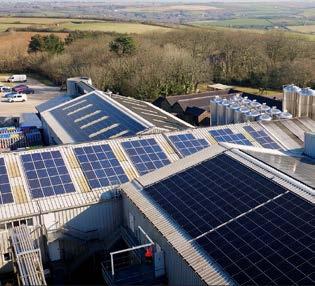
As sponsors of the Sustainability Champion Award, CleanEarth will be exhibiting at Stand 604 at this years Brewers Congress. With a close relationship to the brewing industry, CleanEarth have worked with 15 breweries up and down the UK, including: Wiper and True, Ludlow Brewing Co, and most recently Healey’s Cyder Farm with a 1,224-panel rooftop installation. As leading providers of renewable energy to UK businesses, CleanEarth’s in-house team have been in operation for over 15 years from their offices in Wadebridge, Cornwall. With 800 wind turbine and solar PV installations across the UK, their projects represent a generating capacity of 155 Gigawatts - equivalent to powering 47,000 homes and saving the UK over 50,000 tonnes of carbon emissions every year.
Decarbonisation and low-carbon energy procurement have become core, strategic business concerns. CleanEarth provides the specialist knowledge and technical expertise to help organisations generate their own clean, affordable energy - and, as a result, improve both their bottom line and their carbon footprint.

Titan Eco is a leading installer of solar PV, nattery storage and car charging points. Based in Surrey, their operate nationwide and are able to support homeowners, developers and business leaders. With their expertise, you too can design a solar and storage solution that meets your current and future needs, allowing you to reduce your electricity bills and cut your CO2 emissions. With current high energy prices, a well-designed energy solution can offer a fast return on investment and deliver cost-effective power for years to come. They don’t pressure sell, and never have, instead focusing on giving you great information to help you make the right decision and build the ideal solution that meets your needs.

Energy Oasis is a key choice for renewable energy solutions and energy efficiency expertise across the UK. Based in Harrogate, North Yorkshire, their team has more than 50 years of collective renewable energy experience. The mission is simple - to help businesses, organisations and communities cut energy consumption, costs and carbon, to create an Energy Oasis. Founded in 2013 by Mike Kaye, Energy Oasis began with a vision to transform the way energy is consumed in the UK. A bottom-up approach to Net Zero where the power is in the hands of the people that rely on the energy. 11 years later, that vision is becoming a reality as we deliver innovative and comprehensive energy solutions nationwide. They believe that everyone should benefit from a smarter, greener energy strategy—whether you’re a small business, a large organisation, or a community group. At Energy Oasis, they aim to lead the transformation in energy consumption across the UK.
Industrial buildings are ideal for the installation of Solar PV arrays as they often have large unused roof areas as well as high energy usage for industrial processing. A lot of the properties will be operating during daylight hours and so the savings can make a huge impact on the cost of running the premises. Greencap Energy can design, supply and install complete systems that can be used to reduce CO2 emission figures and provide long term, low cost fixed price energy for the business in the future. If the inital cost is outside the scope of your cash flow, financing can in most cases be arranged. This is done by means of a Power Purchase Agreement (PPA) It means that you are able to fix the cost of a good percentage of your electricity for upwards of 25 years.

Unencumbered by the restrictive process and systems of large-scale energy brokers, Enexus provide a simple, agile approach to enhancing and optimising your energy. They appoint a specialised energy consultant with over 10 years’ industry experience as your account manager. Their role is to become your energy partner, and gain an in-depth understanding of your unique operations in order to develop procurement and energy saving strategies that meet and exceed your unique business goals.
As well as supporting you with the day-today queries and supplier management, their expert energy consultants routinely assess your usage, consumption, and waste, looking for new opportunities to ultimately help you spend less on business energy and work towards your key business goals. They understand every business is unique, therefore their energy consultants take the time to understand how your business works to secure an energy contract that suits your requirements.

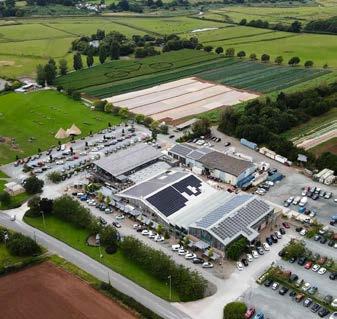
Sungift Solar’s mission is to allow you to live a low carbon lifestyle. And, they like to lead by example. They’re driven by the need to make this planet a better place, and feel a moral duty to do what they can to avert the danger of climate change. They have a fleet of electric and hybrid cars and their headquarters are, of course, powered solely by renewable energy. They’re always looking to engage with their community and share their expertise through attending talks and events. They offer talks including CPD for local groups and businesses, so if you are interested in this just get in touch. They work to do this through designing and installing the best bespoke clean energy solutions, including solar PV, battery storage, and EV charging. They’ve deployed solar solutions across the breadth of the UK making them perfect partners for organisations who are aiming to control their energy across their entire propety portfolio. They bring their top-tier expertise and industry-leading installation standards to businesses nationwide, ensuring that no matter where your business is located, you can benefit from their tailored solar consultation, design and installation services.

Electron Green creates unique partnerships to build solutions – from setting strategy and project management through to wholly financing, installing and optimising solar energy on commercial and industrial rooftops across the business landscape. Creating low-cost, zero carbon electricity is a strategic, global priority. All businesses are stakeholders in thinking and acting faster to save money and protect our environment. So convinced are they of the need for change that they are investing up to £1 billion into free solar systems for the C&I sector. The Electron Green team has led the market for tackling carbon emissions for over three decades – from creating the CarbonNeutral brand in the early 1990s, to inventing the first air space leases with HomeSun and installing free solar PV. They are now on a mission to cut energy prices and carbon emissions through a new and unique solar electricity partnership.

Sustainable Energy First is an energy and sustainability consultancy, founded in 1997 to solve energy management problems in very large, complex commercial estates. This remains the core of their business driven by a commitment to sustainability and the goal of reducing their clients’ carbon footprint.
In 2022 BiU evolved into Sustainable Energy First, reflecting their renewed focus on supporting British business to achieve a positive climate impact. They apply their talent and technology towards improving your organisation’s sustainability performance in three specific areas: economic, environmental and social. Their sustainable energy first approach turns enriched full scope data and insights, into sustainable projects and services to decarbonise business, and create a sustainable future for your business.
Good Energy was founded 25 years ago to give people a way to be part of a practical solution to climate change. In that time, they’ve grown from focusing on supplying 100% renewable electricity from independent generators, to also providing access to services such as solar panel and heat pump installation.
As Good Energy they also remain committed to being a genuinely green energy company that is always ready to innovate and support their customers to achieve their sustainability goals. Their ambition is to help one million homes and businesses cut carbon from their energy and transport.

SOLAR PV COMBINED WITH BATTERY STORAGE IS AN INVESTMENT, CUTTING COSTS, INCREASING RESILIENCE, AND ALIGNING WITH CUSTOMER VALUES, EXPLAINS ANDY POWELL FROM GREEN CAP ENERGY.
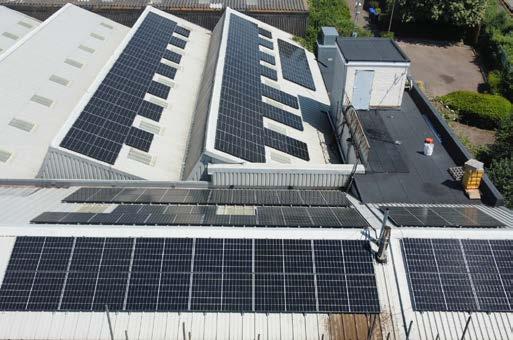
Solar energy is the most abundant resource available to us. In one hour more energy falls on the earth from sunlight than is used by the entire global population in one year. A solar system helps you to harness some of this energy. This can dramatically cut electricity bills but ultimately it is down to the occupier of the property to learn how to make best use of the generated electricity.
For instance, using appliances like dishwashers and washing machines
during the day will utilise the renewable energy which is generated during daylight hours, and spreading your use of large appliances over daylight hours will help to avoid peaks of demand that exceed the capacity of your solar panels.
Breweries are among some of the most energy-intensive commercial operations, using electricity for everything from mashing and boiling to cooling and fermentation.
Installing a solar PV system helps tackle this energy challenge headon, with big
wins for sustainability, resilience, and your bottom line.
Firstly let’s look at why Solar photovoltaics (PV) makes sense for breweries. Abundant rooftop space means powerful clean energy. Most breweries have large flat roofs—ideal for hosting substantial solar arrays. These systems can generate a significant chunk of daily electricity, especially during peak daylight hours.
Lower running costs, faster payback
With solar equipment costs falling by 90% since 2011, breweries are seeing
payback periods drop to roughly three to four years in some UK cases.
Now let’s look at why batteries area game changer. Breweries don’t just use power during the day—great brewing often happens overnight. That’s where battery storage becomes essential.
They bridge the sun-to-beer gap. Excess electricity generated can be stored in batteries and used later during night shifts or early morning brew, exactly when solar isn’t producing. They also slash demand charges. Charging batteries overnight on lower tariffs and discharging during daytime peaks can significantly reduce costly utility charges.
They boost resilience. In the event of outages, some breweries can continue to run critical systems off there solar and battery storage. It’s also worth considering on streamlined integration With smart inverters and energy management systems, batteries intuitively balance solar, storage, and grid
input—no manual tweaking needed.
Here are some ways your brewery can get started in the world of solar and battery integration. First, do an energy audit. Map your hourly energy use, especially overnight, to properly size the needed solar array.
Design for your demand profile by matching system output and battery capacity to your most intensive production times. What is also important is exploring funding and incentives by looking into government grants and other funding options.
Finally, communicate with your solar PV installer. Have them help you set up the monitoring on the system so you can get the most out your system by setting up automated battery charging.
Industrial buildings are ideal for the installation of Solar PV arrays as they often have large unused roof areas as well as high energy usage for industrial
processing. A lot of the properties will be operating during daylight hours and so the savings can make a huge impact on the cost of running the premises.
We can design, supply and install complete systems that can be used to reduce CO2 emission figures and provide long term, low cost fixed price energy for the business in the future.
If the inital cost is outside the scope of your cash flow, financing can in most cases be arranged. This is done by means of a Power Purchase Agreement (PPA) It means that you are able to fix the cost of a good percentage of your electricity for upwards of 25 years.
For breweries, solar PV combined with battery storage is a strategic investment—cutting costs, increasing resilience, and aligning with customer values. Whether your operation is micro or regional, this clean-energy setup can power both your brewing tanks and your sustainability ambitions.

A yeast that has evolved to work well with high-protein wheat-derived worts. FERMOALE Weiss is ideal to produce traditional German beer styles, from Hefeweizen, Dunkel Weizen and Weizenbock style beers to lighter styles such as Kristal Weizen and Leichtes Weizen
Apparent attenuation: 78-82%
Fermentation Temperature: 16-24°C / 61-75°F
Flocculation: Medium
Alcohol tolerance: 9-10% ABV
Aroma and Flavour: A highly versatile yeast strain capable of producing a wide range of aromatic compounds across the entire range of banana, toffee, clove, nutmeg esters associated with German style wheat-based beers.
Renewable energy is the hot topic, and we know why. For more than 25 years, Good Energy has helped organisations turn uncertainty into opportunity by generating and managing their own clean power. These greener changes have given them greater control, stability and confidence that have seen their businesses thrive.
As energy prices remain volatile and climate targets tighten, more and more breweries are learning a vital lesson: embedding sustainability into operations isn’t just about meeting ESG targets – it’s about creating a stronger connection with customers who care about where their beer comes from and how it’s made. Brewing sits among the UK’s more energy-intensive manufacturing sectors. Heat, hot water, cooling, and constant process control mean energy is in use almost every hour of the day. While efficiency gains can help, simply put: brewhouses require a lot of energy. In fact, the Brewers Association estimates that producing a single barrel of beer uses between 55 and 66 kilowatt hours (kWh) of energy. For a microbrewery
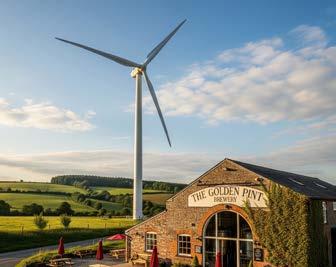
turning out 15,000 barrels a year, that adds up to around 825,000 kWh annually. That’s like leaving a light bulb on for four to five hours per pint - before the packaging and transportation has even begun! While that kind of usage would usually equate to tens of thousands of pounds in energy bills (not to mention tonnes of carbon), renewable energy offers a better alternative.
Whether self-generated on-site or sourced from the grid, solar panels and renewable supply tariffs offer breweries a straightforward way to cut carbon and costs. They reduce the strain of increased electrification, lowering operational costs – meanwhile the upfront costs of commercial solar installations are becoming more manageable for businesses thanks to UK grants and financing options. Record levels of efficiency and falling installation prices mean a well-designed solar array can pay for itself in as little as three years. What’s more, by fuelling everything you do on site, renewables don’t just make one part of your business greener. Rather, they make your entire operations more sustainable.
Renewable energy isn’t just an environmental win, it’s a fiscally responsible and highly rewarding move. Lower costs, more certainty: on-site solar secures a significant portion of your energy supply at zero marginal cost, minimising exposure to volatile prices.
Operational resilience: battery storage and smarter energy management help keep production running smoothly, even during price spikes. Brand advantage: stay ahead of consumer buying trends as distributors, pubs, and consumers increasingly opt for products with strong sustainability credentials.
Stronger supply chain relationships: many large buyers now prioritise suppliers with credible carbon reduction plans. Futureproofing the industry: climate change threatens essential crops such as barley and hops, so renewables inherently support the viability of your business on a wider scale too.
Turning sustainability into part of your brand story is also important. Customers
appreciate the stories behind the products they enjoy – the process, the people, and the values. Concrete, verifiable actions – like brewing with 100% renewable electricity, sourcing ingredients from local farms, or investing in solar panels that power your brewhouse – add depth and authenticity to your brand.
For example, organic craft beer brewer and fellow B Corp, Stroud Brewery, uses 100% renewably generated electricity including 25% generation from their rooftop solar. Even more impressively, their turnover has more than doubled, from £946k to over £2m in 2023. They attribute their success in large part to their sustainability credentials, which helped build customer loyalty and a strong brand reputation.
Unfortunately, not all “renewable” tariffs are as green as they sound. Many big suppliers still buy most of their power from fossil fuels, then use certificates called REGOs to re-badge it as 100% renewable. This system costs bill payers over £1bn a year, but does little to grow
new renewable generation or ensure the power you use is genuinely green. In fact, electricity sold to you as “renewable” could have been generated by gas or coal, and matched months later with a paper certificate from summer solar. So, while you might think you’re supporting renewables, you might just be paying
for clever accounting. We match your brewery’s power demand with renewable electricity from our network of over 3,000 independent UK generators, every half-hour of the day. This isn’t based on annual averages or broad claims – it’s near real-time matching. And, if there’s ever a shortfall, we balance it out over a 12-month period to make sure your supply stays genuinely 100% renewable.
For breweries, this means knowing that the electricity behind every pint you brew is backed directly by UK solar, wind, hydro and biogeneration. And, unlike other ‘renewable’ suppliers, we don’t rely on vague carbon offsets; our supply offers breweries a transparent supply chain you can proudly share with your customers. From flagship breweries with national distribution to smaller craft producers, renewable energy can be scaled to suit your site, capacity and budget. Done well, harnessing renewables generates measurable carbon savings, long-term cost benefits, and a genuine touchpoint for connection with more eco-conscious consumers.



































































Sustainability is a highly important issue for all commercial sectors at the moment, with breweries and hospitality businesses wanting to become more sustainable in their processes and operations. There are a number of technologies and processes that you may not be aware of or have concerns about implementing into your business operations. Although implementation can be daunting, these processes can help save your business money in operational costs whilst improving your environmental credentials and making your business more sustainable.
As brewery and hospitality facilities generate carbon in general operations, as well as other processes that generate emissions, making facilities more efficient and generating your own forms of heating and power are high priorities for many business owners.
These systems have become a lot more affordable as they see increased adoption and significant returns on investment within only a few years of installation. This combines the ability to save money on energy bills whilst also reducing your environmental impact, having a brand that actively seeks to promote environmental responsibility in a financially viable way. Many consumers are extremely conscious of who and what they buy from, and the processes of how
products are created. With Millennial and Gen Z consumers being significantly more likely to prioritise sustainability compared to other generations, often willing to pay more for sustainable products, there is a clear link between being more sustainable whilst also making financially smart decisions for your business.
Breweries have immense electrical running costs and are a commercial sector that will also often have a large amount of unused roofspace on the roofs of facilities and buildings. There are opportunities to make running operations more efficient, such as reducing wasted water, installing renewable energy systems, optimising logistical operations and sustainable sourcing of products and ingredients.
The possibilities are endless when looking to make your business more sustainable, it’s about striking the balance of solutions that suit you and ensuring that these are within your business plan.
As seen with our case study and work with Brother’s Drinks, which had a payback period of three years, solar panel PV installation is a fantastic way to reduce carbon emissions and save money on energy bills for the brewery & hospitality industries. This technology enables you to save money on your energy bills, reduce your environmental
impact, and enhance your green credentials.
During this project, environmental concerns were at the forefront of the decision to install solar PV, as well as a natural option when looking to repair the roof of their cider mill.
This became a dual project to ensure that roof repairs were sufficient with the overall lifetime of the solar panels, and also demonstrates where there is often a large amount of unused roofspace that can be used to generate your own clean electricity.
Breweries and businesses in the hospitality industry will typically have unused roofspace available, which is perfectly suited for solar PV panel installation. With a large amount of roofspace, you are able to install larger systems, which will increase the sustainability of your business whilst saving you money on energy bills and reducing your dependence on the national grid. This is one of the most costeffective and beneficial ways to reduce your environmental impact.
As solar electricity is generated from the sun and the only byproduct of the process is heat, it’s one of the most, if not the cleanest, sources of electricity on the planet. As well as solar panels, other renewable technologies that you can consider are as follows:
Renewable heating has become more and more popular with options such as ground source heat pumps and
air source heat pumps. These use geothermal heat from the ground or heat from the air to heat central heating systems.
Large-scale systems can be used for heating vats for breweries as well as for general heating requirements. This is another way to reduce your environmental impact whilst also providing a financial incentive for your business and an increase in your bottom line. Correct insulation within buildings and breweries is also highly important to increase energy efficiency and reduce your environmental impact.
For breweries, you can also achieve better temperature control, smoother processes, and better quality control of beer flavouring. Insulation of pipes also protects staff from burns and provides acoustic insulation for the facility. You should consider upgrading the insulation for kettles, mash tuns, bottling and canning machines, pipes, pumps and then general heating systems. For hospitality businesses, you will want to carry out a review of your current insulation and see if this is up to standard and as efficient as possible. Typical insulation would include external wall insulation (EWI), loft insulation where relevant and then other forms of insulation that are used for domestic or commercial properties. You are unlikely to have specialist equipment onsite that requires a particular review of its insulation.
The common figure that is cited is that it takes, on average, around 4-7 gallons of water per 1 gallon of beer produced. With efficient water management, smart businesses are achieving 3:1 or less, which is better for the environment and also saves on the cost of water waste. With water shortages becoming a more and more prevalent issue in the UK, water management is extremely important for your environmental credentials. To achieve these savings, consider investing in water recapture systems. These effectively catch water from cleaning cycles and cooling processes to be treated and reused in the brewing process. Smart meters are not
automatically installed in the facility, and they can provide information with realtime analytics to ensure efficient water distribution and warnings should leakage occur.
The logistics process is a large area that can be reviewed to run a more sustainable business. Route optimisation technology isn’t just used by massive logistical companies any more; it can be used to reduce route times for deliveries or other operations by up to 30% on mileage. Businesses are also considering upgrading their fleet to electric vehicles (which can also be combined with solar carports and charging facilities on your premises.
For beer production, kitchens and choice of suppliers, sustainably and ethically sourced products are an extremely hot topic at the moment. The concept of farm to table and UK-sourced ingredients are a strong, unique selling point for many consumers, and this reduces air miles and carbon impact from choosing local ingredients and products compared to those shipped in from abroad.
For many organisations, the biggest obstacle to solar and renewable energy adoption is the initial investment. However, there are funding mechanisms such as Solar as a Service that help to remove this barrier, turning capital expenditure into a manageable operational cost – helping you reduce emissions, lower energy bills, and achieve ESG goals with no upfront cost. Instead of purchasing clean energy technology such as solar PV system, solar carport or battery storage solution outright, you simply pay a predictable monthly fee – transforming what would have been a large capital expense into a manageable operational cost. This allows your business to start saving immediately and benefit from renewable energy without the financial burden or complexity of system ownership.
The breweries and hospitality industries are industries that generate a significant amount of carbon emissions and material
waste. Implementing changes to make your business more environmentally sustainable isn’t just good for the planet; you can make smart decisions to massively increase your efficiency whilst increasing revenue and your bottom line. This is a core synergy when looking to make large-scale changes to your operations, and a careful, measured approach is the best way to ensure that you are increasing sustainability whilst making financially beneficial decisions and not rocking the boat when making sweeping changes. The bes t approach is to create a clear action plan of the most beneficial measures, and then implement these with a timescale that suits your business.
As breweries produce carbon, generating your own forms of heating and power are high priorities for many business owners,” SolarSense
The market for non-alcoholic beer is growing rapidly worldwide. The main factors driving this trend are lifestyle changes, increased health consciousness and the rising popularity of “mindful drinking”. In response, more and more breweries are expanding their portfolios to include nonalcoholic options.
There are a number of methods for producing non-alcoholic beer, which essentially fall into two categories: either the beer is prevented from producing alcohol in the first place or alcohol is removed from finished beer after fermentation. Each approach entails different processes. Breweries opting to remove alcohol from beer postfermentation must first invest in new, specialised dealcoholisation equipment. The established methods in this category are thermal processes (distillation) and membrane separation. By contrast, methods that prevent alcohol from being produced in the first place are relatively easy to implement. Fermentation is interrupted before the beer reaches more than 0.5% alcohol by volume.
For some time now, a special group of yeasts known as crabtree-negative has been gaining in popularity. Just like traditional brewers’ yeasts, they metabolise the sugars contained in the wort into alcohol - but only in an anaerobic environment. Unlike their traditional counterparts, once oxygen comes into play (in other words, in an aerobic environment), they stop producing alcohol. They continue to generate aroma compounds, but no alcohol. The aroma compounds mask the wort flavours that are often typical
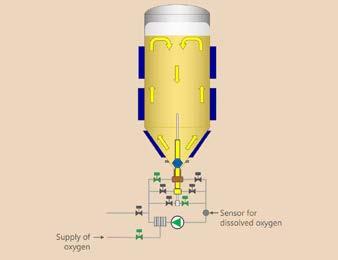
of non-alcoholic beers, to the extent that consumers no longer notice them. Thus, when an aerobic environment is maintained throughout fermentation, beers with 0.0% alcohol by volume (ABV) can be produced.
This is where Steinecker’s Poseidon recirculation unit comes into play. With it, various circulation zones and flows can be established within the tank. The result is an even, efficient fermentation process that, in turn, is the key to producing high quality beer.
In order to use its Poseidon recirculation unit with crabtree-negative yeasts, Steinecker developed a variant featuring an integrated aeration system and oxygen sensor. The recirculation keeps the yeast in a more homogeneous suspension in the beer, which in turn improves flavour development and speeds maturation. Even more important
Above: With Poseidon, you can set different mixing zones and circulation directions in the tank. The circulation unit is now also available with integrated aeration and oxygen sensor.
though, is its use for aerating the tank: During the maturation process, Poseidon recirculates the wort continuously and maintains a consistent oxygen content of between 1.0 and 1.5 parts per million (ppm). To develop the desired aroma profile, it is important that a high temperature be maintained for as long as possible - all the while in an aerobic environment. In trials conducted in the Steinecker Technology Centre in collaboration with Novenesis, a producer of crabtree-negative NEER yeasts, these conditions could be maintained for well over 20 hours using Poseidon. In the end, these tests produced fully flavoured beer containing 0% alcohol in just two days.


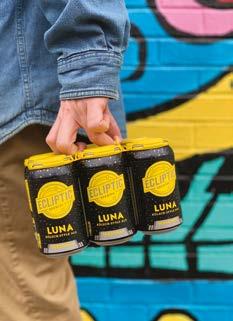

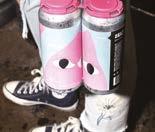
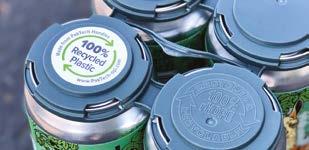

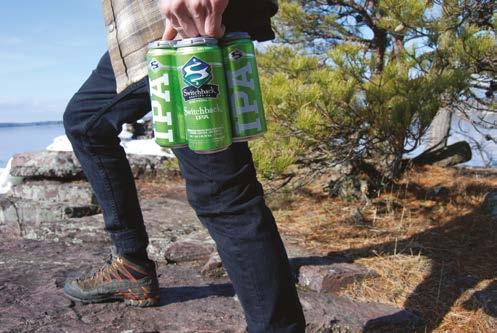
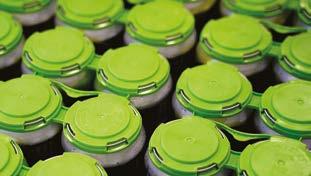
LOST AND GROUNDED BREWERS, THE AWARDWINNING BRISTOL-BASED BREWERY, WILL CELEBRATE THEIR 10TH ANNIVERSARY NEXT YEAR. ESTABLISHED BY ALEX (ALEJANDRO) TRONCOSO AND HIS PARTNER ANNIE CLEMENTS, THEY’VE MADE A WEALTH OF REVERED AND REGARDED BEERS AND INSPIRED COUNTLESS PEERS IN THE WORLD OF LAGER BREWING.
WHILE BRISTOL IS NOW HOME, THE DUO TRAVELLED FARAND-WIDE TO ARRIVE AT THIS POINT. HERE ALEX SHARES HIS EARLY BREWING JOURNEY AND HOW IT HELPED INFLUENCE THE BREWERY HE AND ANNIE RUN TODAY.
I’ve been a professional brewer for over 20 years, and I’m often known as “the guy from Little Creatures” or “the old Camden Head Brewer” or the co-founder of Lost and Grounded Brewers in Bristol. However, there is much more to my brewing story, one that would start in Brisbane, Australia in the early 1990s.
I am originally from the US, but I went to high school in Brisbane. Back in 1992 there tended to be only one beer in pubs, or maybe two or three if you were lucky enough to stumble upon a pub with some diversity.
I have fond memories of drinking beer at the RE Hotel in Toowong, Brisbane with my school friends; frequenting the pub were a mix of locals, University of Queensland students, and of course those who were 18 but still in high school (or at least looked 18 as ID checks weren’t so much of a thing then).
On draught there was Castlemaine XXXX Bitter, erm, a lager, Coopers Sparkling Ale, very rare as is from South Aus, and Tooheys Old, a dark ale, which was equally as rare as it is a beer from NSW (beer in Australia was very territorial when I was finding my way).
The normal order of the day was a jug of XXXX, with the brewery just being up the road, but I found myself drinking Coopers and Tooheys Old regularly and began to wonder what more there was to beer. Maybe it was the mammoth XXXX logo on the façade of the enormous brewery illuminating the skyline of inner-city Brisbane that had me in a trance, but I decided that I wanted to become a brewer.
After completing high school, I returned to the US to do a degree in Chemical and Petroleum Refining Engineering at the Colorado School of Mines. As an 18 year old who was suddenly in a country where I couldn’t buy beer, I would find myself at a loss of how to conquer this predicament. With the gigantic Coors brewery just up the road – I believe what was then the largest brewery on the planet – I couldn’t ignore that I still had the brewing bug.
So, I went and bought a book on homebrewing, and would create my first beer in June 1993, an English bitter using malt
I believe education is really important as it gives you future options,”
Alex Troncoso, Lost and Grounded Brewers.

extract, a bit of pre-milled crystal malt, some T100 Fuggles hop plugs and dried yeast. I can’t say the beer was particularly good, however the alcohol did the job, and I was hooked on brewing. I would go on to doing many batches during my years at university, eventually ending with full mashes in the garage of my share house.
In the summer of 1995, I was lucky enough to secure a season of work experience at Carlton and United Breweries in Sydney
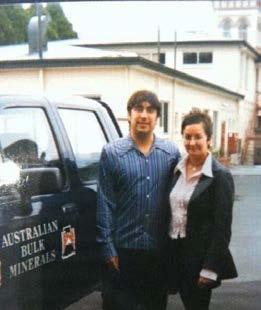
Alex Troncoso and Annie Clements, Lost and Grounded Brewers
(now closed) via an intro from a family friend, so I headed off back to Australia for a few months. I was blown away by the scale of the operation, and from that point I knew brewing was the career for me.
I met Brad Rogers (co-founder of Stone and Wood) during my short stint as he was a young brewer for CUB, and we’ve kept in touch ever since. Soon I was to learn that Chuck Hahn, a big name in Australian brewing, was actually from the US and went to the Colorado School of Mines.
I would later find out that Eric Toft, the renowned brewmaster from Private Landbrauerei Schonram (my favourite lagers ever!) is also an alumni, so I figured brewing was a definite option for me. I returned to the US after those few months and landed a part-time job at Irons Brewery in Denver (also long closed) as a cellar hand which would fuel my thirst for knowledge. I graduated with my degree in 1996, moved to Tasmania, and of course got a job in an iron ore mine!
I met my partner Annie Clements (also co-founder of Lost and Grounded) in October 1997 and we would go on to live all around Australia, as well as Belgium. We eventually ended up here in the UK.
I had given up homebrewing when I returned to Australia, and hoped to get a job in brewing, but unfortunately back then it was a very niche industry, with few openings as most people who entered the industry didn’t leave. I ended up in a sevenyear struggle trying to find a job in the industry I loved, only to receive rejection after rejection - probably about 40 all up!
It was an old friend, Doug Donelan, who was to tell me it took him 10 years to get a job in brewing - he worked for Chuck
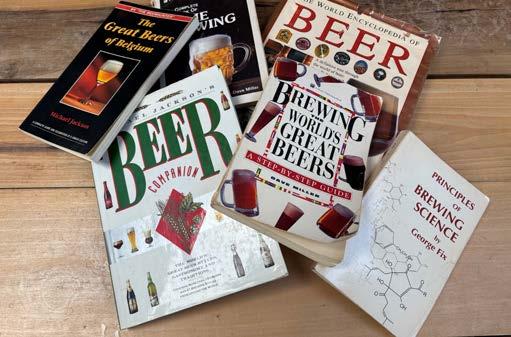
Hahn, then Lion, and eventually was CEO of NZ Hops before he retired – and that I just needed to keep trying.
In 1999 Annie encouraged me to get back into homebrewing and join a local club in the western suburbs of Melbourne, The Westgate Brewers. The club embraced me with open arms, and I found a group of like-minded beer enthusiasts.
I would go onto brewing two-three times per month (full mash) in our house in Melbourne and enrolled in a Graduate Certificate of Brewing at the University of Ballarat, all the while continuing as a process engineer.
I entered many homebrew competitions, often just sticking with my American Pale Ale recipe with which I won successive “Wort Hogs Pale Ale Mania” trophies (another local Melbourne club’s annual comp). Eventually I would be given some help to enter the industry by someone who is now an old friend (Dave Edney, a legend who worked at a lot of early Australian craft breweries) and would get a job at a brewery in Melbourne.
From there Annie and I made a bold decision to leave Melbourne for me to join Little Creatures as a shift brewer, after which we had a (very short) sojourn in Belgium where I worked for InBev, and then returned to Little Creatures as Head of Brewing.
After Little Creatures was purchased by Lion we made another huge move to London for me to become Brewing and Development Director at Camden Town Brewery, and in 2015
we embarked on forming Lost and Grounded Brewers. I believe education is really important as it gives you future options. During my early years at Little Creatures I also completed the CIBD Diploma in Brewing, and later a Masters Degree in Business (MBA).
There is always something to learn, and the MBA helped me appreciate what I was experiencing at Little Creatures at the time, and subsequently would feed into our thinking, values and culture at Lost and Grounded.
There’s been a lot of hard work, tears and stress along the way, but equally a lot of joy. I look back at all of the effort and moves that it took to get us to where we are now, and it’s kind of surreal. My advice for those who may be reading this who are trying to break into the industry is to prove yourself – study brewing, get a part-time job in a brewery, enrol in a cicerone class – just do something that shows you really want it.
But most important for me when surrounded daily by our beautiful brewery here in Bristol, is to remember that you can make beer like we do, you can make beer in a small cask ale brewery, or you can make beer in your kitchen. In all scenarios it is still beer, and it all can be beautiful.
Overleaf you’ll find an adaptation of Alex’s old American Pale Ale recipe that he used to brew nearly weekly in the early 2000s.

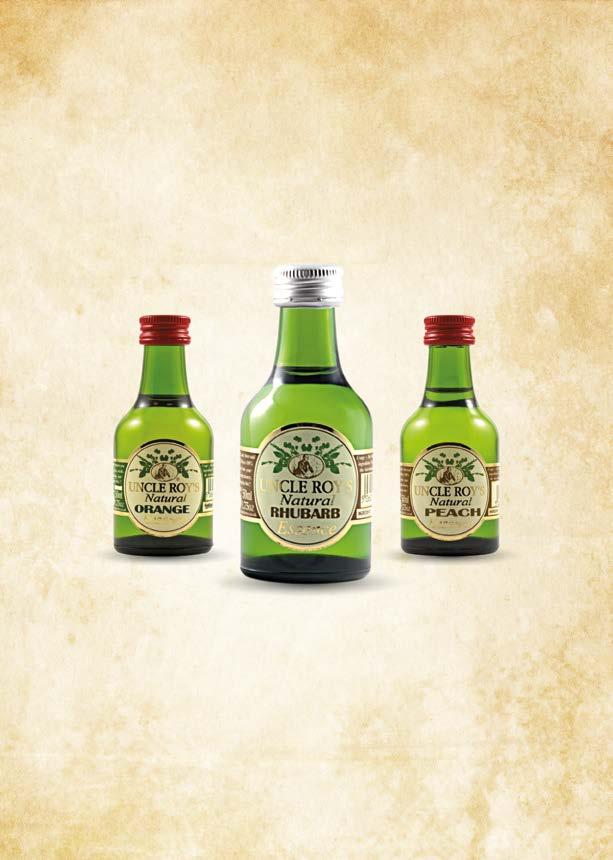
With over 140 fantastic flavours, Uncle Roy’s is the natural choice for craft drinks brands. All our flavours are available to trade customers of all sizes with no minimum or maximum order amount. Try Uncle Roy’s Natural Food Essences today and

AN OLD FAVOURITE OF ALEX’S, THIS AMERICAN PALE ALE WAS A MAINSTAY OF HIS AT THE TURN OF THE MILLENIUM. HERE’S HOW YOU CAN MAKE IT.
This is an adaptation of my very old American Pale Ale recipe that I used to brew nearly weekly in the early 2000s. I like to keep things really simple in terms of grist and hops and figure things can be complicated later when the basics have been conquered. The malt quantities are what I would typically use on a homebrew scale for the efficiency I achieved (approx. 80%), so adjust as needed for your system.
Final volume: 19L finished beer (one neat little Cornelius keg)
Cold wort volume: 25L
Target OG: 12.4 oP / 1.050
Target FG: 2.5 oP / 1.010
ABV: 5.2%
Colour: 16 oEBC
Bitterness: 38 IBU
Carbonation: as you see fit
Pilsner malt – 4.9kg
Biscuit malt – 0.250kg
120 oEBC Crystal malt – 0.100kg
Mash at 3L/kg to achieve a mash temperature of 65-67degC. Rest for 60min and check for starch conversion. Lauter and sparge as per your standard method to achieve a pre-boil volume of approx. 30L.
Boil for 75min with hop additions at 0min, 60min and 75min. Bittering hops – 0min addition – approx. 20IBU - use Brewers Gold, Magnum or other fairly neutral bittering hop. In my old recipes as it was in Australia I used Pride of Ringwood. Note that there weren’t many hops available back then to homebrewers!
Flavour hops – 60min addition – approx. 10IBU – I like a classic blend of things like Cascade, Chinook, Centennial, etc, or maybe Citra which I didn’t have access to back in the early 2000s.
Finishing hops – 75min addition – approx. 8IBU – once again use a classic blend as you prefer, similar to the above, or mix it up with some Citra, Simcoe, Idaho-7 or similar. Chill as cold as you can get it (ideally less than 20C) and pitch with clean American ale strain such as US01, WLP001 or similar.
Ferment for around a week, keeping temperature at around 22C. After fermentationrack to new vessel and dry- hop if you want to adjust the hoppiness. When I used to brew this recipe beers weren’t as hoppy, so our palates have shifted – you may want to add a touch. Chill racking tank if you are able and hold for a week. After settled rack into a clean and sterilised Cornelius keg and force carbonate. Alternatively bottle, adding priming sugar to either the batch or each bottle.

www.enterprisetondelli.co.uk
info@enterprisetondelli.co.uk

www.nchfittings.co.uk sales@nchfittings.co.uk

www.AngliaDecor.co.uk 01245961933

Konvoy is the leading global IoT (Internet of Things) keg tracking & pooling solution. Founded in Australia 2019, and the UK in 2022, Konvoy are revolutionising the beverage industry with edge asset tracking technology and simplifying the pay-per-fill pooled keg rental business model. Konvoy is moving beverages forward by enabling greater efficiency, effectiveness, quality, circularity and sustainability from producer to venue and back again.
www.konvoykegs.com
konvoy@konvoykegs.co.uk 0800 4681468
WILLIS EUROPEAN LTD
WOLVERHAMPTON, UK 01902 798880
INFO@WILLISEUROPEAN.COM
WWW.WILLISEUROPEAN.COM

Gravity Systems was formed to meet the growing demand in the craft beer market for a single source for all brewhouse, fermentation Service generation and distribution www.gravity-systems.co.uk
+44 (0)1733 834264 www.enquiries@gravity-systems.co.uk


WILLIS EUROPEAN LTD
WOLVERHAMPTON, UK 01902 798880
INFO@WILLISEUROPEAN.COM
WWW.WILLISEUROPEAN.COM
Brewing, bottling, canning or kegging. Whether you are an existing brewery or starting your own brand, Hambleton Contract Brew Co. has the perfect contract solution for you. YOUR BEER, OUR EXPERTISE
ben@hambletonbrewery.co.uk 01765 640 108

charlesfaram.com/uk
+44 (0)1905 830 734 sales@charlesfaram.co.uk

PakTech designs and manufactures 100% recycled, recyclable and reusable packaging handles. PakTech is the smart and sustainable packaging solution. www.paktech-opi.com handlesales@paktech-opi.com Phone: +1.541.461.5000


Fermentis is an expert in the art of fermentation. Our active dry yeasts and yeast derivatives cover almost all professional requirements: from safeguarding production to expressing sensory characteristics. Discover our products on www.fermentis.com Contact us at fermentis@lesaffre.com
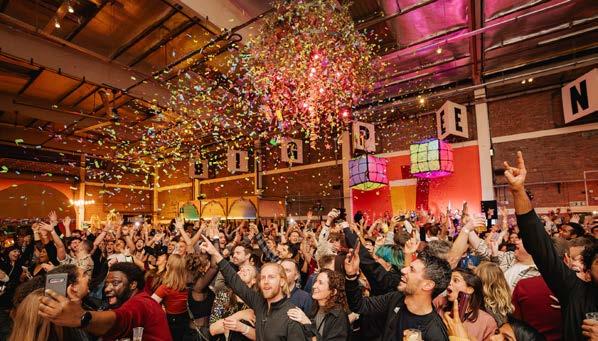
On 30th September and 1st October 2025 The Brewers Congress and Brewers Choice Awards take place at The Big Penny Social in London. We hope to see you there!
16 September 2025 - 17 September 2025
DUBLIN BEER FESTIVAL
The RDS, Dublin www.dublinbeerfest.ie
24 September 2025 - 27th September 2025
ST ALBANS BEER AND CIDER FESTIVAL
The Alban Arena, St Albans www.stalbansbf.org.uk
30 September 2025 - 1 October 2025
BREWERS CONGRESS 2025
The Big Penny Social, London www.brewersjournal.info/congress
23 October 2025 - 25th October 2025
SWINDON BEER FESTIVAL
Steam Museum, Swindon www.facebook.com/swindonbeerfestival
23 October 2025 - 25th October 2025
CARLISLE BEER AND CIDER FESTIVAL
Station Hotel, Carlisle www.solway.camra.org.uk
26 November 2025 BREWERS LECTURES BIRMINGHAM
The Indian Brewery, Birmingham www.brewersjournal.info/lectures
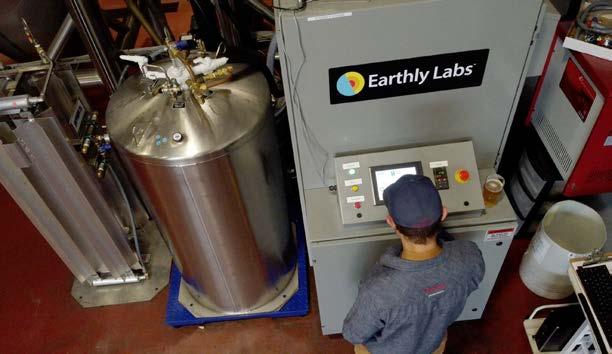
Proven technology – 140+ Earthly Labs systems globally
Reduce total CO2 usage and costs from Day 1
Protect against CO2 shortages & supply chain volatility
Reduce direct and indirect CO2 and VOC emissions
Offset cost against monthly CO2 spend with financing options from Chart Join us for a must see session for forward thinking brewers.

Presentation: CO2 Recovery for Independent Breweries
Presenter: Adam Keenan, Product Sales Manager, Earthly Labs
Date & Time: September 30th, 12:30pm Visit us at stand 501 at The Brewers Congress to learn more!
